News Archive - 2011-10 (October 2011)
2011-10-01 UPDATED w Pixs & Video: The Arab Spring Comes to Los Angeles! #OccupyLA
Thousands of people marched from Pershing Sq to the Los Angeles City Hall this afternoon. The shear numbers have forced the LAPD to backoff of their hardline attitude and allow us to occupy both the lawn and the sidewalk on all sides of city hall. Even the march was made without a city permit, the police stopped traffic so that the march could move efficiently through the downtown city streets. At the General Assembly last night the decision had been made to march down Broadway, normally filled with shoppers on a Saturday, rather than the normally empty financial district. The reception of the shoppers on Broadway was fantastic and the honking of passing cars has never stopped since we arrive at city hall hours ago.
Since the marchers arrived at city hall, it has been one grand celebration. Many more have joined their ranks. Vietnam veteran Ron Kovic spoke and so did Marcy Winograd and many others. Dozens of pizzas where delivered and passed around as many ate their first meal of the occupation. Water was declared the official soft drink of the revolution. Anons in Guy Fawkes masks carried a sign with saying “No Wat but Class War.” Now folks are gathering on the South lawn listening to poetry readings as a trumpet plays softly in the background. Soon they will be having the first General Assembly.
The city council is now said to be “99%” in support of Occupy Los Angeles but it remains to be seen how the LAPD responses after scheduled activities end at 10:30pm and people begin to bed down because nothing has been set for sleeping arrangements.
So stay tuned for updates.
Saturday morning, people gather in Pershing Sq.
It took more than seven minutes for marchers to leave Pershing Sq.
Occupy LA - day 1, marchers arrive at City Hall
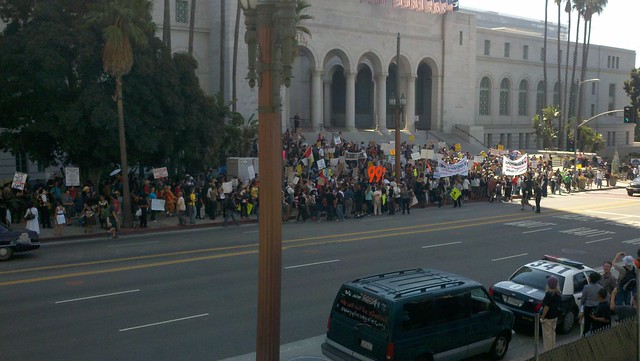
Occupy Los Angeles, day 1 South Lawn of City Hall
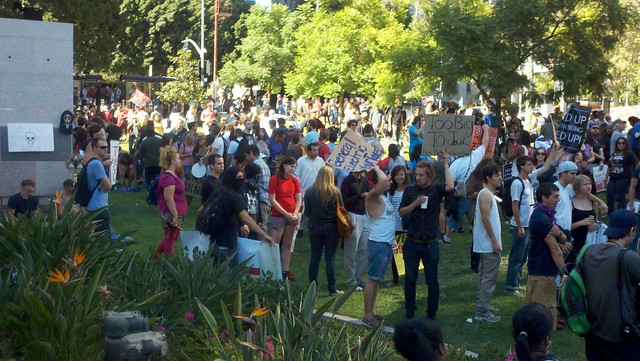
Sitting on the South Lawn
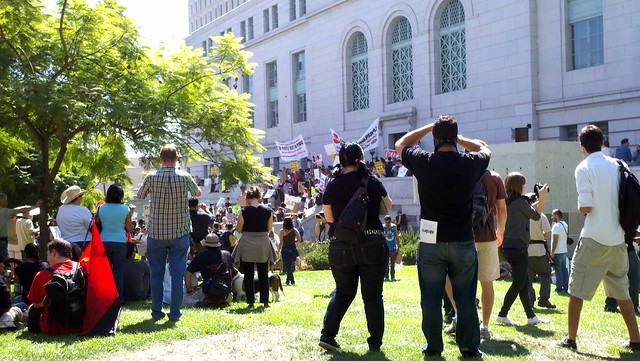
Occupy Los Angeles, day 1 North Lawn of City Hall
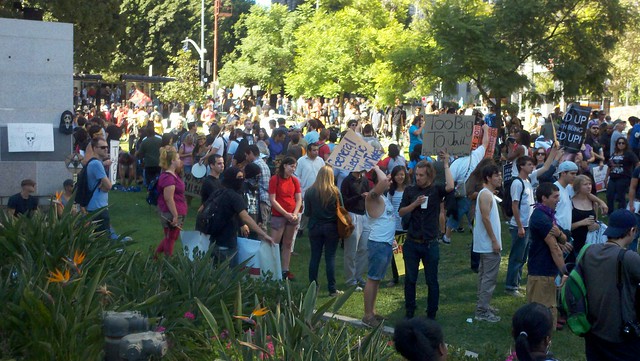
Occupy Los Angeles, day 1 Poetry Reading
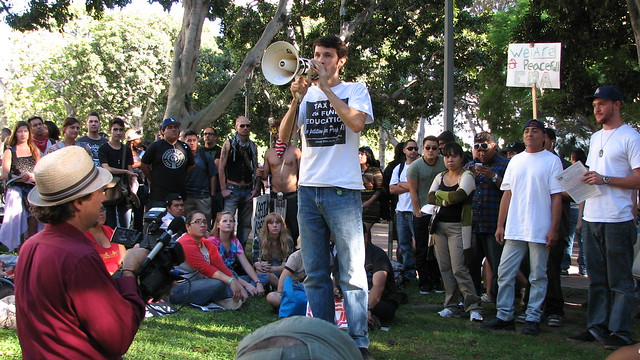
Occupy Los Angeles @ City Hall
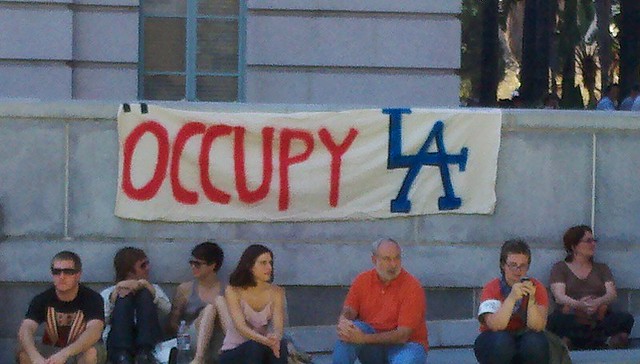
Anonymous @ Occupy LA
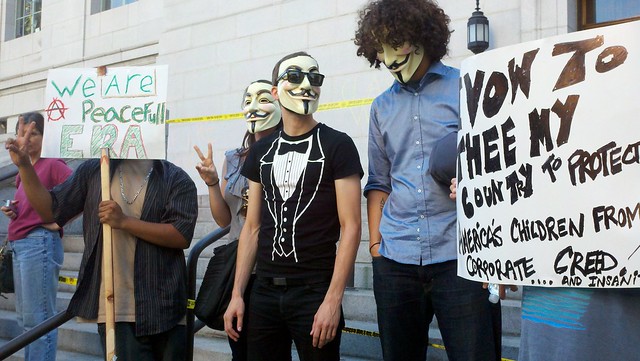
Piggie speaks at Occupy Los Angeles
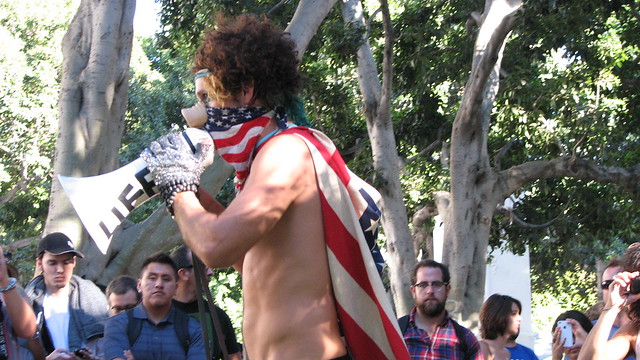
Night falls on Day One of Occupy LA
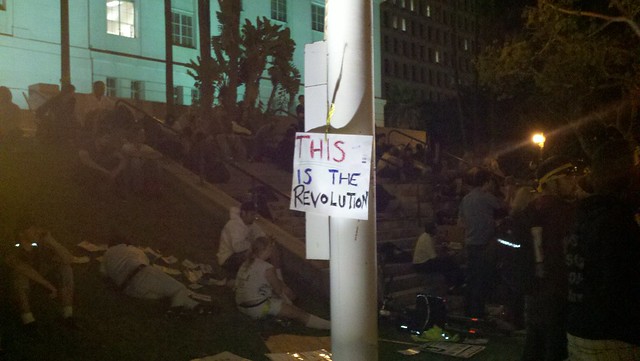
2011-10-02 #OccupyLA - Day 2
328 people spent their first night camped out at Los Angeles City Hall last night. At the General Assembly on Saturday evening there was a long discussion, that got quite heated at times, about whether to camp out on the grass or to move to the sidewalk as requested, under threat of arrest by the police. In the end almost everyone moved to the sidewalk last night but they are back in the City Hall park today.
In the end, the threatened police crackdown never materialized. As it turned out, the LAPD had bigger fish to fry. The entire department was put on a citywide tactical alert Saturday night but that had nothing to do with Occupy Los Angeles. Two undercover narcotics cops got shot in a drug deal gone bad in Korea Town. As of this afternoon, the suspects were still at large so the police presence at city hall has been relatively light.
Actually so far, the LAPD has been very accommodating to the march. Although they had no permit for the march Saturday and they marched on the sidewalk, the police stopped traffic at every intersection so that the eight minute procession could be out of everyone's way as much as possible. They could have made them bunch up at every red light and written tickets for anyone that missed the cue. A single police car was posted on the street across from the protest all day Sunday but apart from the fact that it happened to be parked in front of the LAPD headquarters, which is also across the street from the city hall, there wasn't much of a police presence. No cops were even seen to be patrolling the grounds surrounding city hall. Those familiar with the LAPD's response to mass protests in the past knows that this has not always been the case.
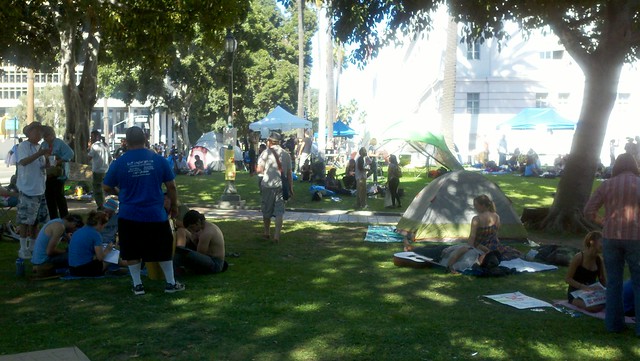
Sunday was a most pleasant day at Los Angeles City Hall. Sunny and in the mid 70's with a slight breeze. There was coffee in the morning and various kinds of food all day. Either in the morning or sometimes doing the night, everyone who had pitched tents, moved then from the sidewalk back to the grassy part.
There are many committees, too many to name in a short article, and there were meetings all day preparing for the General Assembly in the evening. There was food preparation and distribution, others distributed water, making sure dehydration wasn't a problem in the sun, although most people stayed under the ample shade of the trees there. In the morning someone gave CPR training, complete with dummies and certification. There were generators brought in for power Sunday and the media team kept the live streaming webcam going all day. Internet access was also better today.
 The porta potties were the best ever seen at a protest, not the usual plastic blue jobs that reek of chemicals and what they are trying to disguise. These were the type used on film sets with light, air, soap, regular toilets, wash basins and art work on the walls. One protester was heard to remark "We may sleep like we're on skidrow but we pee like we're in Beverly Hills."
The porta potties were the best ever seen at a protest, not the usual plastic blue jobs that reek of chemicals and what they are trying to disguise. These were the type used on film sets with light, air, soap, regular toilets, wash basins and art work on the walls. One protester was heard to remark "We may sleep like we're on skidrow but we pee like we're in Beverly Hills."
An information and welcome tent was setup for the constant stream of newcomers that came to visit or stay. A lost and found was established and a place around the block made its restrooms available to the protesters 24/7. People came from as far way as Ojia and Orange County. In the space of 48 hours a new Los Angeles community was taking shape in the park surrounding city hall.
Unlike Occupy Wall St. or most of the occupy everywhere movements, the one in Los Angeles got major TV coverage on the first day, KABC came out late Sunday night and interviewed some of the people camping out. They ran those with the morning news cycle. This and other reports assured them of many new vistors.
Once again the Los Angeles movement showed its superb sense of timing. The major US media had boycotted Occupy Wall St. for two weeks already and was nearing the limit of that tactic. The bust of 700 on the Brooklyn bridge Saturday gave them the kind of story they could run with but that also meant they could not avoid covering the local protest also. These events cause this writer to tweet "#OccupyLA 1st day & night, no arrests. Did #OccupyWallSt go a bridge too far?"
In the morning a group from OccupyLA noticed a parade or march nearby and went to investigate. They found it was a group doing some good works but sponsored by Bank of Amerca. When this procession arrive at its rally point, the OccupyLA group started leading anti BoA chants and most of the neighborhood people BoA was sponsoring joined in on. That was not a schedule action.
Occupy Metro, on the other hand, was a scheduled action in which a lot of protesters rode the metro from city hall and back, all the while agitating for OccupyLA and Occupy Wall St. The transit cops also seemed to be sympathetic and helpful. Many of the protesters told them they were part of the 99% and should be in the park with them.
Others, however didn't agree. They saw all police, even all transit cops as simply agents of the capitalist state without a dual character, i.e., without a human side, without an identity as workers. They had sharp difference with those that thanked the transit cops for their consideration.
They also objected to the security team's strong suggests the night before that all those staying the night move to the sidewalk to avoid the arrests the LAPD had promised for those insisting on sleeping on the grass.
This is a relatively small group of less than a hundred young people in their twenties, many with a preference for dark clothes and faces hidden behind bandannas that see the need for a conflict with the police. They also insist upon their individual right to take whatever actions they think appropriate, either legal or illegal, regardless of whether it is sanctioned by the larger group.
They have been allied by some members of a much more sophisticated left group that have not been a part of the creation of OccupyLA but now want "in" to what is probably the most important movement in the past decades in Los Angeles. They see a way to build a following by appealing the the "militancy" of these youth.
All day the coalition met, first one place, then another. First in the "facilitation committee", then as the self-created "police abuse or brutality committee" to discuss their grievances with the police, the security committee and the larger group as a whole. They accused the security committee of acting like police and taking orders from the police. They were of a mind to disband the security committee and make security the task of everyone.
Although they generally expressed a freedom to ignore group decisions even if arrived at democratically, they felt that the group process had been very undemocratic and had many suggests on how to fix that, such as having breakout sessions before votes on most questions.
When one veteran activist, who was a named plaintiff in the 1984 ACLU/LAPD police spying case and spent his first months in jail for anti-war protests more than four decades ago, joined one of these discussions, he was told by a member of the "left" group that this wasn't a discussion for those that loved the police. This same activist was told the by his "stack keeper" that the facilitators "probably wouldn't let him speak" the second time he asked to be listed to comment at the evening General Assembly even though his first comments to the GA were met with strong applause. There were many other problems with the way this meeting was conducted.
So Sunday with the bright Los Angeles sun beaming down on them, some dark clouds also formed over occupy LA. Some of those that had provided the most leadership to this "leaderless" group and done the most in the last week to make this thing happen weren't at or active in this meeting, possibly because of other obligations or perhaps shear exhaustion.
Others, with an agenda that may not even be clear to themselves have stepped to the fore and are attempting to utilized the leaderless nature of this movement to enforce there own. They would like to see a confrontation with the police even though the police have been on their best behavior and they hold in their hands the power to destroy Occupy Los Angeles.
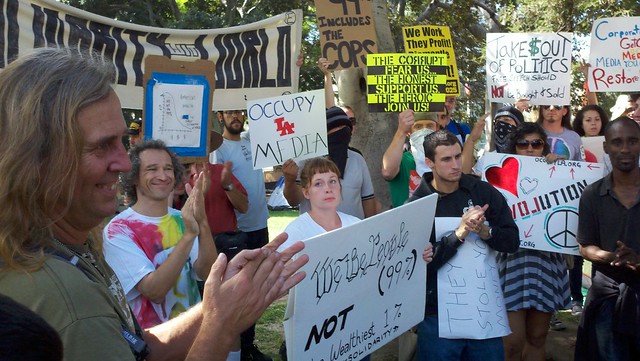
2011-10-02 After high-profile killings, secret U.S. assassination squad emerges from the shadows
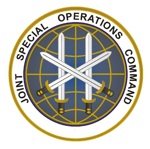 Based in Fayetteville, North Carolina, Joint Special Operations Command (JSOC) is America’s secret army. Members of this clandestine team have recently made news for assassinating alleged al Qaeda operatives Osama bin Laden and Anwar al-Awlaki; reportedly, they were also responsible for the killings of hundreds of civilians in the 2002 "wedding party" incident in Afghanistan.
Based in Fayetteville, North Carolina, Joint Special Operations Command (JSOC) is America’s secret army. Members of this clandestine team have recently made news for assassinating alleged al Qaeda operatives Osama bin Laden and Anwar al-Awlaki; reportedly, they were also responsible for the killings of hundreds of civilians in the 2002 "wedding party" incident in Afghanistan.
In 2009 the investigative reporter Seymour Hersh spoke publicly about this elite military agency. Hersh stated:
"After 9/11 ... the Central Intelligence Agency was very deeply involved in domestic activities against people they thought to be enemies of the state. Without any legal authority for it ... the Joint Special Operations Command -- JSOC it’s called. ... They do not report to anybody, except in the Bush-Cheney days, they reported directly to the Cheney office. ... Congress has no oversight of it. It’s an executive assassination ring essentially ... Under President Bush’s authority, they’ve been going into countries ... and finding people on a list and executing them and leaving. That’s been going on, in the name of all of us. ...
"It’s complicated because the guys doing it are not murderers, and yet they are committing what we would normally call murder. ... In many cases, they were the best and the brightest ... Really fine guys that went in to do the kind of necessary jobs that they think you need to do to protect America. And then they find themselves torturing people. I’ve had people say to me -- five years ago, I had one say: 'What do you call it when you interrogate somebody and you leave them bleeding and they don’t get any medical committee and two days later he dies. Is that murder?'"
Although the organization has only existed for a few decades, the Washington Post recently reported that, since the 2001 terrorist attacks, JSOC has killed more people and interrogated 10 times more detainees than the CIA. JSOC controls its own prisons in the Middle East; it also has its own drones, satellites, and intelligence division, and engages in psychological operations (PSYOP). With roughly 25,000 operatives, it's larger than the CIA, and takes its orders from a higher authority. Not only does the U.S. President provide JSOC with a "kill list," but he even allows JSOC to select its own targets for assassination. According to published reports, JSOC has received approval to conduct missions in more than a dozen countries.
JSOC prides itself on its secrecy. Its officers often do not wear uniforms, and in combat do not carry identifying information. As one operative boasted: “We’re the dark matter. We’re the force that orders the universe but can’t be seen.” Some aver that the Bush and Obama administrations have deliberately kept JSOC's missions secret from Congress and the public by using the Constitution's grant of presidential military authority in order to overlap military and intelligence operations. Admiral William "Fox" Fallon headed U.S. Central Command until several years ago, when he resigned under pressure. Said his colleague retired Marine General John J. (Jack) Sheehan, “When Fallon tried to make sense of all the overt and covert activity conducted by the military in his area of responsibility, a small group in the White House leadership shut him out ... Fox said that there’s a lot of strange stuff going on in Special Ops, and I told him he had to figure out what they were really doing.”
Since then, recent killings of high-profile targets have brought the secretive agency into the public eye. After tracking events at Osama bin Laden's compound in Afghanistan for five years, in May JSOC officers assassinated bin Laden at his Abottabad camp. This week JSOC again made news, this time for killing Anwar al-Awlaki and Samir Khan, two United States citizens in Yemen who had allegedly "inspired" attacks against the U.S. JSOC forces tracked the Americans for weeks, and on Friday launched airstrikes with armed drones, killing at least four people. In 2010 President Obama had approved the assassination of Awlaki, who reportedly is not the only U.S. citizen to appear on Obama's kill list.
This week's assassinations, however, sparked protest from some civil libertarians and legal scholars, in part because the U.S. had neither declared war on Yemen nor charged Awlaki with any crime. A U.S. citizen, the Yemeni-American cleric distributed English-language sermons via YouTube that called for jihad against the country of his birth. Though they have not publicly presented any supporting evidence in court, U.S. intelligence officials allege that Awlaki recruited for al Qaeda and inspired the individuals who carried out the Times Square bombing, the 2009 attempted Christmas Day bombing, and the shootings at Fort Hood. Some, however, say that the cleric's actual influence has been overstated.
Others note that the Fifth Amendment to the U.S. Constitution prohibits political assassination as a deprivation of life without due legal process. According to Jameel Jaffer at the American Civil Liberties Union, JSOC's "targeted killing program violates both U.S. and international law ... this is a program under which American citizens far from any battlefield can be executed by their own government without judicial process, and on the basis of standards and evidence that are kept secret not just from the public but from the courts ... It is a mistake to invest the President ... with the unreviewable power to kill any American whom he deems to present a threat to the country." Constitutional blogger Glenn Greenwald criticized the President for acting as "judge, jury, and executioner." Last summer, Awlaki’s father filed a lawsuit in an attempt to prevent the Obama administration from killing his son without criminal charges or a court trial. While expressing some qualms about its decision, in December the government dismissed the suit, partly on the grounds that the court lacked authority to review the President's military decisions.
JSOC operatives have earned a reputation for being "the most dangerous people on planet earth." Its officers sometimes conducted 300 raids monthly in the Iraq war, and made as many as 1,000 kills in a year. During a 2001 fight, JSOC killed so many opposition forces that "truckloads" of bodies of enemy fighters were carted away afterward. In July 2002, reports surfaced that several hundred civilians, including members of a wedding party, were killed during a JSOC attack on the Taliban. It was reported that some members of JSOC were physically assaulting prisoners, starving and torturing them, and hiding them in secret facilities, as well as detaining female family members in their houses when male targets were not at home. Military commanders nonetheless expressed satisfaction with JSOC’s 50% success rate in targeting the correct individuals and locations. However, in 2009 JSOC's commander, Adm. William McRaven, ordered a temporary halt to JSOC missions in Afghanistan, apparently due to increasing concern that the mounting civilian casualties jeopardized U.S. interests.
Nevertheless, under President Obama, JSOC's missions have not only increased in number, but have also diversified: reportedly, JSOC is currently collaborating with U.S. Immigration and Customs Enforcement and other domestic agencies.
2011-10-03 #OccupyLA - Day 3
Rain is promised later in the week but today is a another beautiful Southern California day. Today should be especially interesting because it is the first regular week day for Occupy Los Angeles. City hall will be working, downtown will be bustling and the banks will be open.
The trial of Micheal Jackson's doctor also resumes today with all the international media coverage that befits a Hollywood show trial. Satellite trucks are parked all up and down the street just a few blocks from city hall and Monday's first action, at 6:00am was a march and rally in front of the courthouse. It was very effective. The Occupy Los Angeles story stole the lead from Jackson in the local morning news cycle.
Also Monday the protest camp was obliged to move from the south lawn to the north lawn so that a film production that has scheduled a permitted shoot on the south side of city hall you proceed on schedule. This is Los Angeles after all and they have their priorities.
This afternoon. a head of the evening General Assembly, Occupy Together is leading a march through the financial district to show solidarity with the protesters arrested on Wall St. Fortunately for us, the LAPD is determined not to repeat the mistakes on the NYPD and as a result many cops already see themselves as part of the 99%.
Occupy Los Angeles is relocated to North Lawn of City Hall
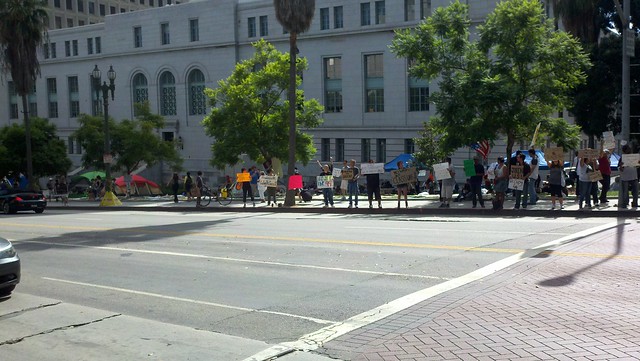
The Newest Library in Down Town LA
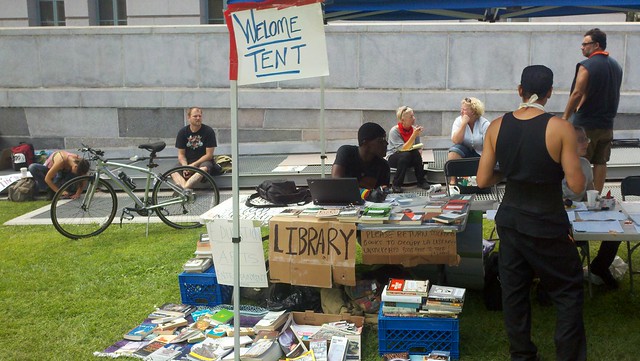
People Hanging Out
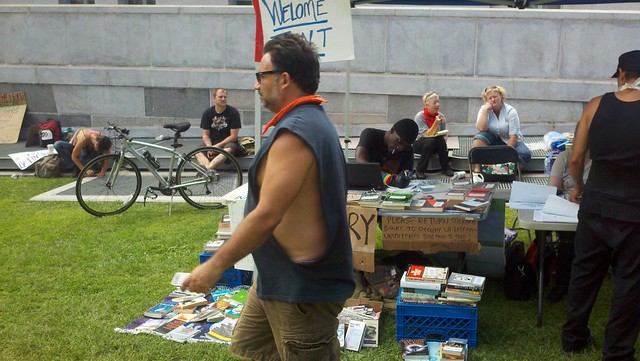
Power to the People
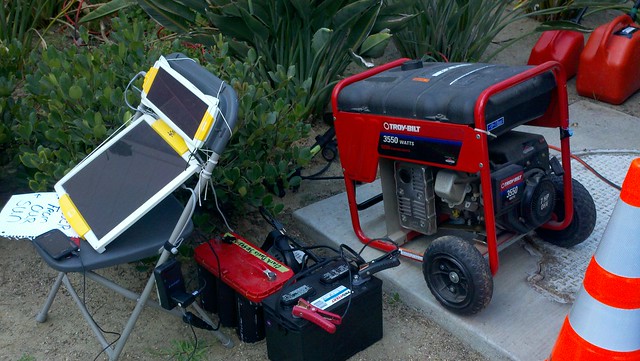
The Sign Depot
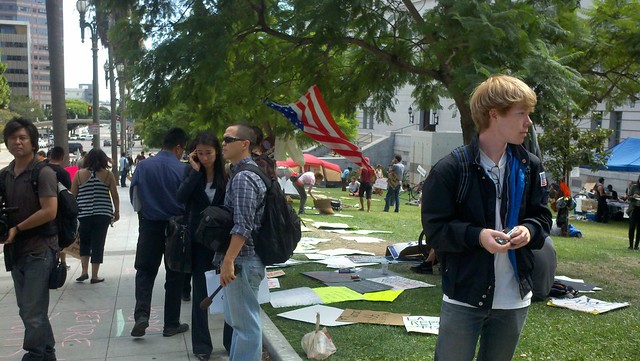
Even the 1% is coming by to visit and help out
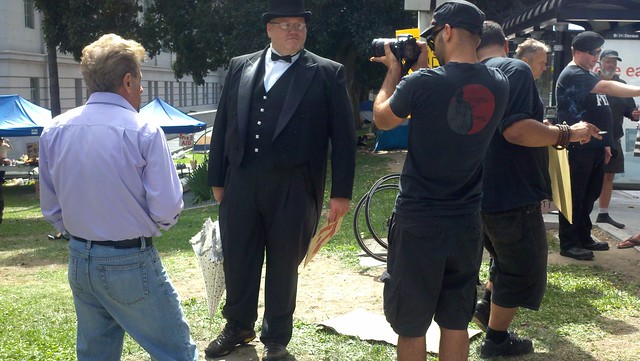
2011-10-03 Thomas Hammarberg: we have evidence on Polish CIA prison
Council of Europe Human Rights Commissioner Thomas Hammarberg stated in a recent interview with Polish public TV that he has evidence on a CIA prison on Polish soil, and that he is positive that this material is also in the possession of the Polish prosecutor investigating the case.
He also said that he knew who was held in this prison. Insofar, publicly known evidence only proved that CIA planes landed in Szymany. All other conclusions were based on circumstantial evidence. As a source for this information Hammarberg quoted leaks from various sources, including the CIA itself, and official documents.
Hammarberg has already briefed Polish MFA Radosław Sikorski about his findings, and expects the investigation to proceed very soon.
Currently, there are two separate legal cases underway, an investigation in Poland, and a complaint at the European Court of Human Rights, amongst others for a failure to investigate. WL Central recently reported on a newly released Wikileaks document, which proves a complicity between the US and Poland to cover up the issue of the CIA prison. This document was strangely overlooked by various media partners who had access to this material for several months.
For our previous coverage please see this link.
2011-10-04 #OccupyLA - Day 4
After the struggle following the first Occupy LA General Assembly in which a small group of protesters balked at the police demand, insisted upon by the Occupy LA Security Committee, that all tents be moved to the sidewalk after 10:30pm, this group congealed into what they begin calling themselves the “Police Brutality Committee.” They did this without seeking or receiving approval of the GA.
On Sunday, the 2nd day of the occupation, this group met together the better part of the day in preparation for the evening GA. When they met as the Police Brutality Committee, they resolved to call for the disbanding of the Security Committee, which they said acted like police and took orders from the police.
Even through the LAPD has so far been exceptionally helpful and courteous, this group wants Occupy LA to refuse any cooperation with them. For example, Sunday a single police car monitored the the protest camp at city hall from across the street that at times had close to a thousand people in it. There have been no arrests and no reported incidents. When people marched on a bank Monday and went into the lobby and passed out flyers, the police didn't try to stop them. When asked why they were there by one protester, she was told they were just there to make sure the protesters didn't do something like writing on the wall. I wish I had been there. I would have told him the writing was already on the wall and that's why we are camped out on the city hall lawn.
In more personal conversations many have expressed support for our cause. This is quite understandable because the economic crisis effects them doubly. First, the impoverishment of the people means doing their job on the streets is all the harder and more dangerous. This is true whether you call it “suppressing the masses for the Man” or by any other name. Secondly, the cut backs in city budgets puts them in danger of losing even that job.
In spite of this real world situation, members of this self-appointed committee stated frankly that they didn't consider police to be part of the 99% and they wanted to be more confrontational with the police. Although their stated purpose was to raise awareness about police brutality, they have been spoiling for a fight with the police.
They were particularly steamed that protesters didn't “confront” the police when the protesters went to Occupy Metro. At the metro station the cops were also very supportive. The members of the “Police Brutality Committee” objected to the the chant “You are the 99%” being directed at the police. At their meeting many said they never would have gone if they knew it was going to be a “police love feast.”
Some of these same people dominated the facilitators meeting that set the agenda and choose the chairs for the third occupation GA. It would also appear they had influence on picking the stackers because some people had undo trouble getting on the speakers list, But when they got to the part of the agenda they had been waiting for, the report of the “Police Brutality Committee” there was such strong opposition to their proposals that they quickly tabled them without allowing discussion.
Afternoon General Assembly - Day 4
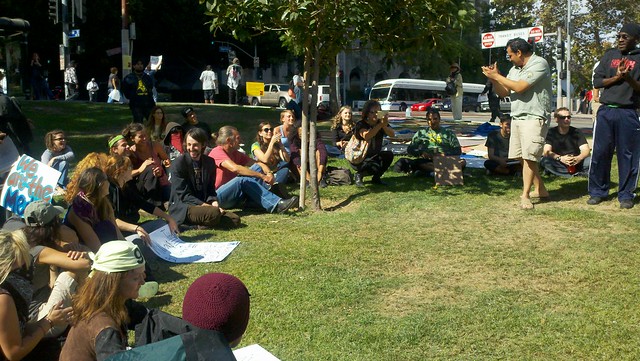
The next day, at the General Assembly, they pushed a much more limited agenda, but then they didn't have the control of the process that they had the day before. Also, someone pointed out that this committee had never been sanctioned by the General Assembly and they were forced to petition for approval. There was much opposition to approval and the matter was tabled again.
They also put up a facebook page with the misleading title “End Police Brutality at Occupy LA.” That was also met with growing opposition, so more struggle around this issue was expected at this evening's General Assembly. But that GA was facilitated by an entirely new group and with many first time attendees both from the public and the media, it wasn't dealt with then either. It is planned to work on that issue at a quieter time Wednesday.
Occupy Los Angeles with SEIU Janitors
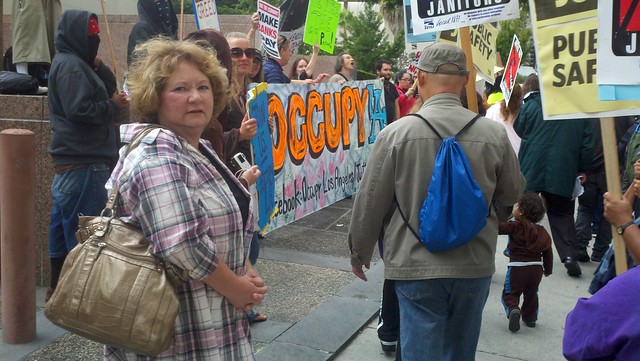
Also Tuesday, Occupy LA did a joint demonstration with members of SEIU janitors local. About a hundred union members and an equal number from Occupy LA members marched in front of the post office on Temple Ave several blocks from city hall for about an hour. On the way back to city hall, they stopped at Michael Jackson's doctor's trial and serenaded the media camped out there with chants. Local media coverage has been growing in the past few days with TV trucks parked near the encampment most of the time. This is addition to the army of satellite trucks at the Murray trial. This local news coverage is bringing a growing number of Angelenos out to the protest.
Occupy LA protesting with the Janitors Union
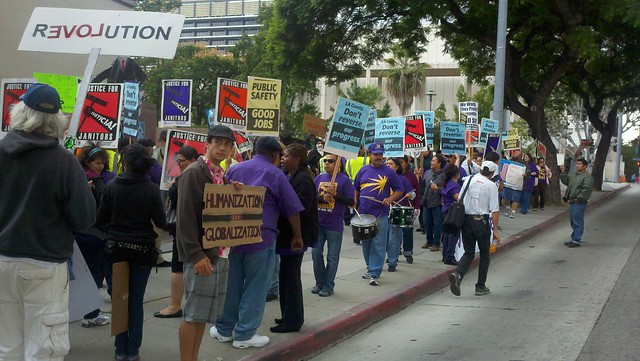
Two Los Angeles councilmen, Eric Garcetti and Bill Rosendahl came out of the building to talk to the protesters and hold press conferences, naturally. Tomorrow they are joining Richard Alarcon in introducing a support resolution for Occupy Los Angeles in the city council on Wednesday. The protesters plan to pack the chamber.
Also Tuesday, a representative from LA Union, the LA County AFL-CIO came by to ask our support for a joint protest of energy giant SEMPRA on October 13th. A General Assembly was called on the spot and the action was endorsed. Thursday they have another labor action planned with SEIU.
Only four days into Occupy Los Angeles and they already have gotten great labor support and significant major media coverage. The outpouring of support from the Los Angeles community has been incredible. They have not lacked for food or water or anything as so much is being sent to them by the public, everything from tents and sleeping bags to baby wipes. They received no less than three pizzas deliveries today, one was about three dozen pizzas. One protester/journalist tweeted that they had better plan a lot more actions or he was going to start gaining weight.
More and more people are joining Occupy Los Angeles everyday and this makes the growing pains like those associated with the Police Brutality committee a relatively minor concern.
It always feels like spring in Los Angeles, but this is starting to feel like an "Arab Spring."
2011-10-04 WikiLeaks Notes: Latest News on #Cablegate Releases & #WikiLeaks
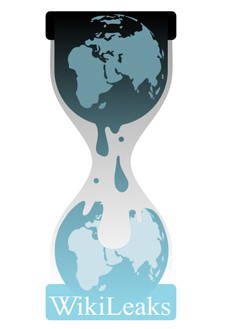
This is a "WikiLeaks News Update", a news update of stories that are obviously related to WikiLeaks and also freedom of information, transparency, cybersecurity, and freedom of expression.
Today is the fifth birthday of WikiLeaks.org! 5 years of crushing bastards a message on the official @wikileaks twitter account reads.

The domain was created on the 4th October 2006, at 05:54:19 UTC.
Founder Julian Assange has now spent a total of 301 days under house arrest without charge, an electronic bracelet that monitors all his movements attached to his ankle.
A decision on his extradition appeal is expected soon, the High Court of London having resumed its activity monday after a period of vacation.
Bradley Manning has now spent 497 days under pre-trial detention.
Upcoming WikiLeaks events, with the participation of Julian Assange or Kristinn Hrafnsson are listed below:
* Julian Assange will speak at the New Media Order Conference 2011, Istanbul (live from England), on the 5th October (tomorrow).
* On Saturday, the 8th October, an Antiwar Assembly will take place in Trafalgar Square, London, to protest the war in Afghanistan. Julian Assange is among the speakers which also include Jemima Khan, John Pilger, Peter Tatchell...

* Both Julian Assange and Kristinn Hrafnsson are to speak at the 67th General Assembly of Inter-American Press Society (SIP), 14-18 October, in Lima (Peru).
* 1º Encontro Internacional de Blogueiros Progressistas, Foz do Iguaçu (Brazil), 28-30 October will have the presence of Kristinn Hrafnsson.
Selected recent Cablegate press coverage:
- "A diplomatic cable published last month by the WikiLeaks website reveals that most of the Clean Development Mechanism projects in India should not have been certified because they did not reduce emissions beyond those that would have been achieved without foreign investment." via Scientific American
- Bangladesh: Extra-judicial killings in the name of ‘crossfire’ or ‘encounter’ by Rapid Action Battalion (Rab) referred to as "necessary, short-term expedient" by former second-in-command of Rab, Chowdhury Fazlul Bari, during a conversation with US officials in June 2005.
- According to a U.S. diplomatic cable released by WikiLeaks, Nelson Mandela advised Robert Mugabe to step down in 2007 as a way of preserving his 'liberation war legacy', or run the risk of being disgraced like Chilean dictator Augusto Pinochet, who later faced criminal trials. via All Africa
- Former Al Jazeera director, Wadah Khanfar, commenting on his sudden resignation in a recent interview : "The Wikileaks report has nothing to do with my resignation."
And in other news,
- Artist and activist Clark Stoeckley’s "WikiLeaks Truck" (a non-official vehicle decorated to raise awareness and elicit reactions to the work of WikiLeaks and Bradley Manning’s detention) was pulled over and searched during the Occupy Wall Street protests.
- On September 30, Julian Assange addressed the Festival of Dangerous Ideas at the Sydney Opera House, via satellite, on the topic WikiLeaks Has Not Gone Far Enough. Although a video of Julian’s speech and the Q&A session that followed was not released, audio of the event was recorded by WikiLeaks supporter @NOH8ER (of which a full transcript is in the making) and a write-up was put together as well.
Additionally, there are two chirpstories available with selected updates that were live tweeted - 1 , 2 - as well as a mainstream press report containing a few important quotes from the evening:
"At the moment, WikiLeaks is a rather big boat with a lot of torpedo holes in it that has taken water in and is drifting along and we're doing our best to keep it afloat."
"We have only just begun. We have put into that historic record less than one-thousandth of the series of information that is concealed that needs to be there."
''Until we know ourselves, and until we know the civilisation we are working in, we cannot possibly address the problems of our civilisation.''
"(…)even if WikiLeaks is destroyed, other people have been inspired by our work and they will continue to carry the flame."

Referring to the release of the full Cablegate documents, Julian Assange commented:
"It can't be called a dump - dump is what you do to garbage. This is a treasure."
2011-10-05 #OccupyLA - Day 5
It never rains in Southern California but it is raining today, another test for Occupy Los Angeles. It rained off and on all night and is expected to be rainy for the next few days with tomorrow being the worst. It should be clearing up about the same time the permit for amplified sound and full use of the city hall park comes into effect. Also by then, the film shoot on the larger south lawn will be over and they can move back there. That will be good. They need the space, protesters keep arriving and Occupy LA is already outgrowing the smaller north lawn. Soon they will need both.
The whole occupation movement is growing here in Southern California as it is elsewhere. Visitors from the new Occupy Orange County came here yesterday, as did some people planning Occupy Longbeach and at noon today, students walked out of classes to begin Occupy USC.
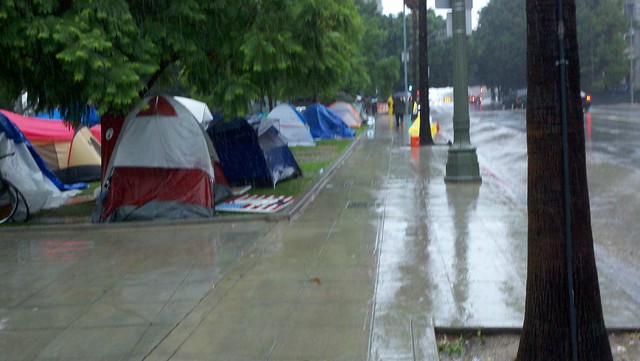
But today it's water, water, everywhere. Fortunately there is plenty of coffee to drink. Everything is wet. Tents, sleeping bags, clothes, signs. It's enough effort just keeping electronic equipment dry.
Everybody is wet, holding meetings under the shelter of the larger tents or huddling inside the smaller ones. So the city council meeting turned out to be a bit of lucky timing. Normally it's hard to look forward to sitting on a hard, but dry bench in the city council chamber. Today it might have been a good idea even if Occupy LA wasn't on the agenda.
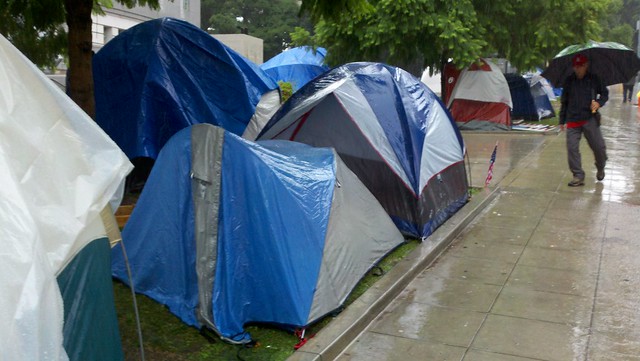
The choice of city hall for the Los Angeles version of Occupy Wall St. initially was a controversial one because their chief target is not the city, but now most occupiers think it perfect. It is in the heart of downtown Los Angeles and so pretty much equal distance from everybody. The financial center on Grand is only a few blocks west with Wells Fargo, First City National, Deloitte and Touche and two Bank of Americas as handy action targets. To the east is the county jail and the Federal building and just down Spring a block south is the county courthouse, complete with the Michael Jackson international press corp and satellite truck round up. They've even discovered a CVS pharmacy and a bunch of fast food places in the underground shopping center across from city hall.
On Monday, "In a strongly worded declaration, the L.A. county AFL-CIO has endorsed the “Occupy” protests that began in New York and have spread to Los Angeles and other cities." according to the Hollywood Reporter that went on to explain, "The group -- the L.A. County Federation of Labor -- is an umbrella group of AFL-CIO locals and other unions. Among its affiliates are AFTRA, SAG, Teamsters and Los Angeles based IATSE locals."
The big event Wednesday was a City Council resolution in support of Occupy Los Angeles being sponsored by Councilpersons Richard Alarcon, Eric Garcetti and Billy Rosendahl. Rumor had it that Jan Perry and Bernard Parks would oppose as payback to Alarcon for his vote on an unrelated matter
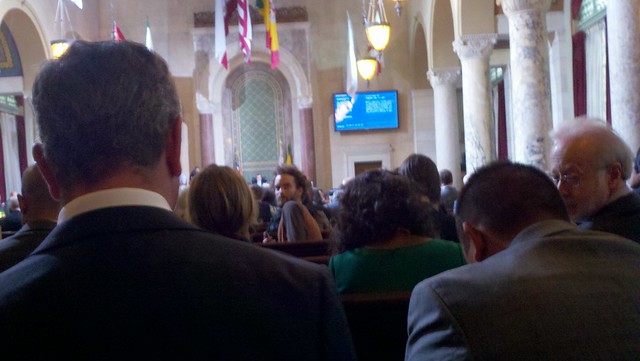
Occupy Los Angeles members filled the council chambers till some were standing in the rear. Many signed speakers cards and were able to speak. They generally made very good comments in the two minutes allowed to each speaker.
While people were speaking, someone from the city started passing out copies of the resolution signed by 7 out of the 13 councilpersons, which told us it would pass, now the only question was by how much.
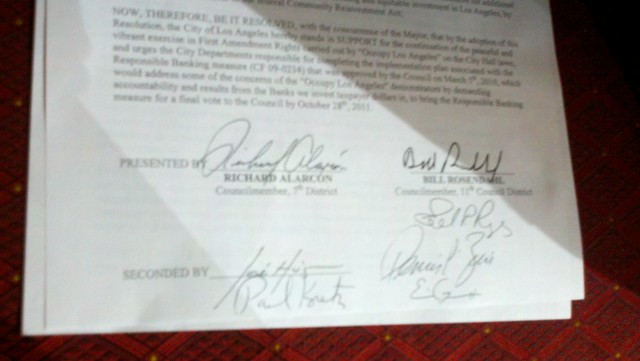
It didn't actually pass today because the council never votes on a resolution at the same meeting at which it is introduced but the vote to set put it on Tuesday's agenda passed unanimously, which is a good indication of how things will go.
The city council has also sent a request to the mayor asking him to issue an executive decree allowing us to stay camped on the lawn 24/7 instead of having to move to the sidewalks every night.
These decisions indicate that cooperation they have so far received from the city and the LAPD will continue, at least for now. The lack of conflict and intimidation has made it a place were people feel safe in visiting even with their families and the overall atmosphere means that they get hooked on the first visit. The coverage from the local media, and even the crews nearby covering the Jackson doctor's trial, means that word is going out much wider than it could by relying on alternate media alone. So the people are coming to join them in increasing numbers as are the food and supplies from the community that will sustain them.
The stars seem to be aligned for Occupy LA even if they can't see them tonight because of the rain clouds.
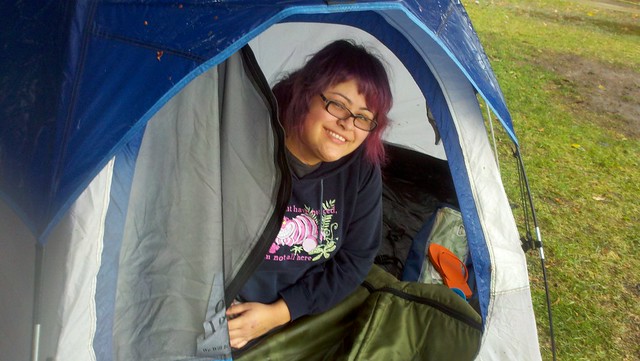
Excerpts from the city council resolution appear below and the entire thing in image format can be found here. A link to the text if promised and will be posted here when we get it:
Whereas, in cognizance that one of the factors spurring recent violent revolutionary protests in the Middle East is high income inequality, though the sobering reality is that income inequality in the United States is even higher than that of some of the countries torn asunder by violent revolution; for instance, according to the C.I.A. World Fact Book, the United States Gini coefficient, which is used to measure inequality, is higher than that of Egypt’s pre-Revolution.
2011-10-05 Canada joins the revolution #OccupyCanada #cdnpoli #oct15
Although Vancouver’s Adbusters has been credited with providing the name and one of the catalysts for the current Occupy Wall Street movement, Canada's attempts to initiate any reform action of its own are just now gaining attention. Copycat Occupy Wall Street type Twitter accounts and sites are springing up for most major cities, scheduling a demonstration as part of the October 15 democracy movement. These accounts have mostly appeared in the last couple weeks, and copy Occupy Wall Street’s model of concentration in major cities and no agenda outside of communication. Occupy Canada simply has a message of solidarity with the other Occupy movements.
An earlier site with a very clear agenda is Take the Square Canada, which asks for the creation of a true participatory democracy by:
Take the Square Canada also strongly supports the Universal Declaration of Human Rights.
The 1948 Universal Declaration of Human Rights, a 63 year old document generally agreed to be the foundation of international human rights law and many constitutions, was first drafted by Canadian John Peters Humphrey and Canada was one of the original signatories. Canadian law and policies should never deny the rights we are entitled to under the UDHR.
Take the Square Canada also has concerns with regionalization and concentration of the discussion in big cities and universities only. They are asking for other participation options to be set up here.
Another earlier site is Real Democracy Now! Canada which describes itself as a “coalition of progressive forces for real democracy in Canada” and has ties to the Spanish movement of the same name. They have a blog here. They ask:
1) THAT GOVERNMENTS PUT OUR INTERESTS BEFORE THOSE OF THE MARKETS AND THE FINANCIAL INSTITUTIONS
There are basic rights that should be met in our society, such as the right to housing, employment, healthcare and education. Governments must stop using the financial crisis as a pretext for cutting social benefits while those responsible for the crisis keep getting richer every day
2) PARTICIPATORY DEMOCRACY
In a real democracy, the government belongs to the people (demos=people ; cracia=government) But most of the political class doesn’t even listen to us. Its role should be to bring our voice to the institutions, facilitating citizens’ participation through direct channels that provide the greatest benefit to society as a whole. Their campaign promises are a contract, and if they breach it, they should be fired like anyone else.
3) CORRUPTION CONTROL
Laws against corruption should be amended and upheld so that fraudulent politicians, bankers and corporate executives cannot continue to enjoy immunity and impunity.
All the movements appear mutually supportive and with similar goals so far.
2011-10-05 Greek 24h general strike proceeds among more scenes of police brutality #syntagma #greece #5ogr
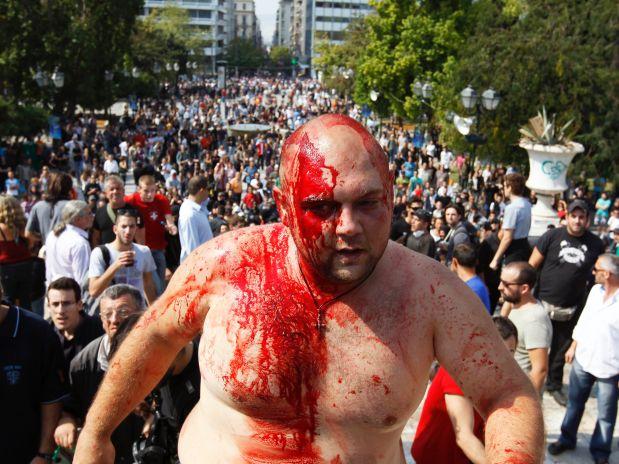 Today the Greek population is expecting more violent episodes against protesters around the country, as the second 24h general strike in a few months takes place. The estimates are that around 20 thousand people have stayed home in Athens alone: the strike was led by unions and called for in private and public sectors, including lawyers, teachers, state hospitals, air traffic controllers and public transport, who will operate under minimums to allow more people to reach protests. All day long people have been gathering in the iconic Syntagma Square, the center point of the movement in Athens, located right in front of Parliament. These actions are a result of the severe desperation of citizens around the country, who are being suffocated by the brutal austerity measures programmed by the Troika (IMF, European Central Bank and the European Commission). The latest news is that at least 30,000 civil servants will be laid off to try and reach the 7.5% public deficit benchmark, agreed for the second massive loan to take place (the figure is currently at 8.5%). This has led to the general notion that all the costs are being pushed onto the population, while the benefits of the bailout deal lie with the bankers, as ex-European Central Bank economist, Omar Issing, openly admitted to the New York Times: “Everyone knows this was a good deal for the banks [...] it will not help Greece at all.”
Today the Greek population is expecting more violent episodes against protesters around the country, as the second 24h general strike in a few months takes place. The estimates are that around 20 thousand people have stayed home in Athens alone: the strike was led by unions and called for in private and public sectors, including lawyers, teachers, state hospitals, air traffic controllers and public transport, who will operate under minimums to allow more people to reach protests. All day long people have been gathering in the iconic Syntagma Square, the center point of the movement in Athens, located right in front of Parliament. These actions are a result of the severe desperation of citizens around the country, who are being suffocated by the brutal austerity measures programmed by the Troika (IMF, European Central Bank and the European Commission). The latest news is that at least 30,000 civil servants will be laid off to try and reach the 7.5% public deficit benchmark, agreed for the second massive loan to take place (the figure is currently at 8.5%). This has led to the general notion that all the costs are being pushed onto the population, while the benefits of the bailout deal lie with the bankers, as ex-European Central Bank economist, Omar Issing, openly admitted to the New York Times: “Everyone knows this was a good deal for the banks [...] it will not help Greece at all.”
The brutality with which these obviously unpopular reforms are being imposed by the state is incredible by EU standards: from the very beginning riot police have taken violence to another level (as the hundreds of videos and photos have shown, here is one of many examples), to the point of hitting an 8 year old girl. Today, much of the expected violence is already taking place. The initial reports on Twitter that photojournalist Tatiana Bolari had her teeth broken after photographing an arrest are confirmed by this picture:
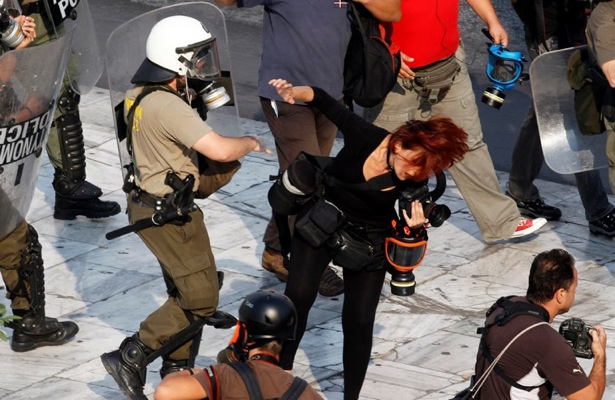
At least one other man has been injured after clashes in Syntagma Square, although the number will probably be much higher towards the end of the day. There are many reports that police are indiscriminately using tear gas against groups of protesters, as well as of radicals using molotov cocktails and rocks against government forces.
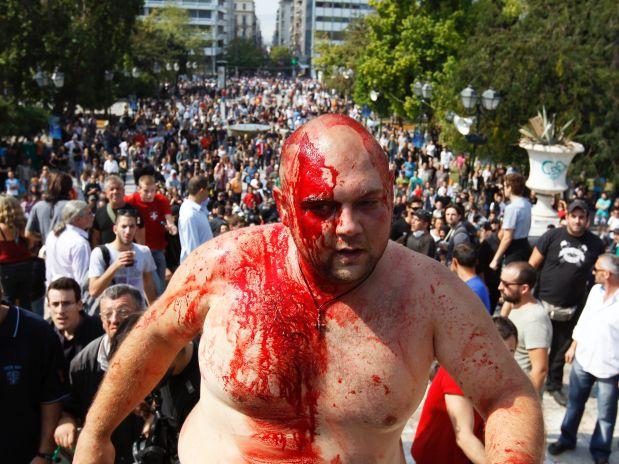

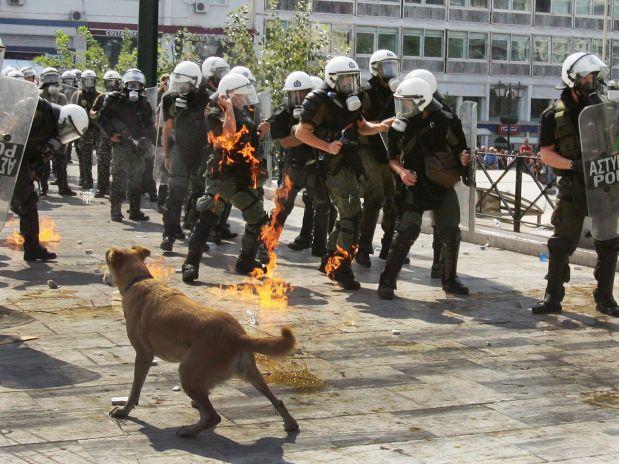
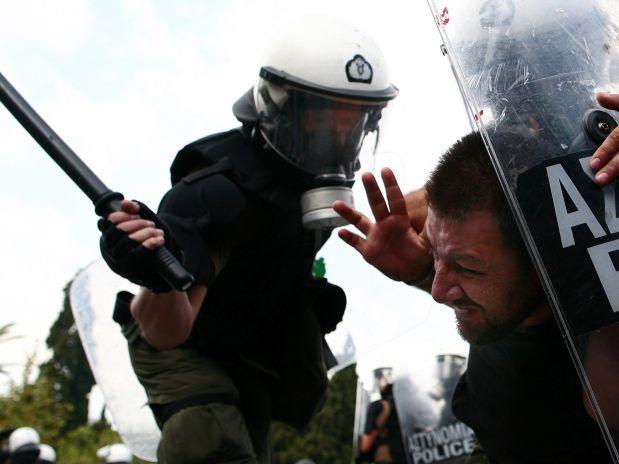
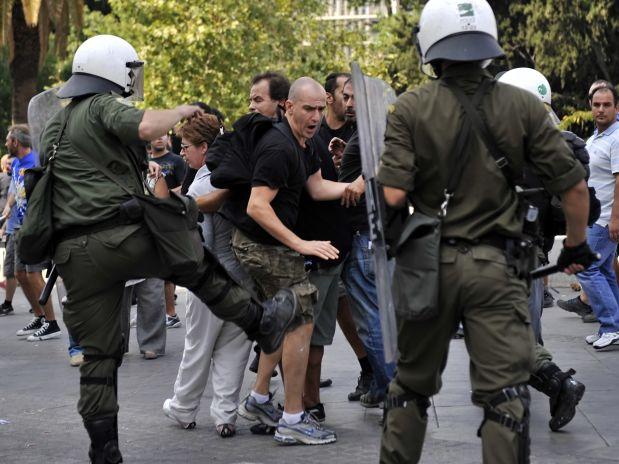
Police attacking peaceful women:
Χωρίς αντίσταση from ThePressProject on Vimeo.
Police throwing rocks at protesters:
The effect of this violence is devastating, as independent blog Roarmag.org warns: "The legitimation crisis is no longer limited to the government. It is the legitimacy of the oppressive state system that is now at stake. And the anger is shared left, right and center."
Visit the link below for a live feed of events in Athens:
http://www.wearechangegreece.com/?p=3745
2011-10-06 #OccupyLA - Day 6
President Obama's Press Conference couldn't seem to stay way from the subject of Occupy Wall St. It came up time and again. Obama mentioned it and then Jay Taper of ABC News brought it up again. MSNBC is running interviews of people at the various occupations including Occupy Los Angeles. Fox News 11 was live at Occupy Los Angeles just before the noon march on an undisclosed bank with SEIU. It's beginning to feel like the story the major media wouldn't cover is becoming the story they can't stop talking about.
Occupy Los Angeles was once again bathed in sun light as the rain cleared up and the camp dried out. More and more occupies have been arriving everyday to the point that the north lawn is getting crowded with tents. Tomorrow the film shoot and the farmer's market will be over and the occupation moves back to the more spacious south lawn.
While the move from the north lawn had been forced by circumstances and the city, it turned out to be another thing that worked well for Occupy Los Angeles. Anyone who has ever held a small event in a large hall, knows how that can convey the feeling that not many people showed up even through turn out was greater that expected. The north yard was actually more suitable for their numbers in the beginning, now it is bursting at the seams with occupiers and tents. It's very crowded and that makes for good visuals. The move tomorrow will allow them to spread out a bit and make room for new occupiers. If the present rate of growth continues, both lawns will be packed by the end of October.
The renowned actress Rosanna Arquette toured Occupy Los Angeles in the morning, was interviewed on the live stream, did photo ops with some of the occupiers and told them why she was there, "Greed is not the American way."
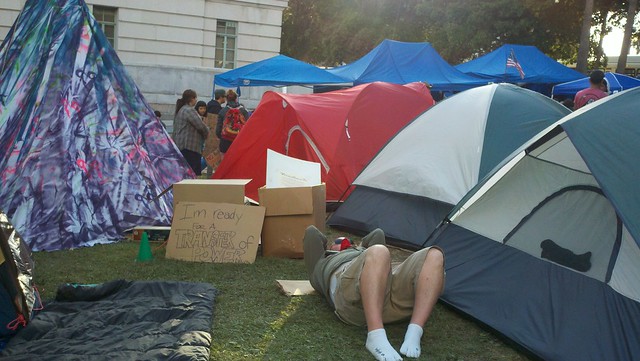
Food contributions are backing up a the donations keep coming. Hot meals are being prepared by the food committee and served several times a day. Somebody really knows how to cook because the meals are delicious. There is also a medical tent and while no one has mentioned any injuries or sickness, a lot of campers are losing their voices.
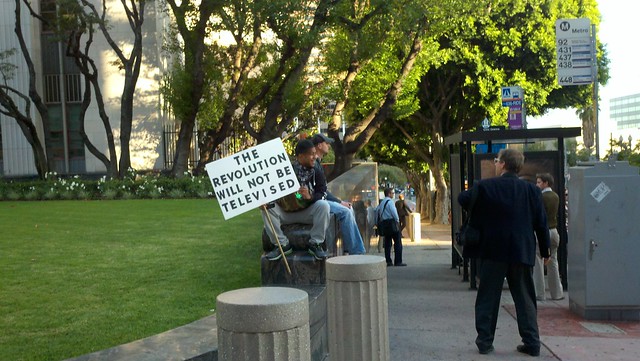
The media team is making sure they are well covered by uploading new pictures and videos on an hourly basis. Their equipment and capabilities are also improving as they are also starting to receive donations. The are a lot of media people around all day now, and most are not part of the media team or OccupyLA. A realization is developing that what is happening here is historic and part of a transformative movement so now it seems that everyone wants to get the story, alternative and major media alike.
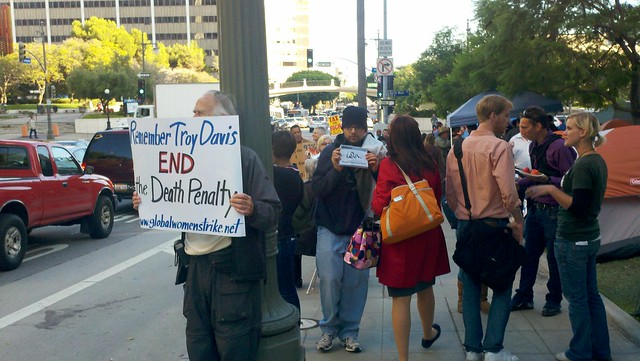
There is also an on-site print shop that not only does the usual flyers and signs can silk screen T-shirts and just about anything else that is brought to them.
More and interesting facilities are being created every day. The lending library keeps growing with contributed books, a bike repair depot was setup and today a bike share program for occupiers has been established with a half dozen donated bike.
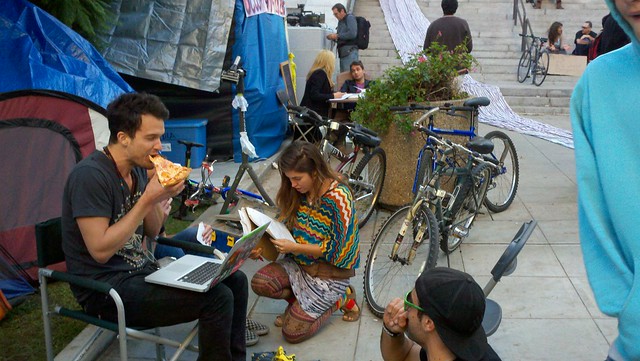
Today KPFK, the Los Angeles Pacifica Radio affiliate also setup a tent and Margret Prescott did a live broadcast from Occupy LA.
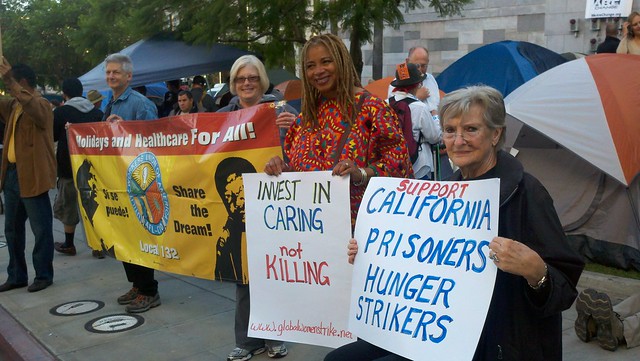
On advantage of the city hall location is that it sees a lot of traffic all day long. Some protesters are always standing on the curb with signs. The honking of cars, trucks and buses to now becoming so constant that most are growing use to it. Clearly Occupy LA has hit a responsive cord among the people.
Workshops and affinity groups are being established for a wide variety of interests.
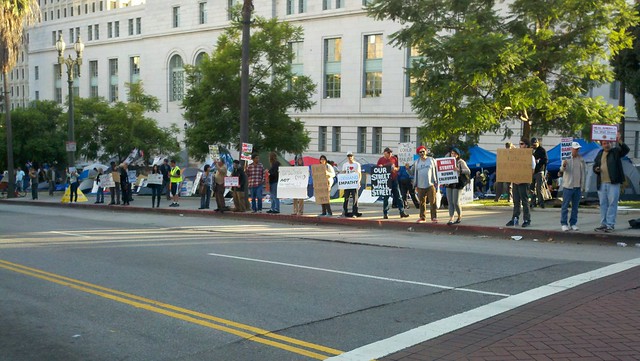
Local actions are at the heart of what Occupy LA is about and today they had a spirited march at noon with about 800 SEIU members and occupiers from city hall to the bank on 7th and Figueora. There was a spirited rally outside the bank. Eight protesters went into the bank and set up a tent. They were arrested.
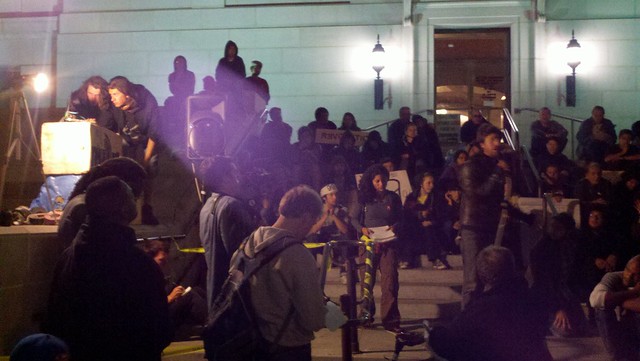
Last night some people met into the morning to work out some differences and deal with some bad feelings. This afternoon the facilitation committee met as usual before the General Assemblies and learning from the experiences of the first five GAs. The result was one of the most successful General Assemblies ever.
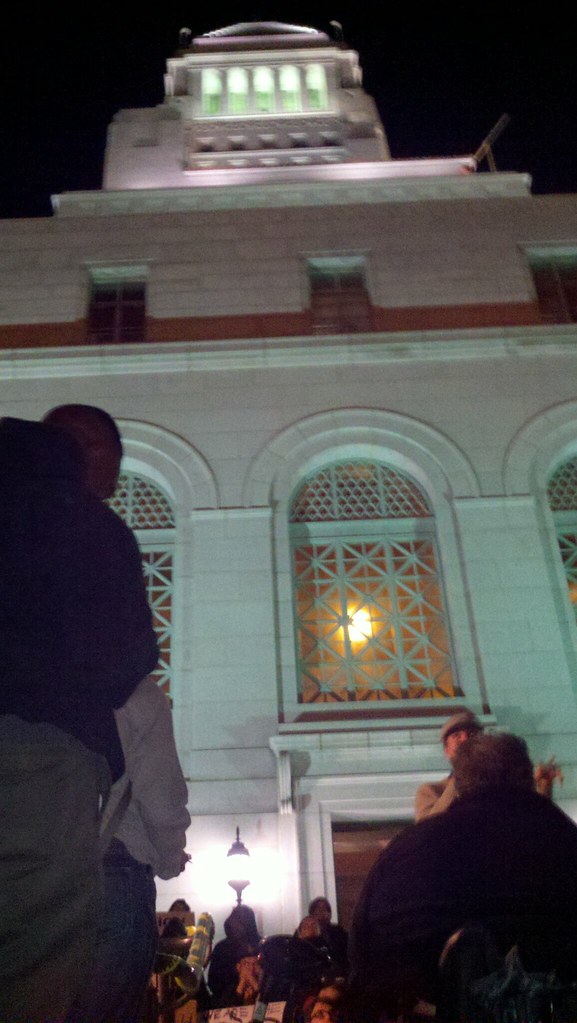
2011-10-06 Occupy Wall Street Police violence escalates #OWS #OccupyWallStreet
Yesterday, October 5th, another large demonstration of the occupy wall st movement developed into even more police aggression. As some trade unions (such as the local faction of the Transport Union of America) urged their members to participate the march swelled to around 20,000 people, according to organizers. Many other organizations took part in the protest, proving initial predictions that they would swell rapidly.
Most reports agree that even though initially peaceful, some tension started around 9:00 PM, after police barricaded Liberty Square, closing off Broadway and Liberty. Witnesses have confirmed that about 200 people tried to push, or were pushed, through these barricades and police responded with pepper spray, as well as penning them in with orange netting. These events can be seen in the video below. Also, OccupyWallSt twitter confirmed that 18 people were arrested.
Police conduct against peaceful protesters excercising their right to assemble is once again called into question. The same 'white shirt' policemen have been repeatedly seen abusing the use of pepper spray. In the video below a policeman, not knowing that he is on camera admits that his "little nightstick is going to get a workout", in reference to the protest that was about to reach his post, showing exactly the kind of attitude that causes the images of violence against civilians.
As of today, the camp at Liberty square is almost 20 days old, and the people there are undeterred in their objectives. Many suggest the obvious correlation between repression and the growth in participation:
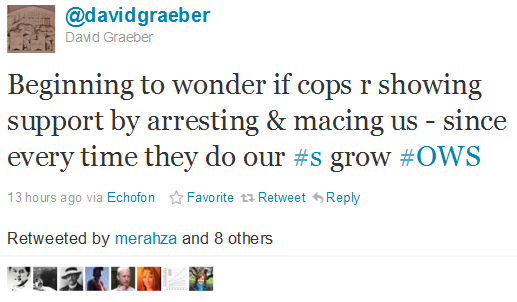
http://twitter.com/#!/davidgraeber/status/121762280122744832
2011-10-07 The Occupied Wall Street Journal
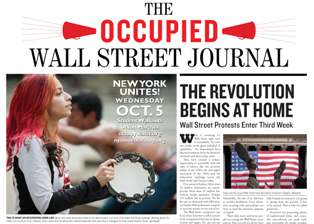 We are globalizing the rebellion.
We are globalizing the rebellion.
-- Eric Ribellarsi and Jim Weill, The Occupied Wall Street Journal
Near the lower tip of New York City lies the epicenter of a movement that is rapidly spreading throughout the U.S. The "Occupy Wall Street" protests consist of a loosely-knit group of disenfranchised citizens who are learning the process of revolution as they go along. Lacking any hierarchy or single spokesperson, these leaderless protesters have instead published their own newspaper, The Occupied Wall Street Journal (OWSJ). OWSJ serves as a main mouthpiece for the movement, which one of its writers describes as the "nucleus of a revolt that could shake America’s power structure as much as the Arab world was upended." Here are a few excerpts from its first edition:
From "The Revolution Begins at Home," by Arun Gupta:
Our system is broken. More than 25 million Americans are unemployed. More than 50 million live without health insurance. Perhaps 100 million live in poverty. ... The Wall Street occupation can force those in power to offer concessions as happened this year in Spain, Greece and Egypt ... if we unite there is a potential to transform a corrupt political process and realize a society based on human needs, not hedge fund profits ... thousands gather every day to debate, discuss and organize what to do about our failed system that has allowed the 400 Americans at the top to hoard more wealth than the 180 million Americans at the bottom. ...
The Wall Street occupation has succeeded in revealing how corporations, politicians, media and police have failed us as institutions offering something positive to humanity. ... That's why more and more people are joining the Wall Street occupation. They can tell you about their homes being foreclosed, months of grinding unemployment or minimum-wage dead-end jobs, staggering student debt loads, or trying to live without decent healthcare. They represent a generation of Americans who are told to believe in a system that only offers them "Dancing With the Stars" and pepper spray to the face. ... it is only through common struggle, debate and popular democracy that we will create genuine solutions which have legitimacy. And that is what is occurring down at Wall Street. ...
If we focus on the possibilities and shed our despair, our hesitancy and our cynicism, and if we collectively come to Wall Street with critical thinking, ideas and solidarity, we can change the world. For too long our minds have been chained by fear, by division, by impotence. The one thing that most terrifies the elite is a great awakening. That day is here. Together, let us seize it.
From "Declaration of the Occupation," approved by consensus on Sept. 29, 2011 at the New York City General Assembly in occupied Liberty Square:
We write so that all people who feel wronged by the corporate forces of the world can know that we are your allies ... a democratic government derives its just power from the people, but corporations do not seek consent to extract wealth from the people and the Earth ... no true democracy is attainable when the process is determined by economic power. We come to you at a time when corporations, which place profit over people, self-interest over justice, and oppression over equality, run our governments. We have peaceably assembled here, as is our right, to let these facts be known.
They have taken our houses through an illegal foreclosure process ... They have taken bailouts from taxpayers with impunity, and continue to give Executives exorbitant bonuses. They have perpetuated inequality and discrimination in the workplace ... They have poisoned the food supply through negligence ... They have held students hostage with tens of thousands of dollars of debt on education ... They have consistently outsourced labor and used that outsourcing as leverage to cut workers' healthcare and pay. They have influenced the courts to achieve the same rights as people, with none of the culpability or responsibility. ...
They have sold our privacy as a commodity. They have used the military and police force to prevent freedom of the press. They have deliberately declined to recall faulty products endangering lives in pursuit of profit. ...
They have donated large sums of money to politicians supposed to be regulating them. They continue to block alternate forms of energy to keep us dependent on oil. ... They have accepted private contracts to murder prisoners even when presented with serious doubts about their guilt. They have perpetuated colonialism at home and abroad. They have participated in the torture and murder of innocent civilians overseas. ...
From "No Excuses Left. It's Now or Never," by Chris Hedges:
Either you join the revolt taking place on Wall Street and in the financial districts of other cities across the country or you stand on the wrong side of history. Either you obstruct, in the only form left to us, which is civil disobedience, the plundering by the criminal class on Wall Street and accelerated destruction of the ecosystem that sustains the human species, or become the passive enabler of a monstrous evil. Either you taste, feel and smell the intoxication of freedom and revolt or sink into the miasma of despair and apathy. Either you are a rebel or a slave.
Choose. But choose fast. The state and corporate forces are determined to crush this. They are not going to wait for you. They are terrified this will spread. ...
The only word these corporations know is more. They are disemboweling every last social service program funded by the taxpayers, from education to Social Security, because they want that money themselves. Let the sick die. Let the poor go hungry. Let families be tossed in the street. Let the unemployed rot. Let children in the inner city or rural wastelands learn nothing and live in misery and fear. Let the students finish school with no jobs and no prospects of jobs. Let the prison system, the largest in the industrial world, expand to swallow up all potential dissenters. Let torture continue. Let teachers, police, firefighters, postal employees and social workers join the ranks of the unemployed. Let the roads, bridges, dams, levees, power grids, rail lines, subways, bus services, schools and libraries crumble or close. Let the rising temperatures of the planet, the freak weather patterns, the hurricanes, the droughts, the flooding, the tornadoes, the melting polar ice caps, the poisoned water systems, the polluted air increase until the species dies.
If you do not shake off the 1% very, very soon they will kill you. ...
Those on the streets around Wall Street are the physical embodiment of hope. They know that hope has a cost, that it is not easy or comfortable, that it requires selfsacrifice [sic] and discomfort and finally faith. They sleep on concrete every night. Their clothes are soiled. They have tasted fear, been beaten, gone to jail, been blinded by pepper spray, cried, hugged each other, laughed, sung, talked too long in general assemblies, seen their chants drift upward to the office towers above them, wondered if it is worth it, if anyone cares, if they will win. But as long as they remain steadfast they point the way out of the corporate labyrinth. This is what it means to be alive. They are the best among us.
From "NYC – Occupy Together," by Michael Levitin, Grim & Jed Brandt:
In just over ten days, over 40 cities have emerged to join the Occupy Wall Street effort. ... many are feeling the hope that real change can emerge from this leaderless movement in which people are leaving their homes to occupy thier [sic] communities. ...
Meetings are being held almost daily to start a nationwide Occupy effort in October; already the list of cities that have signed on is jaw-dropping, and surprising. Birmingham. San Diego. Las Vegas. Omaha. Boston. Lexington. San Francisco. Philadelphia. Kansas City. Washington. Tampa. Denver. Pittsburgh. Buffalo. Charlotte. Richmond. Austin. Salt Lake City. Asheville. Miami. With new occupations popping up every day. If occupiers cannot get answers and solutions from government through the ballot, they will do it through the power of their presence in an "inconvenient space." We are at the beginning of a monumental change in this country, and the world. The system won’t change itself. It's up to us: our bodies in the street, our talents put to work, our passion given life. Systemic change requires more than "protesters" and "activists." You. Your family. Your friends. Your neighbors. All of us. Now.
The Occupied Wall Street Journal is accepting contributions.
2011-10-08 #OccupyLA - Day 7
Friday was the tenth anniversary of the U.S. war on Afghanistan and in the morning the Interfaith Communities United for Peace and Justice led a big march against the war endorsed by almost fifty progressive organizations in Southern California, including VFP, PDA, ANSWER, NLG, AFL-CIO, & Code Pink. ICUPJ was formed right after 9/11/01 and is just about as old as the war.
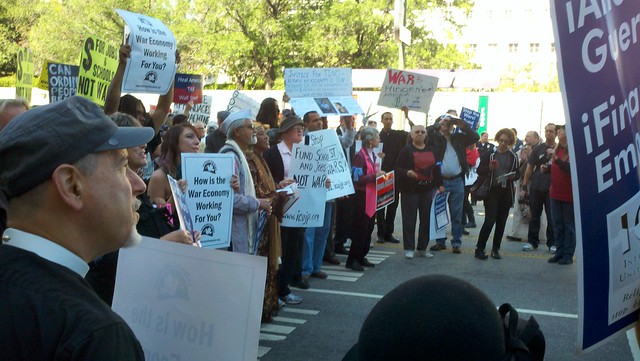
The demands of the march were to stop the wars and fund jobs. They asked that all troops and private contractors be removed from Iraq and Afghanistan this year, that torture be stopped both at home and abroad and they called for an end to drone attacks targeting civilians in Pakistan and elsewhere.
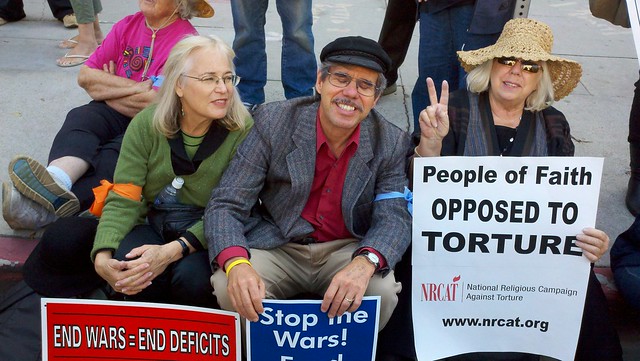
The march started with interfaith prays and gathering at La Placita Church, 535 N. Main St. and proceeded to the downtown Federal Building where a rally and planned civil disobedience were held. On their way, the marchers passed city hall where Occupy Los Angeles joined them. Then hundreds of people from Occupy Los Angeles and ICUPJ rallied in front of the federal building on Main St.
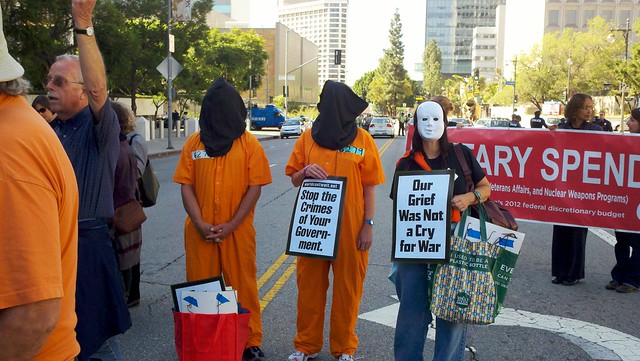
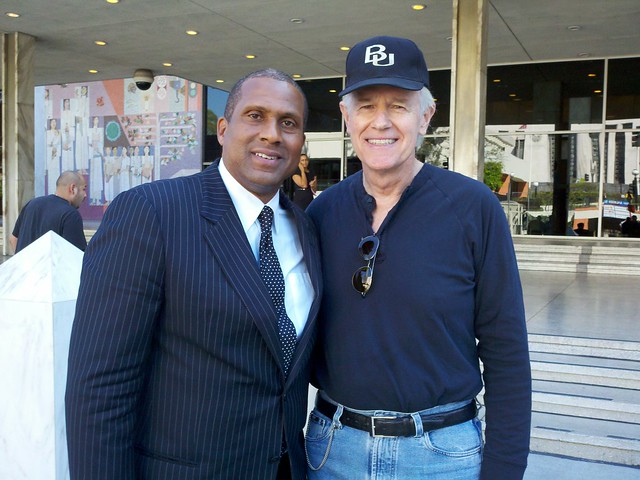
The speakers included actors Mike Farrell and Mimi Kennedy and Professor Cornell West as well as representatives of the organizations supporting the rally. Tavis Smiley and Cornell West paid a visit to Occupy Los Angeles latter in the day. Keith Olbermann was expected but never did show up.
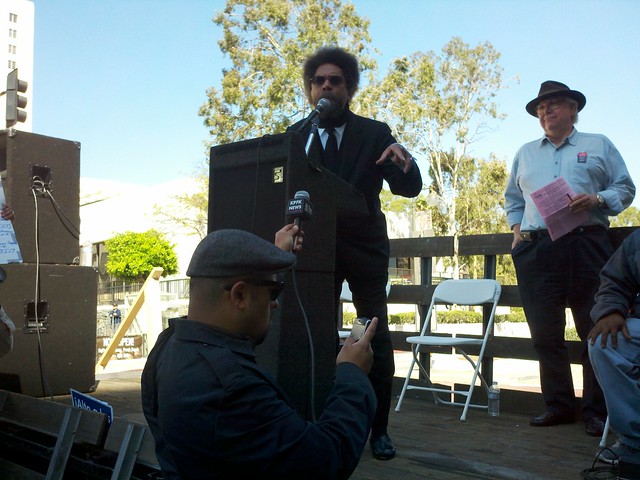

At the end of the rally 14 members of ICUPJ were arrested in a well orchestrated act of civil disobedience. There were far more police at this rally than had been around the city hall encampment because they had been notified of the plans, but they hung back through most of the rally. When the time came, they moved forward and told everyone who didn't want to get arrested to move to the sidewalk. Those that planned to be arrested formed a line across the street and linked hands. Then the police video teams moved forward to record each arrest as the protester was informed of her or his rights, placed plastic tie-wrap handcuffs and led to one of two waiting police vans. Jim Lafferty from the National Lawyers Guild observed everything to make sure no ones rights were violated.
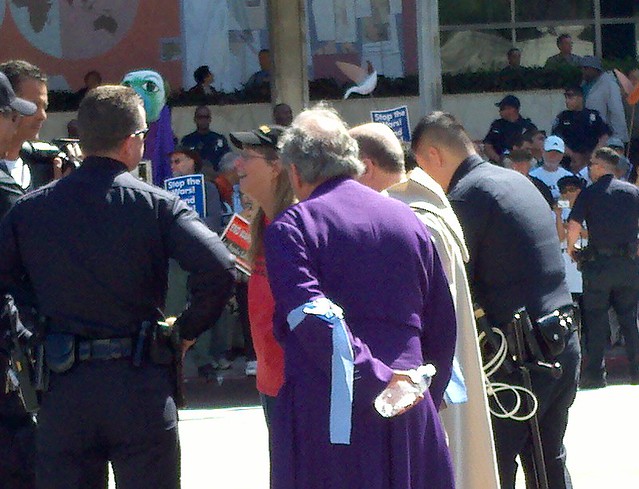
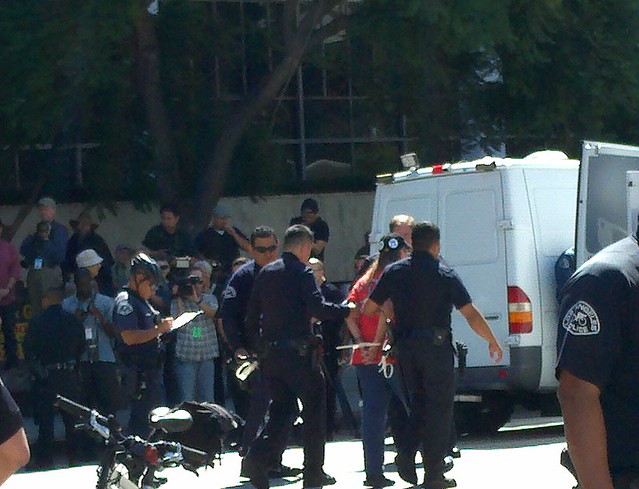
All night all day, occupy LA; All night all day, occupy LA; All night all day, occupy LA
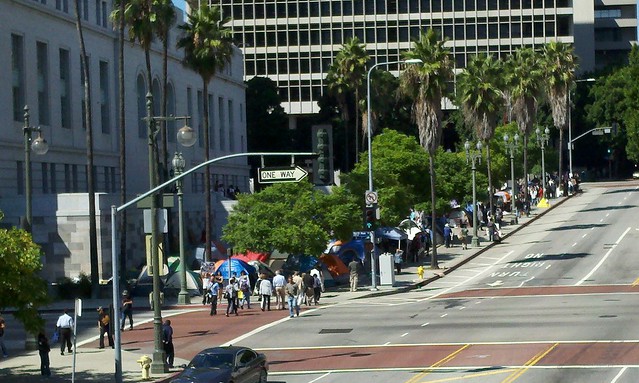
We are the 99%; We are the 99%; We are the 99%
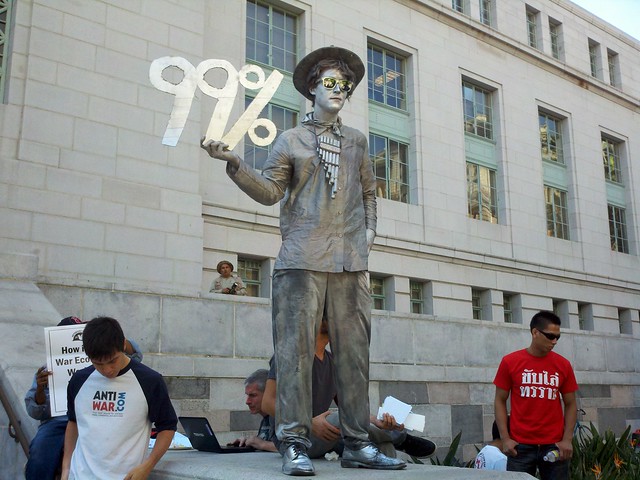
All night all day, occupy LA; All night all day, occupy LA; All night all day, occupy LA
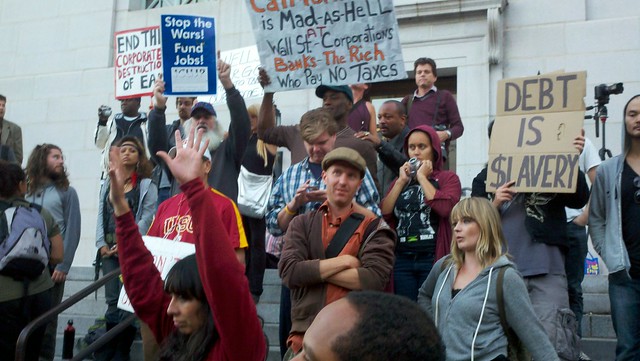
Journalist from around the world are beginning to show up. Cindy Sheehan and Camp Casey were so successful, in part, because there were a lot of bored reporters that had to be in Crawford, TX anyway to cover Bush on vacation and it hasn't hurt OccupyLA one bit that it is about a block south of the international satellite truck parking lot that is covering the trial of Michael Jackson's doctor.
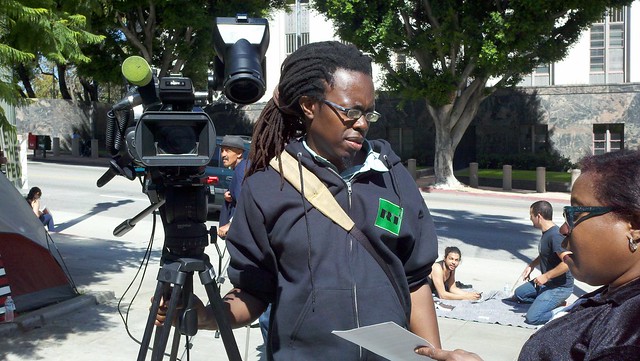
Finally, there are lots of meetings. The General Assembly meets at 7:30pm every night and usually go to 9:30 - 10:30pm.
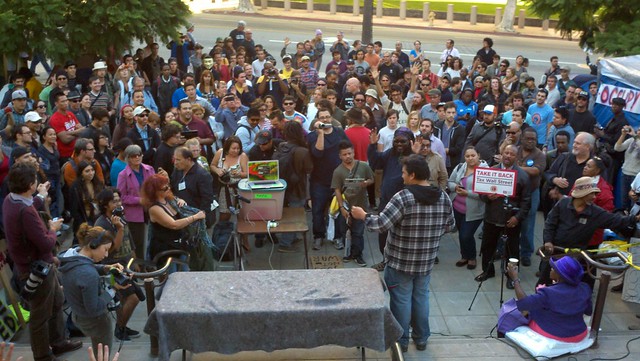
Breaking out of third person for a bit, I have a facilitators meeting at 5:30p and then the GA @ 7:30p which lasted till 9:30-10p, then a brief facilitators summation after that. That's my standard drill. A number of other committees have meetings at 5p or so. There are a lot of committees and most people are on one but the meeting times vary.
About 300 occupiers in 120 tents are spending the night these days but I'm not one of them. The Metro 733 bus has a stop two blocks from my place in Venice and has another stop at city hall and I make use of it. When I get home I finish my diary and sleep. I want to finish this one before 2am.
Wednesday night I was in a very important meeting that didn't break up until after 1am and I missed the last bus. Fortunately a comrade drove me back to Venice. But that meeting went a very long to resolving some contradictions that had been boiling under the surface of every previous occupation GA.
As a result the last two GAs have gone much smoother and gotten more real work done in less time. This is important because our 7:30p GA is more and more being attended by new people and the media and so we want them to be spirited, interesting, efficient and as tension free as possible. We want these meetings to example our best and invite the 99% in. The more sticky problems can be taken up by the people most concerned at other times, at 1am if necessary.
We are all operating on very little sleep and a lot of energy. Occupy LA is developing at an incredible rate, in every sense of the word. I can't even keep track of the unions that are supporting us. Supplies are coming in from all over the place. We got another 4G account and are setting up public wireless. More and different workshops are going on or being planned. I plan to lead one on Linux, probably next week. Today I heard Sony is letting us use a 40ft. editing trailer and someone else is setting up satellite downlink so we can see ourselves on the news at Occupy LA.
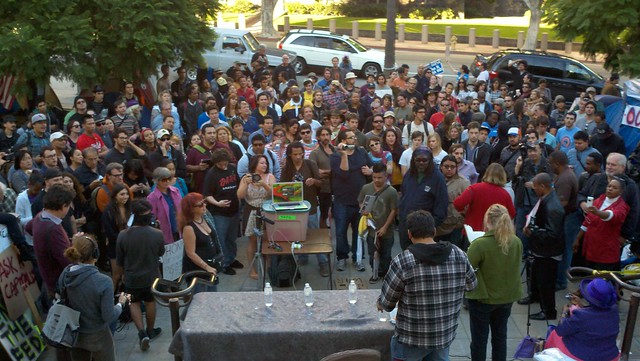
And we have already planned actions out to October 16th. We plan to be here for a while.
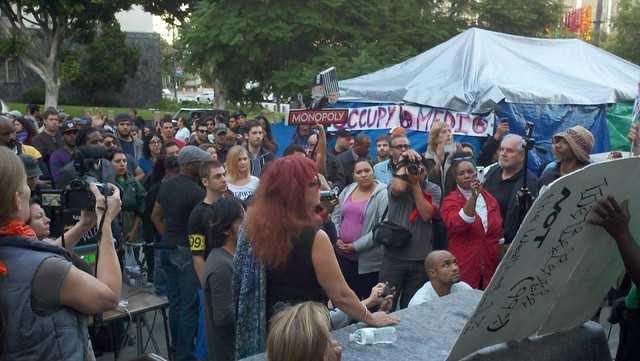
Be sure to visit the Occupy LA website for daily up dates and more. Today is Saturday and it's going to be huge. I'd better get some sleep. I've got to be back there in six hours.
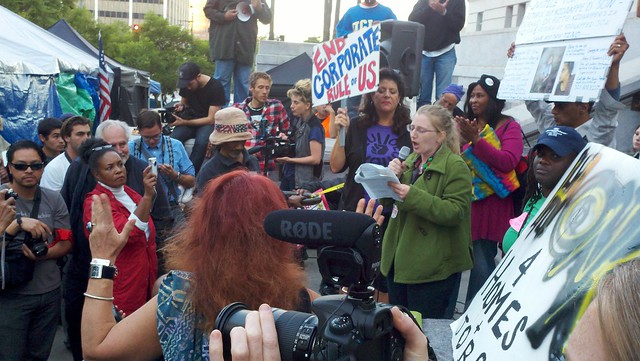
2011-10-08 48h global virtual assembly during October 8th and 9th #globalchange
This is a call for everybody to join a 48h virtual assembly on the Net. We are creating a global movement to change the world, so people takes back the capacity for decision October 15th is here, but first we would like to meet, to know what are you preparing for that day. What are your expectations, what is the situation in your country, well its an excuse to meet and begin our new way together to fight for a better world where all of us has its place and where human dignity is at its basis.
How can you join this 48h assembly?
We have opened several channels, you can use any of them, all of them, as you wish, as you like.
WebChat at freenode
Web chat is a written chat, its great for asymmetric communication, you can have it open and follow it from time to time. This chat is the same as using any IRC client and connecting to freenode.net
http://webchat.freenode.net/?randomnick=1&channels=15october&prompt=1
To change the default name to yourname_yourcity please put the following in the chat line
/nick yourname_yourcity
Example: /nick Groucho_Toledo
To open a new room put the following in the chat line
/join #15october-NameOfTheRoom
For example if you want to set up a channel to speak in japanese
Example: /join #15october-jp
Writing down the globalrevolution
To put in common all our ideas an actions you can write them down in
http://titanpad.com/15october
Mumble as voice conference chat
Mumble enables you to hear people and chat with them(with laptop and android), this time you have to install a software and configure the sound and you can join the conversation whenever you like.
For setting up mumble please follow the instructions in
http://takethesquare.net/2011/10/04/mumble-setup-walkthrough/
Data needed to connect:
Label: Takethesquare (for example, it must be a name that gives you a clue to which server are you connecting to)
Server: tomalaplaza.net
Port: 64738
Username: name_country (we recommend that you put your name followed by country)
Once you have connected to the server please join channel #15oct, since that is the international channel
Video conference
Since we even like to see our faces, we invite you to also join the videoconference room set up at
http://conference.amesi-dimokratia.org/bigbluebutton/demo/syntagma.jsp
2011-10-08 A campaign to bring Lebanese war criminals to justice
 Lebanon's civil war ended in 1989 with a collective agreement between the different fighting factions, aided by an international patronage from Saudi Arabia, United States and Syria. The agreement, which was annexed to the country's constitution, was called the Taef Accord, referring to the area where the meeting was held in Saudi Arabia. Syria kept a strong influence afterwards until 2005, when its army withdrew from Lebanon.
Lebanon's civil war ended in 1989 with a collective agreement between the different fighting factions, aided by an international patronage from Saudi Arabia, United States and Syria. The agreement, which was annexed to the country's constitution, was called the Taef Accord, referring to the area where the meeting was held in Saudi Arabia. Syria kept a strong influence afterwards until 2005, when its army withdrew from Lebanon.
At the time, the fighting factions compromised, accepted removing military presence and dismantling their militias structures, but they did that on one condition in return: sharing power. It was the easiest method (in theory) to stop the war, to hand power to the warlords. The civil war was actually a mini-global war fought by local pawns. It was fueled by the Lebanese internal divisions, but the United States, Soviet Union, Israel, Palestinians, Syria, Iran, Saudi Arabia, Libya had direct interests (or presence) in Lebanon's war.
In 1991, the Lebanese government and parliament drafted and approved an Amnesty Law against all crimes committed during the war. Again, it was an easy fix of brushing all the problems under the carpet, forgetting all suffering and destruction cause by the war. The law was marketed at the time as a way of 'reconciliation', to be expected from a system run by the warlords themselves, the same people who ran the war. From 1990 onwards, they filled all cabinet and parliament posts, and they kept a strong grip on power until this moment of time. Many of them are preparing their sons to take over too.
Many Lebanese people attribute the corruption that pervades the system to the warlords who contribute to or offer a patronage to the system. After the war ended, these lords kept 'fighting peacefully' using the militias mentality in running the state's establishments.
Now, It seems a group of Lebanese activists want to change this defacto, so they have organized and are planning to launch a campaign tomorrow on Sunday 9th October 2001 with a sit-in in front of the Justice Palace in Beirut. They aim to bring the warlords, who committed crimes against humanity, to justice.
Their campaign calls for :
1. Abolition of the 1991 Amnesty Law which they say contradict the international law
2. Establishment of special court to prosecute war criminals
3. Freezing of the assets of war criminals
4. Compensation for the families of victims and missing people.
The campaigners prefer to stay anonymous until the campaign gains momentum, as apparently they received threats through their Facebook page. They do realize that their goals seem very ambitious, but they aim to raise awareness and open the debate again in a country where violence doesn't seem to be a big deal, and is taken for granted.
Just in 2008, Hezbollah temporarily occupied some parts of the capital Beirut, and clashed with the other less organized and armed Future Militia groups. Eleven people were killed, and no one was prosecuted. In 2010, a personal dispute between two individuals turned into local military clashes between their supporters in the Beirut neighbourhood of Burj Abi Haidar. It lasted for hours, two people died and no one was prosecuted. The Lebanese Army intervened, stopped the fighting and ensured everyone went home safely.
Sending these officials to jail is nearly an impossible likelihood in Lebanon, but the hope is that in the long run the high public awareness will push them to disappear from public life. The influence the warlords have in the Lebanese state guarantees an impunity for their followers which can be used at any time to breach the law and commit crimes. Basically, it's fine as long as 'it serves the cause'.
2011-10-08 Julian Assange's speech at Trafalgar Square
Authored by James Hill
Julian Assange's speech at Trafalgar Square at approximately 15:30 on 8th October 2011. A transcript of the speech appears below. Apologies but an introductory sentence or two are missing from the beginning of the speech as I didn't consider recording until after taking a photo when Mr. Assange appeared on stage.
". . . and that is something I want to talk about. What can we do with our values, what can we do at all in relation to this war? Because the reality is Margaret Thatcher had it right; there is no society any more. What there is is a transnational security elite that is busy carving up the world using your tax money.
To combat that elite we must not petition; we must take it over.
We must form our own networks of strength and mutual value which can challenge those strengths and self-interested values of the warmongers in this country and in others that have formed hand in hand an alliance to take money from the United States, from every NATO country, from Australia and launder it through Afghanistan, launder it through Iraq, lander it through Somalia , launder it through Yemen, launder it through Pakistan and wash that money in peoples blood.
I don't need to tell you the depravity of war, you are all too familiar with its images, with the refugees of war, with information that we have revealed showing the everyday squalor and barbarity of war.
Information such as the individual deaths of over 130,000 people in Iraq. Individual deaths that were kept secret by the US military who denied that they ever counted the deaths of civilians.
Instead I want to tell you what I think is the way that wars come to be and that wars can be undone.
In democracies, or the pseudo-democracies that we are evolving into, wars are a result of lies. The Vietnam War and the push for US involvment was the result of the Gulf of Tonkin incident . . . a lie. The Iraq War famously is the result of lies. Wars in Somalia are a result of lies. The Second World War and the German invasion of Poland was the result of carefully constructed lies.
That is war by media. Let us ask ourselves of the complicit media, which is the majority of the mainstream press, what is the average death count attributed to each journalist?
When we understand that wars come about as a result of lies peddled to the British public and the American public and the publics all over Europe and other countries then who are the war criminals? It is not just leaders, it is not just soldiers, it is journalists; journalists are war criminals. And while one might think that that should lead us to a state of despair, that the reality that is constructed around us is constructed by liars, is constructed by people who are close to those that they are meant to be policing, it should lead us also to an optimistic understanding because if wars can be started by lies, truth can be started, peace can be started by truth.
So that is our task and it is your task, go and get the truth, get into the ballpark and get the ball and give it to us and we'll spread it all over the world."
2011-10-09 #OccupyLA - Day 8
It is sunny and mild, mid 70's with a slight breeze. In other words, a typical Southern California day. What is not typical is what is going on around city hall. Hundreds of tents have been set up on both sides of city hall. In the morning work shops were meeting at various locations in the city hall park, musicians were playing at different locations and someone was leading an exercise group. Over 300 protesters stayed in the Occupy Los Angeles encampment last night to support their brothers and sisters in Occupy Wall St. and today many hundreds more are wandering around, most making their first visit to Occupy LA. It always feels like Spring in Los Angeles but lately, it's been feeling like the Arab Spring.
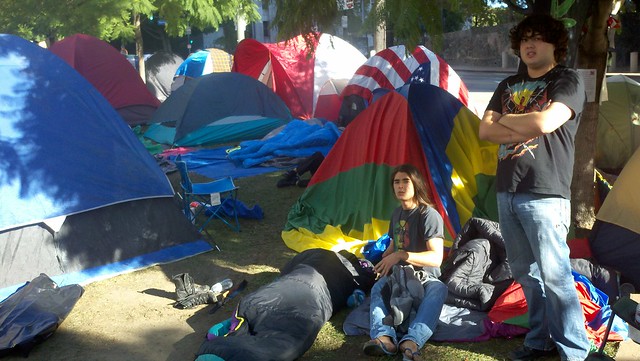
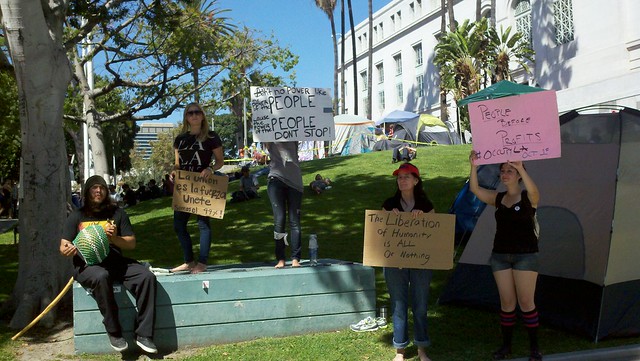
Saturday was a huge day here as Occupy Los Angeles enters it's second week. It began last Saturday with a spirited march of over a thousand people from Pershing Sq. to City Hall. At city hall they pitched tents on the larger south lawn and held the first General Assembly of the occupation. As last weekend moved into the week days they were obliged to move from the south lawn to the smaller north lawn to make room for a movie shoot followed by a farmers market. This actually proved to be fortuitous because the small area made it look like more people than it did in the larger space but by Friday the north lawn was crowded with more than 120 tents and the occupation was running out of room. On Saturday they knew that they could move back to the north lawn but that didn't mean giving up the south lawn so now they have city hall surrounded with more than 60 tents already on the north lawn with no apparent diminution of the number on the north lawn.
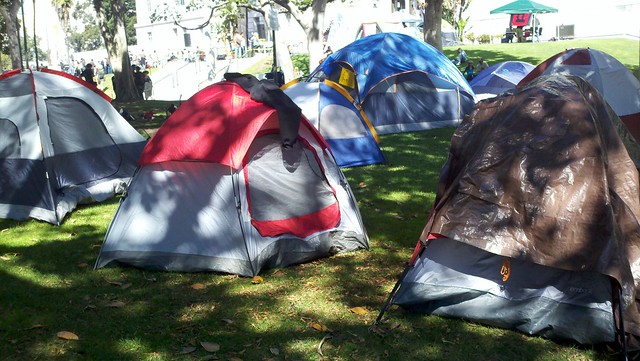
Occupy Los Angeles made the news on on the very first day because the tactic of stonewalling Occupy Wall St. was running out of time and the bust of seven hundred protesters on the Brooklyn Bridge gave them a story they could run with, but that meant they also had to cover Occupy LA locally from the beginning. After that there has been a steady stream of reporters and TV crews at the encampment.
It has almost gotten to the point where a segment on Occupy LA was required for a comprehensive local news broadcast and national news has also been obliged to cover the protest. This has meant that the movement has gotten a lot of exposure in the greater Los Angeles area, and the response from the public has been amazing. City hall sit among four heavily traveled intersections and the honking of horns in support has been none stop. Around 5:30, when many committees have scheduled meetings it can reach a level that makes the meetings all but impossible.
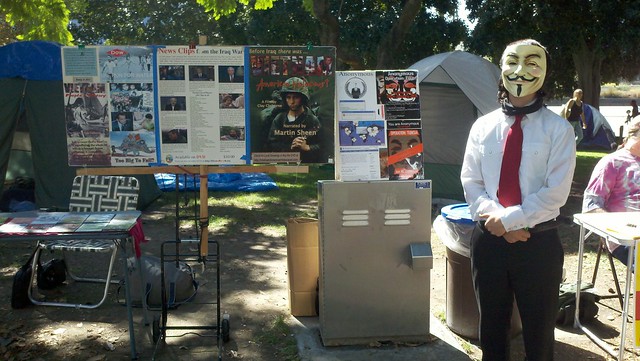
For many working people this Saturday is the first time they have been able to visit what the whole city has been talking about and the occupiers have planned quite a day for them. Saturday is also the first day that the protest is permitted. The lack of permit hasn't stopped us from camping on the grass or using a PA system to expedite the larger meeting but they have moved to the sidewalk at night as requested by the police, but the permit does allow them to get serious about amplified sound and music.
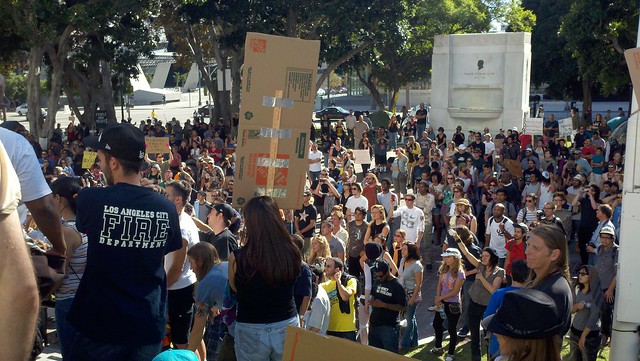
That allowed for musical concerts on the south steps of city hall in the afternoon, the highlight of which was a concert by Tom Morello of Rage Against the Machine.
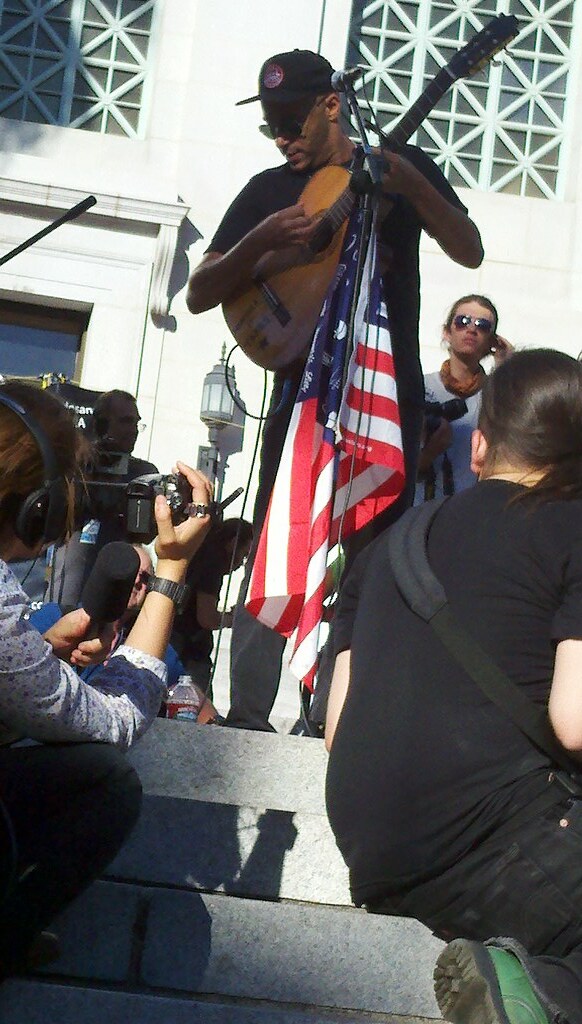
Before that Margret Prescott of KPFK introduced Danny Glover and friends.
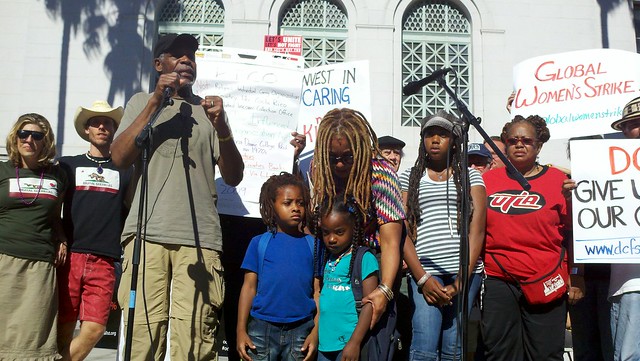
Danny Glover gave a rousing speech that had the crowd cheering, a crowd that had grown to several thousands by then.
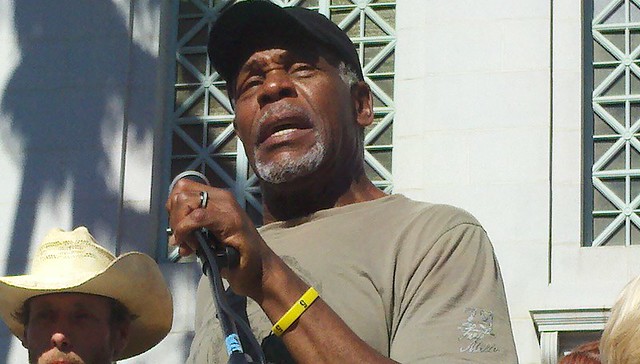
But the biggest event of this Saturday was the biggest General Assembly that Occupy Los Angeles has had to date. The result of all the work and struggle that has gone to refining the process in the last twelve Gas was tested tonight.
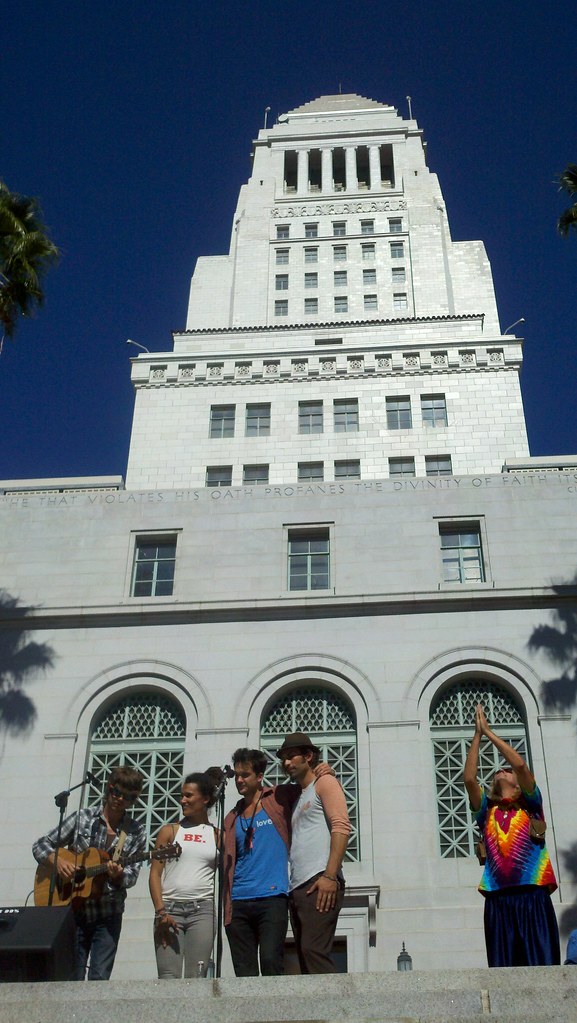
2011-10-10 Egyptian army clashes with Christian protesters: at least 24 dead and hundreds wounded
A real massacre took place yesterday at Maspiro district of downtown Cairo. There at least 24 dead and 300 wounded as the army attacked a demonstration of Copts (native Egyptian Christians), who were protesting after another one of their churches was burnt down in Assawn. The community demands accountability for those responsible of yet another intolerant attack against them. They are also aware that the authorities did not do anything to protect the church, although they were warned about the threat of violence.
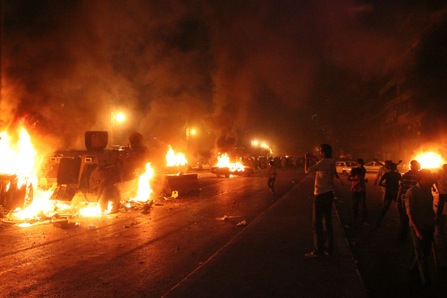
The march started out peacefully, however, according to Al-Jazeera, anonymous people started pelting them with rocks and other objects from windows above. Tension rose gradually until a fight broke out upon reaching the location of the State TV. The army responded brutally: hundreds of shots were fired and tanks stormed into the heart of the demonstration. Two of these, along with other vehicles, were set on fire, with both sides sustaining injuries. The reports that many were killed after being deliberately run over by army vehicles are confirmed by this video:
There are also reports that later on, the riots continued around Tahrir square, where many young people (both Christians and Muslims) who were around Borsa district joined the Copts in their fighting against the army and the old Mubarak ‘thugs’ (civilian criminals who help security forces against protesters). At this point the spontaneous demonstration is reported to have chanted: "Christians and Muslim united".
In an interview with Hossam Bahgat, the founder and director of the Egyptian Initiative for Personal Rights, he confirms the unprecedented fact that there were many Muslims present from the beginning in a gesture of solidarity. He also seems to suggest that yesterday's events might be a turning point for the political life of Egypt. It is the first time that the army commits such a massacre. Until now it was police, representative of the Ministry of Interior, who were responsible for acts of violence. This might be a sign that the revolution of January 25 is at its decisive point: either the popular movement will be able to impose a real civil democracy, or the ruling Supreme Command of Armed Forces (SCAF) will find a way to close the independent space opened in Tahrir square. This is worsened by the fact that many believe the army is trying to promote chaos in order to legitimize its intervention and the freezing of the democratic revolutionary process. As some suggest, the SCAF has definitely lost it’s credibility as ‘guardian of the revolution’, who wanted to assure a peaceful democratic transition, after actively engaging in violence against the population.
2011-10-10 Trojan analyzed by the CCC was deployed by Bavarian authorities [Update 3]
According to Spiegel, the Bavarian minister of interior affairs Joachim Herrmann (CSU) has now confirmed that software recently analyzed by the Chaos Computer Club indeed originated from the police in the Southern German state. He was, however unable to confirm whether this exact model had been used. A spokesperson for Bavarian state police confirmed that online surveillance software had been used, but added that all potentially illegal system components had been removed beforehand. She was, however, unable to confirm that the exact specimen obtained by the CCC was used by her agency.
A lawyer acting for Digitask, a small company based in rural Hesse, stated that the software had "most likely" been produced by his client. He also added that the company had been in negotiations with Bavaria since 2007.
On its website, the company confirms to work for the authorities:
"Wir sind ein führendes Unternehmen für die systemintegrierte Realisierung von Datenerhebungs- und Bewertungssystemen im Bereich der Telekommunikation. Firmen und Sicherheitsbehörden aus dem In- und Ausland zählen zu unseren Kunden."
"We are a leading company for system integrated realization of data collection and (data) assessment in the field of telecommunications. Companies and security agencies, on a national and international level, are amongst our customers."
German federal police stated that they did not use this software, adding that the software was freely available on an international basis. Most state police agencies declined to comment; North Rhine Westphalia said they did not use this software; Lower Saxony stated they used a different type of software twice; Rhineland Palatinate said they used surveillance software in one instance, which had been supplied by another agency.
These new developments once again support the assumption that documents published by the Pirate Party in 2008 are in fact genuine. They contain an offer for surveillance software, along with a directive that the costs for this software (as supplied by Digitask) should be covered by the police, rather than the prosecutors.
Shortly after these documents appeared on the internet, the home of the spokesperson of the Pirate Party was raided, which, according to the Bavarian branch of the party, confirmed the authenticity of these documents.
UPDATE:
Fefe reports that a number of government agencies purchased Digitask products. He also hints at an old corruption case involving Digitask associate Reuter Electronic (the CEO of this company was sentenced to 21 months suspended sentence, and was fined 1,5 million Euro). Both companies are based in the same small town.
According to its company website, Reuter Electronic specializes in "Schweißtechnik, Regeltechnik, Sicherheitstechnik, Telekommunikation" - "welding, control technology, security technology and telecommunications".
UPDATE 2:
Wikileaks published a translation of the document obtained by the Pirate Party. See also this link.
UPDATE 3:
According to a lawyer acting for the person on whose computer the trojan was discovered, the software was placed there by Bavarian customs officials during a search at Munich airport.
2011-10-11 Boston Police Assault #OccupyBoston arresting around one hundred protesters
At 1:30 this morning police in full riot gear attacked the participants of Occupy Boston, which had peacefully gathered on the Rose Kennedy Greenway. Without any regard for the protester's constitutional rights, the Boston Police Department made no distinction between protesters, medics, or legal observers, arresting legal observer Ursula Levelt, who serves on the steering committee for the National Lawyers Guild, as well as four medics attempting to care for the injured.
Earlier in the day, an estimated ten thousand union members, students, veterans, families, men, and women of all ages marched from the Boston Common to Dewey Square, and then to the North Washington Bridge to demand economic reform on Wall Street and the end of special interest influence in Washington.
Following this massive outpouring of public support, dozens of police vans descended on the Greenway, with batons drawn, assaulting protesters and arresting more than one-hundred people. Members of Veterans for Peace carrying American flags were pushed to the ground and their flags trampled as the police hauled them away. The movement claims that
Later on, Boston Police Commissioner Ed Davis made no mention of veterans, organized labor, students, or families, nor did he issue an apology for his department’s aggressive tactics. The official website for the movement states that, "since the beginning of the occupation, Occupy Boston has worked tirelessly and successfully to maintain a positive working relationship with city officials. Today’s reprehensible attack by the Boston Police Department against a movement that enjoys the broad support of the American people
represents a sad and disturbing shift away from dialogue and towards violent repression." For the full press release visit this link.

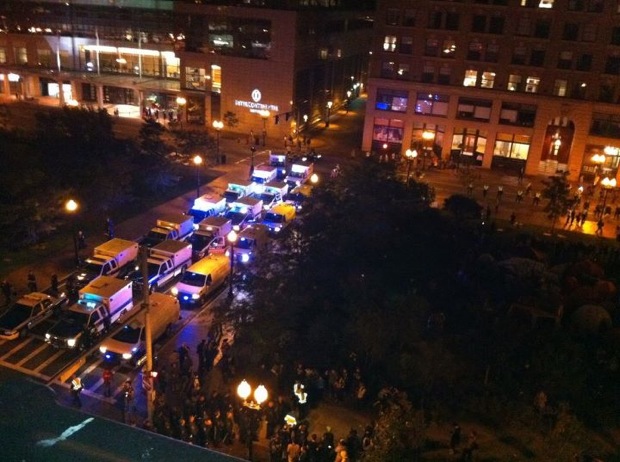
They also claim to bear "no ill-will towards the men and women of the Boston Police Department who were simply following orders." They conclude by inviting anyone who feels solidarity for the cause to join them. A group of specialists from Harvard University has declared that they are "ready to discuss legal representation for Occupy Boston protesters". They also add that: "Our lawyers, historians, economists, linguists, political scientists, doctors, mathematicians, designers, artists, environmental scientists, educators, ministers, and sheer organizers are standing by to help give voice to those who need it at this moment in time. We are particularly interested in requests for specific policy proposals from occupations."
2011-10-11 Žižek at Wall Street: “don’t fall in love with yourself” #occupywallstreet #ows
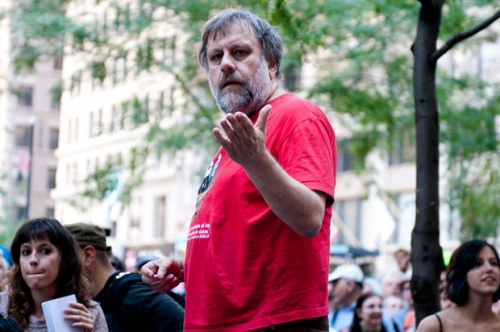
“We’re not dreamers. We’re awaking from a dream turning into a nightmare. We’re not destroying anything. We’re watching the system destroy itself.”
Via Occupy Wall Street andImpose Magazine
— TRANSCRIPT —
We are all losers, but the true losers are down there on Wall Street. They were bailed out by billions of our money. We are called socialists, but here there is always socialism for the rich. They say we don’t respect private property, but in the 2008 financial crash-down more hard-earned private property was destroyed than if all of us here were to be destroying it night and day for weeks. They tell you we are dreamers. The true dreamers are those who think things can go on indefinitely the way they are. We are not dreamers. We are the awakening from a dream that is turning into a nightmare.
We are not destroying anything. We are only witnessing how the system is destroying itself. We all know the classic scene from cartoons. The cat reaches a precipice but it goes on walking, ignoring the fact that there is nothing beneath this ground. Only when it looks down and notices it, it falls down. This is what we are doing here. We are telling the guys there on Wall Street, “Hey, look down!”
In mid-April 2011, the Chinese government prohibited on TV, films, and novels all stories that contain alternate reality or time travel. This is a good sign for China. These people still dream about alternatives, so you have to prohibit this dreaming. Here, we don’t need a prohibition because the ruling system has even oppressed our capacity to dream. Look at the movies that we see all the time. It’s easy to imagine the end of the world. An asteroid destroying all life and so on. But you cannot imagine the end of capitalism.
So what are we doing here? Let me tell you a wonderful, old joke from Communist times. A guy was sent from East Germany to work in Siberia. He knew his mail would be read by censors, so he told his friends: “Let’s establish a code. If a letter you get from me is written in blue ink, it is true what I say. If it is written in red ink, it is false.” After a month, his friends get the first letter. Everything is in blue. It says, this letter: “Everything is wonderful here. Stores are full of good food. Movie theatres show good films from the west. Apartments are large and luxurious. The only thing you cannot buy is red ink.” This is how we live. We have all the freedoms we want. But what we are missing is red ink: the language to articulate our non-freedom. The way we are taught to speak about freedom— war on terror and so on—falsifies freedom. And this is what you are doing here. You are giving all of us red ink.

There is a danger. Don’t fall in love with yourselves. We have a nice time here. But remember, carnivals come cheap. What matters is the day after, when we will have to return to normal lives. Will there be any changes then? I don’t want you to remember these days, you know, like “Oh. we were young and it was beautiful.” Remember that our basic message is “We are allowed to think about alternatives.” If the broom [?] is broken, we do not live in the best possible world. But there is a long road ahead. There are truly difficult questions that confront us. We know what we do not want. But what do we want? What social organization can replace capitalism? What type of new leaders do we want?

Remember. The problem is not corruption or greed. The problem is the system. It forces you to be corrupt. Beware not only of the enemies, but also of false friends who are already working to dilute this process. In the same way you get coffee without caffeine, beer without alcohol, ice cream without fat, they will try to make this into a harmless, moral protest. A decaffeinated process. But the reason we are here is that we have had enough of a world where, to recycle Coke cans, to give a couple of dollars for charity, or to buy a Starbucks cappuccino where 1% goes to third world starving children is enough to make us feel good. After outsourcing work and torture, after marriage agencies are now outsourcing our love life, we can see that for a long time, we allow our political engagement also to be outsourced. We want it back.

We are not Communists if Communism means a system which collapsed in 1990. Remember that today those Communists are the most efficient, ruthless Capitalists. In China today, we have Capitalism which is even more dynamic than your American Capitalism, but doesn’t need democracy. Which means when you criticize Capitalism, don’t allow yourself to be blackmailed that you are against democracy. The marriage between democracy and Capitalism is over. The change is possible.
What do we perceive today as possible? Just follow the media. On the one hand, in technology and sexuality, everything seems to be possible. You can travel to the moon, you can become immortal by biogenetics, you can have sex with animals or whatever, but look at the field of society and economy. There, almost everything is considered impossible. You want to raise taxes by little bit for the rich. They tell you it’s impossible. We lose competitivity. You want more money for health care, they tell you, “Impossible, this means totalitarian state.” There’s something wrong in the world, where you are promised to be immortal but cannot spend a little bit more for healthcare. Maybe we need to set our priorities straight here. We don’t want higher standard of living. We want a better standard of living. The only sense in which we are Communists is that we care for the commons. The commons of nature. The commons of privatized by intellectual property. The commons of bio-genetics. For this, and only for this, we should fight.

Communism failed absolutely, but the problems of the commons are here. They are telling you we are not American here. But the conservatives fundamentalists who claim they really are American have to be reminded of something: What is Christianity? It’s the holy spirit. What is the holy spirit? It’s an egalitarian community of believers who are linked by love for each other, and who only have their own freedom and responsibility to do it. In this sense, the holy spirit is here now. And down there on Wall Street, there are pagans who are worshiping blasphemous idols. So all we need is patience. The only thing I’m afraid of is that we will someday just go home and then we will meet once a year, drinking beer, and nostalgically remembering “What a nice time we had here.” Promise yourselves that this will not be the case. We know that people often desire something but do not really want it. Don’t be afraid to really want what you desire. Thank you very much.
— END OF TRANSCRIPT —
2011-10-12 A call to the Army of Love and to the Army of Software
By Franco Berardi and Geert Lovink
October 2011. The fight opposing financial dictatorship is erupting.
The so-called ‘financial markets’ and their cynical services are destroying the very foundations of social civilization. The legacy of the postwar compromise between the working class and progressive bourgeoisie has all but disappeared. Neoliberal policies are cutting back education and the public health system and is cancelling the right to a salary and a pension. The outcome will be impoverishment of large parts of the population, a growing precarity of labor conditions (freelance, short-term contracts, periods of unemployment) and daily humiliation of workers. The yet to be seen effect of the financial crisis will be violence, as people conjure up scapegoats in order to vent their rage. Ethnic cleansing, civil war, obliteration of democracy. This is a system we call financial Nazism: FINAZISM.
Right now people are fighting back in many places, and in many ways. Occupy Wall Street inspired a mass mobilization in New York that is extending across the USA every day. In Greece workers and students are squatting Syntagma square and protesting against the blackmail by the European Central Bank, which is devastating the country. Cairo, Madrid, Tel Aviv, the list of the ‘movements of the squares’ is proliferating. On October 15 cities across the globe will amass with people protesting against the systemic robbery.
Will our demonstrations and occupations stop the Finazist machine? They will not. Resistance will not resist, and our fight will not stop the legal crimes. Let’s be frank, we will not persuade our enemies to end their predatory attacks (‘let’s make even more profit from the next downfall’) for the simple reason that our enemies are not human beings. They are machines. Yes, human beings – corporate managers, stock owners, traders – are cashing the money that we are losing, and prey upon resources that workers produce. Politicians sign laws that deliver the lives of millions of people to the Almighty God of the Market.
Bankers and investors are not the real decision makers, they are participants in an economy of gestural confusion. The real process of predatory power has become automated. The transfer of resources and wealth from those who produce to those who do nothing except oversee the abstract patterns of financial transactions is embedded in the machine, in the software that governs the machine. Forget about governments and party politics. Those puppets who pretend to be leaders are talking nonsense. The paternalistic options they offer around ‘austerity measures’ underscore a rampant cynicism internal to party politics: they all know they lost the power to model finance capitalism years ago. Needless to say, the political class are anxious to perform the act of control and sacrifice social resources of the future in the form of budget cuts in order to ‘satisfy the markets’. Stop listening to them, stop voting for them, stop hoping and cursing them. They are just pimps, and politics is dead.
What should we do? Living with the Finazist violence, bending to the arrogance of algorithms, accepting growing exploitation and declining salaries? Nope. Let’s fight against Finazism because it is never too late. At the moment Finazism is winning for two reasons. First, because we have lost the pleasure of being together. Thirty years of precariousness and competition have destroyed social solidarity. Media virtualization has destroyed the empathy among bodies, the pleasure of touching each other, and the pleasure of living in urban spaces. We have lost the pleasure of love, because too much time is devoted to work and virtual exchange. The large army of lovers have to wake up. Second, because our intelligence has been submitted to algorithmic power in exchange for a handful of money and a virtual life. For a salary that is miserable when compared to the profits of the corporate bosses, a small army of ‘softwarists’ are accepting the task of destroying human dignity and justice. The small army of software programmers have to wake up.
There is only a way to awake the lover that is hidden in our paralyzed, frightened and frail virtualized bodies. There is only a way to awake the human being that is hidden in the miserable daily life of the softwarist: take to the streets and fight. Burning banks is useless, as real power is not in the physical buildings, but in the abstract connection between numbers, algorithms and information. But occupying banks is good as a starting point for the long-lasting process of dismantling and rewriting the techno-linguistic automatons enslaving all of us. This is the only politics that counts. Some say that the Occupy Wall Street movement lacks clear demands and an agenda. This remark is ridiculous. As in the case of all social movements the political backgrounds and motives are diverse, even diffuse and quite frequently contradictory. The occupation movement would not be better off with more realistic demands.
What is thrilling right now is the multiplicity of new connections and commitment. But what is even more exciting is finding ways that can set in motion the collective ‘exodus’ from the capitalist agony. Let’s not talk about the ‘sustainability’ of the movement. That’s boring. Everything is transient. These fast-burning events do not help us to overcome the daily depression. Occupying the squares and other public spaces is a way to respond to the short duration of the demonstrations and marches. We are here to stay.
We are not demanding a reform of the global financial system or the ECB. The return to national currencies of the past, as requested by the rightwing populists, will not make ordinary citizens less vulnerable to currency speculation. A return to state sovereignty is not the solution either, and many people already sense this. The demand for more ‘intervention’, control and oversight of markets is a hopeless gesture. The real issue is that humans are no longer in charge. We need to dismantle the machines themselves. This can be done in a very peaceful manner. Hack into their system, publish their crimes through Wikileaks-type initiatives and then delete their real-time trading killing networks for good.
Financial markets are all about the politics of speed and deterritorialization. But we know their architectures and vulnerabilities. The financial world has lost its legitimacy. There is no global consensus anymore that the ‘market’ is always right. And this is our chance to act. The movement has to respond at this level. Decommissioning and re-programming financial software is not the dream of a Luddite sabotaging the machine. ‘Market regulation’ will not do the job, only autonomy and the self-organization of software workers can dismantle the predatory algorithms and create self-empowering software for society.
The general intellect and the erotic social body have to meet on the streets and squares, and united they will break the Finazist chains.
2011-10-12 Hollywood Megastars guarded by Bulgarian Mega Mafia
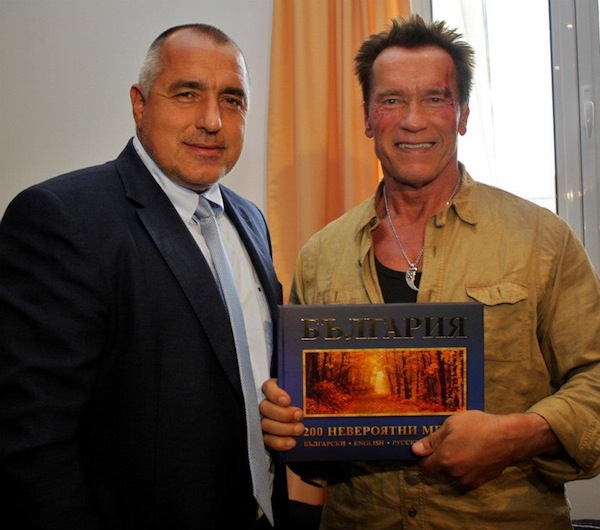
Movie stars Arnold Schwarzenegger, Sylvester Stallone, Chuck Norris, Bruce Willis and Jason Statham are actually in Bulgaria for the shooting of the "The Expendables 2" at the Nu Boyana Film Studios.
Bodyguard services are provided by a Bulgarian security firm connected to the most powerful local organized crime group TIM, according to secret cables sent from the US Embassy in Sofia and published by Wikileaks.
Pictures taken during Schwarzenegger's arrival at the Sofia International Airport, published in Bulgarian media, show a Mercedes SUV, waiting for the actor, with license plate C4401XA, registered to a company owned by the Varna-based TIM and commonly used by the TIM boss Ivo Kamenov. According to unconfirmed reports, the SUV is armored to the 7b level, which is very rare in Bulgaria.
Another picture portrays kick boxer Todor Todorov standing close to Schwarzenegger. Todorov is a competitor of the TIM sports club and a bodyguard, employed by the Sark Group company, founded in 2004 by the former chief of security of TIM boss Marin Mitev.
The security activities of TIM are spread among several firms with the most popular one being TIM EOOD, offering VIP security services in Bulgaria and abroad, according to the official internet page tim.bg.
The Nu Boyana studios, contacted by bivol.bg, have declined giving information about the company providing security for Hollywood stars, shooting in Sofia, and in particular for Schwarzenegger.
TIM - "The up-and-coming star of Bulgarian organized crime"
In a diplomatic cable from 2005, TIM is called by former US Ambassador in Sofia, James Pardew "The up-and-coming star of Bulgarian organized crime".
This cable exposing the Bulgarian organized crime is an interesting case in the Cablegate, as it was first published by The Guardian heavily edited. Investigative journalist David Leigh commented in the WLCentral site, that the informations about the individuals exposed in the cable "were vetted by our libel lawyers".
"As an organized crime group, TIM is involved in a wide range of criminal activities, including extortion and racketeering, intimidation, prostitution, gambling, narcotics trafficking, car theft, and trafficking in stolen automobiles."- Ambassador Pardew wrote in the cable addressed to the State Department and the CIA. [05SOFIA1207]
Six years later the TIM star rised up to become the most powerfull and "most modern form of organized crime", according to the investigative German journalist, Jurgen Roth.
Information about the TIM group is also heavily vetted in the mainstream Bulgarian media, as the bosses are known to react nervously to any publication mentioning them. "If it comes from foreign media, we might publish the translation" - one media outlet editor told Bivol.
The Terminator meets the Bulgarian Batman
Meanwhile, on Monday, Bulgarian Prime Minister Boyko Borisov visited the Nu Boyana Film Studios to meet Schwarzenegger.
"I am very happy to be in Bulgaria and that we have such good relations" - Schwarzenegger said. According to media reports, he even invited Borissov to have a part in the The Expendables 2 movie, but the Prime Minister declined with a joke, referring to his Prime Minister duties.
Borissov role as a though guy in the Hollywood superproduction would sound natural according to another American diplomatic cables, where he's described as "Batman" and "Armani clad though guy", with close ties to the Bulgarian organized crime
"Accusations in years past have linked Borisov to oil-siphoning scandals, illegal deals involving LUKoil and major traffic in methamphetamines." - US Ambassador Bayerle wrote in 2006. According to the cable, "Borisov is alleged to have used his former position as head of Bulgarian law enforcement to arrange cover for criminal deals, and his common-law wife, Tsvetelina Borislavova, manages a large Bulgarian bank that has been accused of laundering money for organized criminal groups, as well as for Borisov's own illegal transactions." [06SOFIA647]
Borissov and TIM had common business in the past. In 1996 he shared with the TIM leader Ivo Kamenov ownership of an illegal factory producing cigarettes, documents discovered by Bivol showed.
TIM remains among the "untouchables" in Bulgaria, and despite their reputation and foreign intelligence reports the group was never investigated by the authorities. The business empire built by Kamenov and Mitev continues to grow and reputable Western firms like Lufthansa and Fraport are running common business with them.
"After all, it's quite logical that the bodyguards for such a star are from TIM. If they were protected by the Bulgarian police it would be much less secure." - popular blogger Komitatacommented bitterly.
2011-10-12 Los Angeles City Council votes support for #OccupyLA
Contradicting the trend in New York, Boston, Washington, DC and other cities where the growing occupation movement has been met by official hostility and police violence, today, on the twelfth day of the people's encampment at Los Angeles city hall in opposition to the domination of the big banks and in support of Occupy Wall St., the Los Angeles City Council passed a resolution to promote responsible banking by the City of Los Angeles and in support of Occupy Los Angeles.
The resolution with the title "First Amendment Rights / Occupy Los Angeles / Responsible Banking Measure" was sponsored by Richard Alarcon and Bill Rosendahl and was seconded by five other councilpersons, virtually assuring it of passage.
The agenda item for this read as follows:
09-0234-S1
CONSIDERATION OF RESOLUTION (ALARCON - ROSENDAHL - ET AL.) relative to the City's position to support the First Amendment Rights carried out by “Occupy Los Angeles” and addressing concerns regarding the Responsible Banking measure.
Recommendation for Council action, SUBJECT TO THE CONCURRENCE OF THE MAYOR: ADOPT the accompanying RESOLUTION to SUPPORT the continuation of the peaceful and vibrant exercise in First Amendment Rights carried out by "Occupy Los Angeles" and URGE the City Departments responsible for completing the implementation plan associated with the Responsible Banking measure (Council file No. 09-0234) that was approved by the Council on March 5, 2010, which would address some of the concerns of the "Occupy Los Angeles" demonstrators by demanding accountability and results from the Banks we invest taxpayer dollars in, to bring the Responsible Banking measure for a final vote to the Council by October 28, 2011
After dozens of public comments by members of Occupy LA including me and other citizens, the endorsement of many City Counclpersons, and the haggling over the date for the final vote on the banking measure, the council passed the resolution by a vote of 11 to 0 with a couple members abstaining.
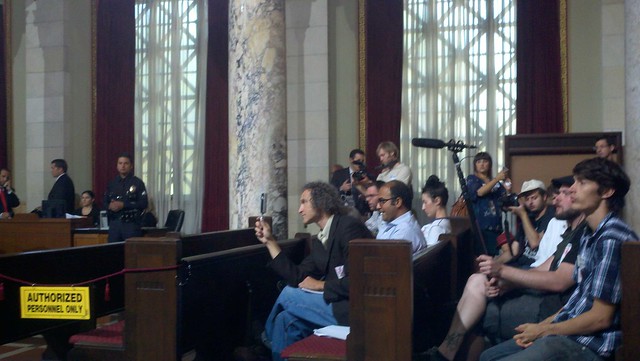
Occupy Los Angeles has been rather unique in that as compare to the other big city occupations, it was won a high degree of acceptance by the city and hasn't been plagued by the hostility of the LAPD. This has allowed the encampment to develop as a peaceful place where a certain level of permanency and organizations has been able to develop.
Occupy Los Angeles now takes up all the lawns of city hall, north, south and west, although we will free up the south lawn for the farmers market on Thursday, and we no longer move from the lawn to the sidewalk at night. The last time we did that we occupied all the sidewalk on four sides of city hall and then some. Now with 300 tents and counting, it's simply impossible.
This permanency has allowed a certain order to merge. On the inside north lawn, the food tent, welcome tent, donations tent and library stand where they have been for a week. On the other side of the stairs you'll find the medic's tent, and the media tents, and the generators buzzing behind are being replace by solar panels. The north stairs is where we used to hold general assemblies. Now those have moved to the larger south stairs with the bigger PA system. This is where Danny Glover spoke and Tom Morello played last week. But the north stair now has it's own PA and operates as a kind of axillary stage with music and free speech all day. There is also a lunchtime speaker series. Today it was NY Times best selling author Marianne Williamson. The north lawn is crowded and somewhat chaotic, it already has the character of an older community. The south lawn is like the suburbs more ordered and with room for a couple hundred more tents.
In spite of this resolutions passage today some senior officers of the LAPD are rumored to be uncomfortable with the current arrangement, so while this peace with the city may not be a permanent peace, it is good while it lasts because that plus the mainstream media coverage Occupy LA has received from day one has furthered an incredible growth of the occupation movement in Los Angeles.
When Sarah Brennan from Richard Alarcon's office first contacted me on September 30th, the day before the occupation began, it was to promote his responsible banking measure. They called me because they didn't know anyone else with Occupy LA. I don't know how they knew me but I had been writing about it.
I told them that the responsible banking measure sounded fine but that where we really needed his support was with the LAPD. At that time the police were saying that we couldn't sleep on the grass and we couldn't sleep on the sidewalk. I said Saturday night we are going to have 300 plus people with tents and sleeping bags planning to sleep somewhere and none of us can do anything about that now.
I told them our fight was with Wall St. not city hall or the LAPD and to please don't make it about that. Please find a safe way we can exercise or first amendment rights and camp out at city hall. Then I called my own Councilperson, Bill Rosendahl, talked to Arturo Pina in his office and gave him the same pitch. I also put both offices in touch with Mario Britok and Cheryl and others from Occupy Los Angeles who were already at city council talking to members.
A meeting between the LAPD, the city attorney and city council staff went very late that Friday but the result was a "legal" occupation in which we have been able to march and stay on city property even though initially we had no permit to do so. While there have been several dozen arrests for civil disobedience at our actions, in the 12 days since then we began, there have been no arrests at Occupy LA.
Today the city council resolution put a kind of official seal on what we have already established on the ground.
I have been explaining the advantages of this situation to some of the younger revolutionaries among us who can't wait for action with the police by using the example of the phenomenon of "legal" Marxism that V.I. Lenin spoke of in turn of the century Russia. One of the best things about Occupy LA is that there is a lot of time to talk.
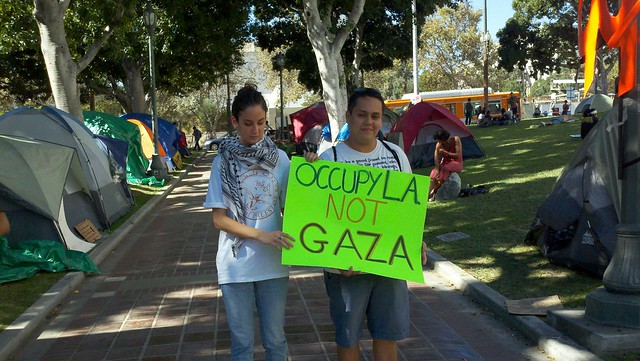
2011-10-14 A brief history of the 15th of October: where it comes from, what it means and the future of the global uprising
The past 17th of September the world assisted almost unknowingly to the first taste of the new global protest of our time. Initially this was the date marked as the beginning of the Occupy Wall St. movement (now a nationwide phenomenon), however it also served to launch an international campaign of protests in front of local banks and stock exchanges dubbed as 'Antibanks Day'. For the first time, the rising global civil movement, based on democratic assemblies and structured around an ever-growing network of activists, tested its capacity to rally people worldwide and not only in a national framework. They created task-forces for media strategies, both online and offline, set up independent live-streams and coordinated globally for spreading information. Consequently, the start of Occupy Wall Street was used as an excuse by activists everywhere to prepare for the worldwide protest on October 15th, which will be the consolidation of this structure, and will set the standard for it's future success or failure.
It may be objected that this has already happened before, for example, during the massive worldwide demonstrations against the invasion of Iraq in 2003. According to some calculations from six to ten million people attended in over sixty countries during a couple of months. They were directed, however, towards a clear goal: to put an end to the obvious injustice being perpetrated against the people of Iraq and Afghanistan, an injustice which is even more obvious from our current perspective. It was an honorable cause, way past the traditional left/right political spectrum and with a deeply rooted human element, making it easy for people to identify with.
The upcoming 15th of October, on the other hand, is made up of millions of individual claims and proposals, maybe even as many as there are people who will march. The chosen slogan 'United for Global Change' serves the purpose of demonstrating that it is the global civil society, conscious as ever of its power, that is acting to reclaim its right to guide a system that is crumbling on top of it. It also works to assert the "think global, act local" catchphrase: according to the most up-to-date source there will be simultaneous demonstrations and occupations in over 80 countries, more than 900 cities, and each one will have it's own theme or proposal, be it the privatization of Universities in Chile, the continuation of nuclear energy projects in Japan after the catastrophe at Fukushima, corporate greed in the U.S., widespread corruption and the destruction of the welfare state in Greece, Spain and the UK, or the worsening deforestation of the Amazon in Brazil.
All of these different issues are a reaction to the same process, which can be loosely defined as an appropriation of politics worldwide via deregulatory financial practices, as well as a model for state administration based on market logic. These are the key ingredients of the globalized financial market, created in the 90s through the new application of economic neoliberal ideas by world leaders, regardless, for the first time, of their classical political orientation. At the same time, people around the world are waking up to the fact that there is no mechanism for a democratic control of these institutions, private and public. Political figures, who should be watching over their citizens' well being, are poisoned by private interest, lobbying, campaign financing and pressure from powerful non-democratic institutions such as the IMF or the European Central Bank - the case of Greece is particularly illustrative of this last point-.
The financial collapse of 2008 is a corollary of this process. It was openly caused by an out-of-control banking sector, and it has cost millions of people their savings and quality of life, while simultaneously producing million dollar bonuses for the elite of that same banking sector. Not one corrupt banker in the U.S. has done jail time, while at the same time thousands of protesters exercising their rights in demanding responsibility have had to face tear gas, batons and handcuffs. And this isn't all: as the system is once again melting down, this time in the European markets, citizens are quite rationally demanding accountability. They understand costs have been socialized and the benefits privatized, and that this will happen again in the near future. This means that every day the gap between poor and rich is widening, and not only in a global framework; inside developed countries such as the U.S. and the UK the gap has never been larger. The people stuck in this gap are now a largely precarious middle class, forced to work temporary contracts or underpaid jobs without a hope of being able to own commodities such as home or an automobile. These are only a few examples that explain the understandable indignation of the population. There are countless others: austerity versus millions spent in warfare, out-of-control environmental destruction or avoidable famine and poverty, again just to mention a few general cases.
They also serve to prove that in our extremely interconnected global society, the contradictions and inequality of the capitalist system have never been so exposed. Every day they are harder to hide. Given the actual context, a reference to Wikileaks is inevitable. The crucial year of 2011 cannot be understood without taking into account 'Cablegate', the 251,000 document cache leaked from the U.S. Diplomatic Service, which has shown the world the raw truth behind government practice. When finally revealed the picture was definitely not pretty, in fact it seemed to confirm the worst forecasts. The barely legal persecution of the organization and alleged leaker Bradley Manning has only served to confirm their own credo: governments and corporations are afraid of the truth, they are afraid of transparency, because corruption is so widespread that the realization of this might just wake up democratic feelings among the population strong enough to put a end to it.
So yes, citizens know how their governments are acting behind their backs, they know who is too big to be jailed, they know how the system is run and for who. What is more, they know that these facts are now self explanatory and blatantly obvious. And worst of all, most countries reaction to symptoms of dissent has been the systematic abuse of citizens voicing their discontent; the same images have been repeated across the globe: unarmed protesters being killed in Tunis and Egypt, severely beaten up in Spain, tear-gassed in Greece and massively arrested in the U.S. Citizens being abused has been the common note in most protests, it seems to be more of a root cause than an effect.
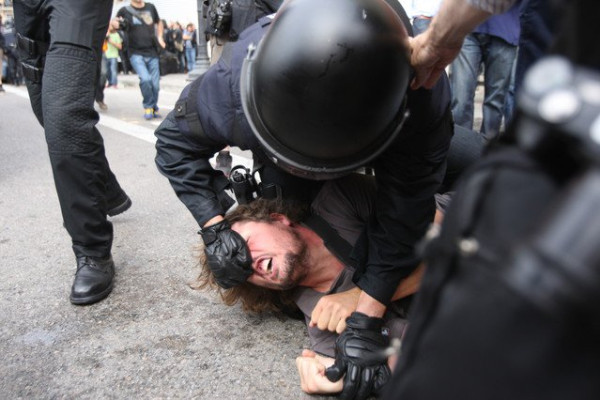
This myriad of reasons, so complicated that it can only be summarized through feelings such as 'rage', is what is behind the protest of the 15th. This is exactly why what will happen after is what is truly important. It is fairly easy to evoke these feelings and turn them into public demonstrations of discontent; it is a far subtler work, however, to find answers through concrete policies and reform. In other words, it is not about the day everyone is on the streets, it is about what will be done about the issues during the following weeks and months. For example, the 2003 anti-war protests did not serve their purpose and world leaders continued paying little attention and as of 2011 the allied military powers are still in Afghanistan and Iraq. At the time there were voices that suggested that this form of protest had expired, that it would never work again. This has clearly been contradicted in the last few months, but even so, if the failure is repeated nobody can guarantee civilian participation in these type of events any more.
The change needed is deep and some might even say utopian, it seems clear though, that occupation, assemblies and public demonstrations are in the right direction. The first one serves the very useful purpose of creating central hubs of action, alike to hive minds, where people can work together and develop their skills and purpose in the movement. Public demonstrations challenge the governing authorities face to face and have a high chance of appearing in the media. Assemblies serve as a way to imbue proposals and strategies with a popular legitimacy that is hard to pass by; they also work well to voice the discontent of the largely ignored population. None of them, however, are an answer to the question. They are all definitely useful and necessary but they cannot go on forever without a clearer cut road towards the change everyone is shouting for. For example: nationalization of banks rescued from bankruptcy with public money? Yes, please. But how does theory turn into fact, into a situation better than the one we are in now? This dynamic works for every other proposal that has come up. Solving this gap is the true issue facing this very young civil movement (compare it's age with any other movements of peaceful resistance, such as the African American civil rights movement, for example).
On this point there are many alternatives circulating: creating alternative banking systems handled by individuals, making free spaces for knowledge on the Internet to substitute privatized Universities or building the ideal crowd-sourced citizen media platform to challenge the mainstream. Some have even dared to mention the taboo subject of forming a political party with an international scope, perhaps aiming to create a completely novel system, a fusion of the anachronic representative system with new wiki-technology, real democratic control and participation and a reformist sentiment. This idea will give many the goosebumps, but who knows if it will be necessary further down the road; only then will it finally be seen if corruption lies inside people, or if they are corrupted by the dynamics of power. The 15th of October will be a massive demonstration of public sentiment, it will undoubtedly cause an impact on world leaders, if it will be strong enough for them to reconsider will be seen tomorrow. If not then the hard task of shifting the focus of the whole movement is at hand. In either case the following months will be defining, and are perhaps the most important ones yet.
2011-10-14 Belgian secret police caught severely violating human rights #AgoraBRX #walktobrussels
Watch closely as a policeman in civilian clothing kicks an 18 year old girl in the face while handcuffed, in a clear violation of human rights agreements. Later he elbows her hard on the face, slamming her to the floor. This is only an extract of the full video, which will be published later
The march of the indignants arrived in Brussels on the 7th of October, after over two months of walking. Hundreds of protesters walked from Madrid, Paris and parts of Germany to the European parliament to demand a more participatory democracy and greater equality. Since arriving in Brussels the indignant movement has faced continued police repression and brutality. On October the 8th, 48 people were arrested while peacefully protesting in the central park. Yet authorities were unable to place any charges and all were released 12 hours later.
On October 12th a group of 30 indignants targeted banks in an action protesting corporate greed. The demonstrators entered Dexia Bank, which is on the brink of bankruptcy and is demanding to be rescued, waving signs and chanting “you are responsible” and “we will not pay for your crisis”. The police arrived and began escorting protesters out of the building. Most were allowed to leave and seven were detained, yet one protester, Niki, an eighteen year old female was kicked in the face while handcuffed by a plainclothes policeman:
"We were there peacefully protesting in the bank when a policeman started pushing us. He arrested the girl next to me, and then I was thrown against the wall. At no stage did I resist, but the police officer started pulling my hair and twisting my arm, the pain was so bad I started screaming. He handcuffed me and put me on the floor face down. As I was lying down not moving, he came up and punched me in the face. My head smashed against the ground hard and I felt a sharp pain. My friends tried to ask for his identification number because he wasn’t showing it, but all of the officers wouldn’t give it to us. A few minutes later, I was sitting there in a state of shock with the other arrested people when the same plain clothed police officer came up to me again and kicked me right in the face. I was knocked back to the ground and my face was hurting so much it started to swell up"
The protesters were then dragged out of the bank and released without charge. Nikki was rushed to hospital and treated for facial injuries. As in previous incidences there were multiple reports of police failing to show any identification, as they are required to do by law.
2011-10-14 Bloomberg backs down, occupiers can stay (for now) #OWS #OccupyWallStreet
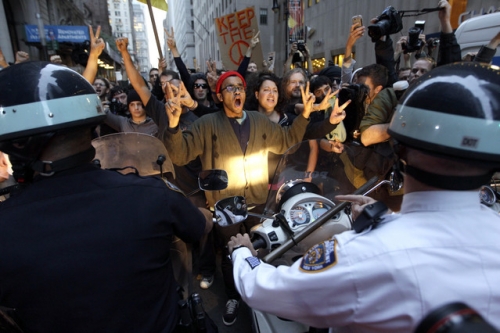 The occupation at Wall Street received good news this morning: after spending the night preparing for eviction, the clean-up order was postponed.
The occupation at Wall Street received good news this morning: after spending the night preparing for eviction, the clean-up order was postponed.
A spectacular piece of news reached the Wall Street occupation on Friday morning: the private owner of Zuccotti Park, which has been the homebase of the movement since the occupation began on September 17, decided to postpone a scheduled cleaning operation of the square. Protesters, who had been bracing for an NYPD-inflicted bloodbath all night, let off an ecstatic cheer upon receiving the news.
Many protesters believe the planned cleaning operation was just a ploy to kick protesters out of the park. If they had left, they would not have been allowed to return with sleeping bags and other camping gear, presumably for feigned reasons of public health and sanitation. In order to counter any claims about the camp’s hygienic situation, the protesters spent most of the night cleaning and tidying up the square.
The private owners of the park, Brookfield Properties, released a statement saying they believed an arrangement could be made with the protesters — and that they were simply too many to be safely removed. Upon hearing the news of the clear-up order, 5,000 protesters had flocked into Zuccotti Park — renamed Liberty Square by the movement — to defend it in case of eviction. All night, debates were held and instructions given on how to peacefully resist eviction.
Upon hearing the news, a small group of ecstatic protesters went on a victory lap towards Wall Street. When they failed to stay on the sidewalks, police moved in with force, deliberately escalating the situation and arresting 14 protesters. When police tried to split up the crowd using scooters, one officer ran over a legal observer — and subsequently beat up him with a nightstick and arrested the innocent and injured man. As the East Vilage reported:
The man was struck with a baton and arrested moments later as witnesses called out, “You ran over his foot” and chanted, “The whole world is watching.” One bystander hurled a bag of trash at police officers as they pushed protestors back onto the sidewalk.
The question, now, is what the next trick of authorities against the movement will be. It is clear that Mayor Bloomberg, who made a fortune selling computer systems to Wall Street, is growing increasingly antsy about the budding anti-capitalist movement at the heart of his capitalist bastion. So while the protesters may have won another battle, the fate of their war still remains undecided.
2011-10-14 Crowd-sourced database for the #15OCT protest launched on the Internet
Submitted by Take the Square
NEWS DATABASE
On the 15th there will be protests in almost 1 thousand cities worldwide. The amount of information that will be generated on the Internet is huge, which is why everyone has to contribute in order to create a crowd-sourced database. This will make it easier for investigators to analyze information later. This (http://bit.ly/n4XiJ0 ) is a link to an interactive document where you can post links to news pieces, photos, videos or your own report.
SPREADING AND SOCIAL NETWORKS
Check http://15october.net/spread-it/ for banners, posters and fliers to print and share on the net. Be active in your own social media accounts and blogs, help sharing information: everyone is a journalist, be the media.
Follow on Facebook http://facebook.com/15octobernet
2011-10-14 Update: AG McClelland responds to 'Compounding the Crimes against David Hicks'
Responding belatedly to my letter of 2011/07/21, the Attorney General Robert McClelland (and therefore the Australian government) have made it clear (yet again) that the David Hicks matter and torture allegations is something to make pious platitudes about but otherwise, they have no desire to do anything else.
Here is the letter:
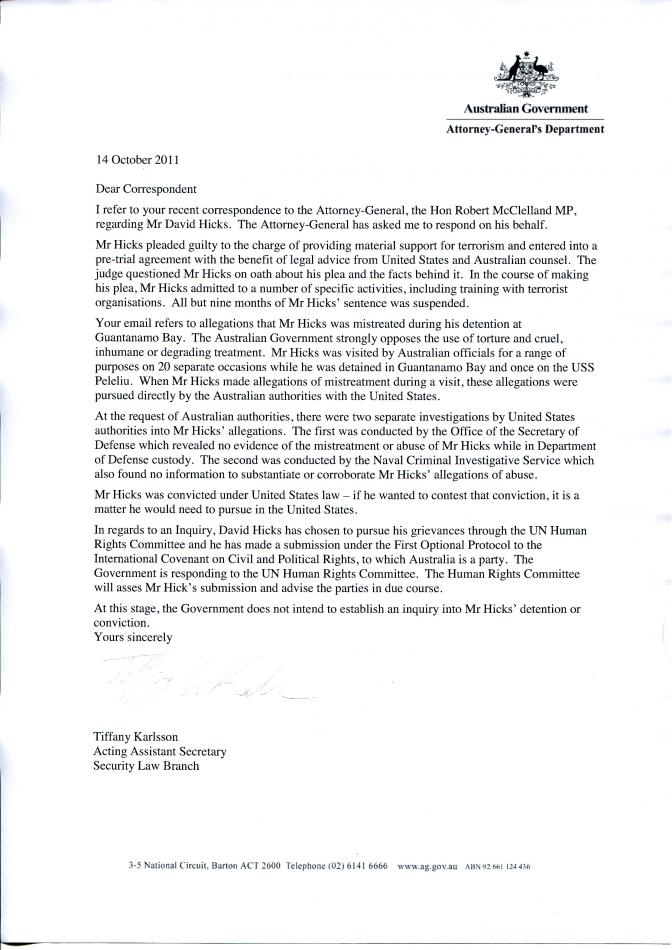
Note the following six points in summary form, made by McClelland's office:
1) Hicks had the advice of US and Australian counsel.
McClelland forgets what he wrote in the Age in July 2003
...we must not lose sight of how alien these military commissions are to Australians' expectations of a fair trial, based on our experience of our own criminal justice system. The processes are chalk and cheese.
Exactly, the process and "system"was flawed and somewhat redolent of Stalin's Show Trials in the 1930s where the methods used to extract the confessions included
...repeated beatings, torture, making prisoners stand or go without sleep for days on end, and threats to arrest and execute the prisoners' families.
As McClelland went on to write:
If tried in Australia, Hicks would be represented by a lawyer of his choice, with a safety net of legal aid. At the military commission, Hicks can retain a US civilian lawyer to assist his US military lawyer, but only if he can afford one.
While on the subject David Hicks legal representatives, what did his Australian lawyer David McLeod think about the matter?
NSW Bar Association publication (Pdf) interview of McLeod*
The military commission process that Hicks was subject to when McLeod was first appointed as his Australian lawyer was, to quote McLeod ‘a complete sham’.
...of course he was tortured. He was detained for over five years without a trial. He was placed in solitary confinement for a prolonged period. He was in a cell for 23 hours a day. He knew that the British detainees and also the other Australian had all been discharged from detention. He went for years without knowing what was going to happen to him. That is torture. It is physical and mental torture.
What was required was not defence lawyers so much as a government who could have - should have - done their duty:
McLeod again:
The government has to show some allegiance and support for its citizens when they are in trouble. The British went in to bat for their nationals. We didn’t. We let our national be the last Western man left in that bloody awful place. A new country ought to believe in itself enough to look after its own.
2) Hicks admitted to the Judge that he trained with terrorist organisations.
This was by the account of Lex Lasry, observer at the proceedings, somewhat orchestrated:
Many of the requisite rules and procedures were not in place and the there was a degree of improvisation by the Judge. This led to a situation where there appeared to be a preference for advancing the case and dealing with matters of substance by way of private conferences between the Judge and the parties. These conferences occurred away from public scrutiny, where no rules were necessary. Issues were resolved and then the outcome was presented to the public as something of a fait accompli. This carries obvious implications for transparency and raises questions regarding due process.
Further, it now appears that at the time that matters were being played out in the Military Commission hearing room on Monday 26 March 2007, the pre trial agreement in relation to Mr. Hicks’ plea of guilty had already been finalised. Thus, much of what was occurring was contrived and being done for public and media consumption. Even Hicks had a speaking role to play which he discharged at the appropriate time.
On the subject of training with a "terrorist organisation"
At the time that David Hicks was undergoing military training in Kashmir and Afghanistan, LeT was not a designated terrorist organisation and the final charge sheet does not suggest that he was a member of al-Qaeda.
3) The Australian government opposes the use of torture and cruel punishment however two US investigations (requested by the Australian government) namely the Office of the Secretary of Defence and the Naval Criminal Investigative Service - found no mistreatment or abuse of Hicks occurred.
That is not surprising. To use an old expression, it was a bit like getting the mafia to do an investigation on organised crime. The investigating bodies were not independent, to say the least.
...approved interrogation techniques that included "removal of clothing" and "inducing stress by use of detainee's fears (e.g. dogs)."
Rumsfeld also approved placing detainees in "stress positions," such as standing for up to 4 hours, though he apparently found this approach unimpressive. Rumsfeld, who works at a stand-up desk, scrawled on the memo, "I stand for 8-10 hours a day. Why is standing limited to four hours? D.R."
One might ask Attorney General McClelland how those "investigations" can be reconciled to the general US policy of abuse and torture as reported (overwhelmingly proven beyond any reasonable doubt even if only on Bush's admissions of approving waterboarding) to have happened to so many others apart from David Hicks.
4) If David Hicks wants to contest his conviction he should do that in the USA.
This is disingenuous as well as being impractical and likely impossible as the Military Commissions 'remit' was in Guantanamo Bay without any appeal rights to US courts that this writer is aware of.
5) An "enquiry" is currently underway with the UN Human Rights Committee ["Communication"] and the Australian government is "responding".
[Senator Ludwig 29/09/11] The government's response to that submission was, I think as correctly outlined, due to be lodged with the Human Rights Commission in May. But this has been delayed until the third quarter of 2011. It is, I am advised, expected to be released very shortly.
6) The Australian government does not intend to conduct an inquiry into Hicks' detention or conviction.
No direct reasons are given, but it is implied that the Communication to the UN is sufficient: it is all round, a huge embarrassment for an Australian government, (client state and lackey some might say) to be asked to investigate the major ally for war crimes/crimes against humanity.
A predictable but highly unsatisfactory response, which avoided all the torture/abuse allegations by saying in essence, "The US investigated itself in this matter and found itself to be exceptionally exonerated."
No comments on the unjust, unfair military commission process; no comments on duress and coercion and the fact that David Hicks was held for so many years without charge.
Disappointing, Mr Attorney General.
Afterthought: No mention at all of the prosecution currently before the Supreme Court of NSW under the Proceeds of Crime Act 2002.
* www.nswbar.asn.au/docs/resources/publications/bn/bn_winter08.pdf
2011-10-15 The Economics of Occupy Wall Street, Part I: The Glass-Steagall Act
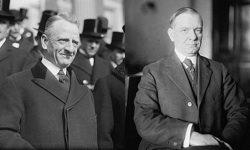 "I believe that banking institutions are more dangerous to our liberties than standing armies. If the American people ever allow private banks to control the issue of their currency, first by inflation, then by deflation, the banks and corporations that will grow up around [the banks] will deprive the people of all property until their children wake-up homeless on the continent their fathers conquered. The issuing power should be taken from the banks and restored to the people, to whom it properly belongs." -- attributed to Thomas Jefferson
"I believe that banking institutions are more dangerous to our liberties than standing armies. If the American people ever allow private banks to control the issue of their currency, first by inflation, then by deflation, the banks and corporations that will grow up around [the banks] will deprive the people of all property until their children wake-up homeless on the continent their fathers conquered. The issuing power should be taken from the banks and restored to the people, to whom it properly belongs." -- attributed to Thomas Jefferson
So far lacking a central spokesperson, the Occupy Wall Street (OWS) movement has not always clearly articulated specifics of its demand for justice through economic reform; even many who support the demonstrations seem unclear as to exactly what the protesters want, and insiders have reported that the demonstrators have yet to arrive on a consensus regarding their platform. Interviews and research, however, reveal a few specific proposals for economic reform that have been suggested among OWS protesters, including: re-instating the Glass-Steagall Act, overturning the Supreme Court's decision in Citizens United, and organizing an Article V Convention to pass amendments to the U.S. Constitution. This post focuses on the Glass-Steagall Act, regulatory legislation that was passed after the 1929 stock market crash and repealed by President Clinton. Many economists identify this repeal and other Clinton-era deregulation measures as the main causes of the current global economic crisis.
Following the 1929 crash that led to the Great Depression, more than 5,000 banks failed, and roughly US$ 7 billion of depositors' money was erased; millions of U.S. citizens lost their homes and life savings. Many blame the crash on stock market speculation by the banks, which were said to have taken too much risk with depositors' money. Allegations of rampant corruption, stock market manipulation, bad loans, and conflicts of interest surfaced. In 1933, congressmen Carter Glass and Henry Steagall introduced the Glass-Steagall Act, a bank-rescue measure that aimed to minimize conflicts of interest and risky speculation by creating a wall between commercial and investment banking: banks had to choose either one activity or the other, and commercial banks could derive only a small percentage of their revenue from securities.
Throughout the past generation, however, the financial sector succeeded in slowly eroding Glass-Steagall's restrictions. Gradually, the banks largely won back the ability to engage in various forms of market speculation. Meanwhile, Congress made 12 separate attempts to repeal Glass-Steagall. Former Federal Reserve Chairman Paul Volcker expressed concern that lenders would market bad loans to consumers, in order to win bigger earnings on securities. But in 1987 Alan Greenspan (former J.P. Morgan director) replaced Volcker at the Fed, and supported further deregulation. By 1997, the Fed had eliminated many of Glass-Steagall's restrictions, and permitted banks to acquire securities corporations.
The following year, Sandy Weill and John Reed announced the largest corporate merger in history, a US$ 70 billion deal that combined Travelers Insurance (owner of Salomon Smith Barney investment firm) and Citicorp (Citibank's parent company), to create Citigroup Inc., the world's largest financial services corporation. But since the deal directly violated Glass-Steagall, Weill and Reed launched a massive lobbying campaign to repeal that legislation, pass a new bill (the 1999 Financial Services Modernization Act), and make their mega-corporation legal. This effort has been called "the best-financed campaign of influence-buying ever seen in Washington." Reports indicate that, in 1997-1998, the banking, insurance, and brokerage industries spent over US$ 300 million on the lobbying campaign, which included political campaign donations, political party contributions, and lobbying of elected officials. The massive expenditures paid off in 1999, when President Clinton signed the new bill into law. This major deregulation legislation removed almost all restraints on financial-system monopolies, permitting the integration of banking, insurance, and stock market speculation. For good measure, Congress also passed the Gramm-Leach-Bliley Act, which further destroyed the walls Glass-Steagall had erected between commercial and investment banking.
The year before the Citigroup coup, "Weill had called [U.S. Treasury] Secretary Rubin to give him advance notice of the upcoming merger announcement. When Weill told Rubin he had some important news, the secretary reportedly quipped, 'You're buying the government?'" Later, shortly before the Glass-Steagall repeal, Rubin accepted a job as Weill's top lieutenant at Citigroup.
At the time of the repeal, Kenneth Guenther of Independent Community Bankers of America, stated, "This is going to begin a wave of major mergers and acquisitions in the financial-services industry. We're moving to an oligopolistic situation." Others noted that the incestuous relationship between banking, insurance, and the stock market created a situation in which a significant stock market plunge would severely damage both the U.S. financial system and consumer credit. Senator Paul Wellstone cautioned that Congress was "about to repeal the economic stabilizer without putting any comparable safeguard in its place." Jeffrey Garten, Clinton's former Undersecretary of Commerce for International Trade, agreed that the failure of any of these new mega-corporations "could take down the entire global financial system."
Many economists now see the Clinton-era deregulations as the major cause of the recent credit market crisis and severe recession. As banks ventured into selling stock and insurance, oversight was minimal, and risky speculation was great. Banks increased both their lending and borrowing to buy securities (including subprime mortgages) for their own benefit, and that market crashed in 2008. Some counter that Glass-Steagall’s repeal is not to blame for the current financial crisis, and that a financial disaster would have occurred even with Glass-Steagall still in place. They point to the existence of a "shadow banking" system beyond the reach of Glass-Steagall, and to lending institutions' questionable banking practices. Others blame the greed and overreaching of Wall Street itself. Former congressman Jim Leach asserts that the problem lies not with the creation of major conglomerates, but rather with “the greatest regulatory breakdown in history, on the part of the Fed, the Treasury and the Securities and Exchange Commission.”
There may be multiple factors in the economy's collapse. A report by Essential Information and the Consumer Education Foundation indicates that the financial sector spent US$ 3.4 billion on lobbyists and made almost US$ 2 billion in political contributions from 1998-2008. This influence-buying purportedly resulted in at least a dozen deregulatory decisions (including the repealing of the Glass-Steagall Act) that cumulatively caused the crash. The report also describes a symbiotic relationship between Wall Street and Washington. Finance-sector veterans like Rubin and Henry Paulson gained top government regulatory posts, and a number of the finance industry's 3,000 lobbyists had served in top-level positions in Congress and the executive branch. As a presidential candidate, Barack Obama criticized the rampant lobbying and resulting deregulation. Since then, however, former Securities and Exchange Commission (SEC) chairman Arthur Levitt Jr. has countered, "I think they've [the Obama team] said the right things, but they've left it entirely up to a Congress which is seduced by lobbying pressures." Some note that Wall Street seems to have learned little from the lessons of the recent economic collapse, and that risky speculation and large bonuses are again on the rise.
A few politicians are attempting to re-regulate the conglomerates and avert further economic disaster. Senator John McCain has taken steps to try to reinstate Glass-Steagall. Former Fed chair Volcker introduced a proposal dubbed the "Volcker rule" -- which some have described as "Glass-Steagall Lite" -- that would prohibit some banks from risky speculation. Volcker wants to break up the financial conglomerates and reinstate the wall that had previously separated commercial and investment banking. But noted economist Nouriel Roubini avers that neither the Volcker proposal nor the Obama administration's financial reform legislation goes far enough to rein in the mega-banks: "If they're too big to fail, they're just too big, and they should be broken up. If they're too big to fail, they're also becoming too big to be saved, too big to be bailed out, and too big to be managed. No CEO can monitor the activities of thousands of separate profit and loss statements, and the activities of thousands of different bankers and traders." Also pointing to conflicts of interest inherent in large financial "one-stop-shops," Roubini favors reinstating Glass-Steagall. The SEC has yet to vote on the Volcker rule. (Public comments on the measure will be accepted until January 13.)
2011-10-16 Ten Thousand March with #OccupyLA
Saurday was the biggest day yet at Occupy Los Angeles as it began its third week. Around noon, between 10,000 – 15,000 people, according to official LAPD estimates, marched from Pershing Sq. through the financial district and then to the occupation site at city hall. With so many protesters, the police closed the streets for the march, which was very spirited with people from all over Southern California and what is more important a mix of people that was incredibly representative of South California. As this is not radio, I will let the 14 pictures in the slideshow below the fold speak for themselves.
The march ended at Occupy Los Angeles which now involves over 300 tents occupying almost of the grassy areas around city hall. Thousand of people stayed around for the celebration, dancing music, committee meetings, film screenings, yoga and more.
As city hall is closed on Saturday, we had the run of the place. The north, west and south stairs operated as three stages all afternoon and into the night. For the afternoon, Spring St. on the west side of city hall was blocked off to traffic so that people could rally there. A portable stage and sound system was set up in the middle of the street and that was the main forum for post march speakers and musicians.
Many people came to Occupy LA this Saturday apart from those that came for the march. Word of mouth is really building support for Occupy LA as people come to visit and tell their friends or come back with their families. The effects of this could really be seen this weekend. This driving force has been multiplied by the good local TV coverage it has received from the beginning.
OLA has been a regular item for the local TV news for a week now. Some of the local news people like the 99% concept and they have learned that they can come to city hall at any hour night or day and do a live spot with great visuals and interesting people to talk to. Tonight I saw the guy with the "No War But Class War" sign in the background of the live spot for two channels tonight. He gets around.
The General Assembly on Saturday night was one of the biggest so far and must have had more than 600 people in attendance, with many more thinking of better things to do on a Saturday night. Thousands of people were still at Occupy LA late into the night.
While a small ultra-left element disagrees strongly, most occupiers see the police people as a part of the 99% to we have consciously cultivated good rapport with the beat cops. With the city bureaucrats and the LAPD brass there are still some issues but those are not likely to break the peace in the immediate future because the bigger it gets and the longer it has been seen to operate peacefully, the hard it will be for them to take down Occupy Los Angeles by force.
LAPD continues to say that the occupiers must move the tents to the sidewalk each night and the campers have not complied in the past week although they did move tents to make room for the farmers market on Thursday. So while they continue to press that issue with the OLA city liaison committee they have so far not threatened to use force in an attempt to enforce that and so for now relations with the LAPD remain good. They stopped traffic for the march and they blocked off Spring St. for the crowds but there was no "show of force" and no arrests.
Occupy LA may not have any "leaders" but it does have a solid core of people that are working damn hard to see that things get done.
There has also been sharp political struggle going on underneath all of this that I hope to have occasion to write about latter because, as usual, the greatest danger to Occupy Los Angeles comes from within. If you want to get a clue as to what I am talking about, I would refer you to the facebook page formally known as "End Police Brutality at Occupy LA" now renamed, and the unrepentant unpermitedla. The people would like to do an "Italian Job" on Occupy LA but that ain't going to happen.
2011-10-20 WikiLeaks: Syrian regime says it can make it worse in Lebanon
Not speaking often publicly on general issues is a main attribute of the top leadership in the Syrian Baathist regime. They rarely allow themselves to be faced and challenged by the media. The regime tends to convey its messages via different proxies and mouthpieces who are regime-linked. These unofficial spokespeople meet foreign officials or media to express the official line.
Take for example the Syrian uprising which is seven months old now. Rarely has a Syrian official has showed up in any TV show since the 'troubles' started in Syria; nothing like an interior minister, sub-minister or even a spokesman. The task is usually done by 'analysts', 'academics' or 'strategists' who are actually fiercer than the regime itself in expressing the official line. A lot of these names have become infamous now as they have been hosted almost full-time on satellite channels like AlArabiya and AlJazeera. Dr. Taleb Ibrahim is one of these. Of the few times the Syrian Foreign Minister Walid Muallem spoke to the media for example, they were in press conference type meetings rather than debate talk show types. Still, he managed to wipe out new countries when he spoke.
Let's go back now to 24th February 2007 in Damascus, when the American Charge d'Affaires Michael Corbin met one of these 'analysts' described above, Dr. Imad Shueibi. Shueibi is a known face to those who follow the Lebanese and Arab TV channels. He appeared often on the Lebanese channels NBN (National Broadcasting Network) and the Hezbollah owned AlManar.
According to the cable 07DAMASCUS193 leaked by Wikileaks, Shueibi expressed the official Syria policy towards Iraq and Lebanon, talking about 'playing cards' in there, and calling the United States government to respect the 'dignity' of his country (no worries about the dignity of Lebanon and Iraq, apparently they are accustomed to being humiliated). In reference to Iraq, he warned the American diplomat that Syria can exercise pressure on his government by returning all the Iraqi refugees in Syria to their country. He ignored the humanitarian aspect and the legal case of the refugees under international law and used them as bargaining chips. According to the ruling Baath party Arabism ideology, Syrian, Lebanese and Iraqis are brothers; I can only make assumptions now on who's exploiting the armed Palestinian refugees in Lebanon.
As for Lebanon, Dr. Imad Shueibi predicted that the current chronic level of instability would continue but would probably not escalate. Syria is 'waiting to make a compromise with the U.S. in Lebanon'. […] but hinted that Syria could push the situation into real instability if there are moves to accelerate formation of the tribunal in Lebanon or if the UNSC takes action under Chapter VII (in relation to Special Tribunal for Lebanon). In the event of UN action, 'we will play our cards' in Lebanon and the situation 'will get worse'.". Lebanon at the time was going through an extensive period of high profile political assassinations. The bulk of the targeted individuals were opponents to the Syrian influence in Lebanon, although Syria officially always denied any involvement in these killings. Shueibi even hinted strongly that Syria had blocked any forward movement on the Iranian-Saudi initiative on Lebanon.
The above words for Shueibi are being said almost everyday by Syria's opponents in Lebanon, but they are always brushed off as ridiculous by its allies in Lebanon. But when a Syrian mouthpiece says that they can and will destabilise Lebanon, it becomes a heavy-weight statement.
For more on how Syrian foreign policy is conducted, the previous post is recommended: A blunt American assessment of Bashar Assad and his foreign policy.
Photo credit: deviantART (Zero_Leb)
2011-10-23 The Rise of the Occupy Insurgency, The World’s First Internet Revolution #OWS
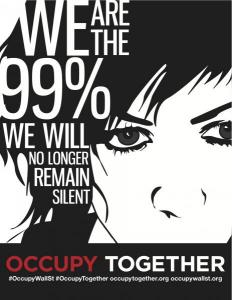
The 1980's popularization of the computer and the birth of the Internet was a quantum shift in communication and an evolutionary step for human society. The Digital Revolution marked the latest stage of the information age. People in distant parts of the world now connect instantly and information flow has shrunk the world. One of the biggest changes recently is the interconnected immediacy of social networking. This is a communication revolution in itself.
The word revolution has roughly three different meanings. The first is political, signifying fundamental change in political institutions, such as the overthrow of a government and replacement with another form. The second describes a fundamental change in technology or society in general, such as the Industrial Revolution. The Digital Revolution brought a shift in how we communicate as well as a sea change in a vast array of technology. And lastly in astronomy, revolution is the orbiting of one heavenly body around another.
Until recently, the Digital Revolution has not been fundamentally linked to serious political change. Yet, it created the foundation for the ubiquitous social media that is now being linked with political revolution on a global scale.
The first signs were the rise of online journalism, where bloggers and crowd-sourcers worked to fill the slack of mainstream media, much of which has been controlled through moneyed interests. In addition, the popularity of social websites like twitter and You Tube has contributed to the eventual decline of many traditional newspapers and TV news. The new digital press is more and more running roughshod over the old printing press, it is gradually replacing much of the existing system of journalism which often filtered and slanted perception toward particular commercial interests.
The people's uprisings in the Middle East marked the maturation of this digital revolution where it merged with a new current of human passion. In Egypt, we saw social media playing a vital rolein people assembling and taking action at Tahrir Square to throw off the Mubarak regime.
Social media facilitated uprisings are spreading, as in China, where active mobilization toward freedom is on the rise. The effect of social media in the arena of social and political empowerment is becoming undeniable.
How has this move toward social revolution come about? One answer is in the inherently democratic and immediately egalitarian nature of digital communication.
"The internet is direct democracy", Anthropologist, Paul Jorion's statement might have captured a glimpse of a possible future society. Jorion noted that with the Internet, "there's no hierarchy and everyone can express themselves".
Although inequality of access to this technology is a problem, the Internet has opened the door to an incredibly fast changing and relatively unmediated world. The Internet is borderless. It can take one to virtually any corner of any street. The world has become literally a click away. People who go online can have direct communication with those in other countries through social networking on platforms such as Facebook and Internet Relay Chat. This relates a person immediately to events happening around the world and to masses of like-minded people.
WikiLeaks Winter
I think the politicization of the youth connected to internet is the most significant thing that happened in the world since the 1960s. This is something new, a real revolution- Julian Assange
The first ones to pioneer this unknown new land on the web were hackers and programmers. They have blazed through a wild cyberspace, not bound in the same way by the laws and traditions of society.
Through the wild currents of net-neutrality, the fresh thoughts and ideas of people that are exiled from the mainstream find refuge in offshore digital asylums. In this domain, one can explore and carve out a different identity. In relative anonymity, one with technical savvy can connect, travel and embody wishes and ideals via digitized avatars and move freely beyond prescribed societal roles. Despite increasing Internet surveillance and censorship, many still feel safer finding like-minded people online to share their grievances toward government than through traditional structures.
WikiLeaks put its roots down on this new neutral infrastructure as the first stateless whistle-blower publisher that exists only on the internet. By revealing government and corporate abuse, this organization has inspired people world over to unite in a struggle for justice.
Long before the uprisings in the Arab world, the seeds of revolution have been growing underground. WikiLeaks arose in the winter before the Arab Spring. After a long political chill, it welcomed whistle-blowers and kept that torch of justice burning. For many, alleged whistle-blower Bradley Manning and WikiLeaks founder Julian Assange became global symbols of a new era, modeling courage, idealism and a commitment to justice, especially for the younger generations. These two were recently nominated for the Nobel Peace Prize and won it hands-down in popular polls. Despite the US government's war on whistle-blowers, all around the world the trend of dissent and willingness to speak out against corruption is growing.
Another crucial component of the WikiLeaks Winter was the leaderless group Anonymous. Following WikiLeaks's lead, the online collective came on the scene to stake a strong claim in this growing stateless web culture. Ethical hackers and information activists showed how it is possible to move freely online by breaking down firewalls, collectively sitting in with DDoS (Distributed Denial of Service) attacks and defacing websites of corporations and corrupt government institutions. All this empowered ordinary people by showing that it is possible to effectively challenge old power structures.
From the Arab Spring to the American Fall
All civilization has from time to time become a thin crust over a volcano of revolution. - Henry Ellis
2011 has become the year of revolution. The seeds of a global uprising that sprouted in the Arab spring blossomed into the European summer, and now with OccupyWallStreet it has entered a new season in the American Fall. In the light of the law of empires, some see the dual meaning of the word 'fall' as prescient.
In this online era, resistance within a particular country and community immediately gains global support. In late August, something was in the air. Just prior to the explosion of OccupyWallStreet, the online global collective Anonymous launched OpBART against the Bay Area Rapid Transit police for their repeated pattern of brutality.
With quick mobilization through the web, what started out as a distinctly local effort quickly got international attention, partly because of the mysterious international allure of Anonymous and the highly charged and sensitive digital atmosphere. Interactive Twitter feeds across oceans brought waves of the hashtag #MuBARTek, uniting Egyptians and San Franciscans in global solidarity against censorship and abuse of power. It was small, but was a shot across the bow just as the 99% movement was finding its spark.
The OccupyWallStreet movement that is now exploding across the world follows the revolving seasons of year-round Internet revolution. "OccupyWallStreet is a hashtag revolt," wrote Jeff Jarvis , a professor at City University; "A hashtag has no owner, no hierarchy, no canon or credo. It is a blank slate onto which anyone may impose his or her frustrations, complaints, demands, wishes, or principles."
The Twitter connected and bred action OccupyWallStreet was at first a group of committed individuals who gathered to camp out in the Financial District. People in a half dozen European cities: London, Valencia, Milan and Amsterdam soon joined in the operation.
Egyptian activist Mohammed Ezzeldin came to NY to join in solidarity with Occupy Wall Street. Acknowledging the connection between this and the protests against Mubarak and other despots he said:
I am coming from there -- from the Arab Spring. From the Arab Spring to the fall of Wall Street .... From Liberation Square to Washington Square, to the fall of Wall Street and market domination and capitalist domination.
Live tweets circulating from the ground as the rally moved downtown were mirrored in cyberspace. From lower Manhattan to Union Square, eyes behind the screen crossed borders and followed the crowd through the streets of New York. Verve and passion were spreadingacross the globe. Occupy movements started to pop up in various cities in the US and overseas. On Oct 15 global day of rage, people around the world raised their voices in solidarity.
This 24 hour Internet Revolution never sleeps. Through IRC and Twitter, people around the world communicate with one another, taking turns to pass the baton in a relay of revolution. What's behind this impulse?
2.0 Open Society
We ARE the Internet. You are actually dealing with a collective mind. Controlled by individuals and yet you don't understand what it means. - @AnonymousIRC
What is striking is how this Internet-enabled revolution is different than traditional protests. It is a reality online as much as in physical space. What happens across the computer and I-phone screens is the tip of the iceberg of a massive movement. Like waves of unknown faces behind Guy Fawkes masks, the underground culture moves as a mysterious tide.
One thing that is unique about online culture is the relative anonymity that comes with the territory of the Internet. By crossing computer screens, people can leave their traditional social identities behind. They become relatively free from the underlying oppressive force of hierarchy based on gender, class and race. This 2.0 open society on the web levels the playing field, distributing the power to people, regardless of political or social standing. With an evolving digital dialogue, a common universal language of justice and fairness can flourish in this online culture. It naturally enables the users to exercise a kind of egalitarian democracy. Many IRC chats have created a Quaker-style dialogue, where the conversation is moderated to check the balance of power and make sure each person has an equal share in the dialogue. In this, values held by many indigenous cultures such as collaboration and sharing are finding a new place, counteracting the pitfalls of a domination and exploitation mentality common to Western civilization.
Learning through the inherently democratic nature of the Internet, the younger generation has been experiencing first hand this new approach to democracy. Yet, outside the screen, democracy has become a myth. Everyday life is now shaped by corporate values of hierarchy, efficiency and profits at any cost. Most political systems have also been taken over by this. A cognitive dissonance is growing between apparent powerlessness over the course of their lives in the outer world and relative freedom on line. People have been living double lives, as in the movie The Matrix, where Neo asks the question, "What is real?". Now ideals that have been submerged for too long are coming to the surface. It is this global culture that is growing online, that comes into opposition with the Wall Street world. The revolutions spreading around the world are simply a testimony of those who say no to this unjust reality and see the borders dissolving all around them.
#OWS participants realized that the online and offline worlds aren't separate after all. Now the underground current is bursting into mainstream consciousness. - @virtadpt The Doctor
The egalitarian use of the Internet is now being translated onto the streets. This movement is bringing back unmediated oral traditions. With open mic and general assembly call and response, people practice face-to- face active listening and a new way of speaking together. Levi Asher shared her first hand experience of the people's mic.
It's called "the People's mic", and it's designed to allow a large group to hold an assembly in the middle of a noisy city without speakers or amplification. One of the facilitators explained it to the crowd: first, a speaker says a few words in a normal voice, no more than half a sentence at a time. The speaker will then pause while many people sitting nearby will repeat the same words together loudly, thus amplifying the speaker.
People are saying we don't need amplifier. The echoing diffuses power from would be leaders and responsibility is shared by all.
Action in the streets reveal what has been incubating beneath the surface. Ideals, compassion, and creativity are the insurgent forces battling against the one-sided development of corporate culture. Naomi Klein remarked how she was moved by a sign at OccupyWallStreet saying "we care about you". Values traditionally held as a province of religious faiths are now finding their way into revolutionary action.
With the insurgency of these diverse ideals rising from the underground onto the streets, the online network Anonymous has become an Icon of Internet activist culture. In The Real Role of Anonymous in Occupy Wall Street, Sean Captain noted that there weren't many people wearing masks and those who claim to be associated with Anonymous at the actual site. He described how the role of an online collective lies in its power to affect mass media and raise awareness about the movement.
"Beneath this mask there is more than flesh. Beneath this mask there is an idea, ... and ideas are bulletproof."(V for Vendetta). The absence of GuyFawks masks at the protests does not mean their absence in the movement. Ideals behind the mask find their way into the 99% tumblr, and from there going viral. These are ideals that cannot be killed or arrested. They survive through the harsh winter of political persecution without being captured by religion, nationality or ideology. They continue to grow like seeds of hope.
In a recent article on V for Vendetta masks, Rich Johnston, an animation commentator was quoted saying, "The film V for Vendetta ends with an image of a crowd of Londoners all wearing Guy Fawkes masks, unarmed and marching on Parliament. It is that image of collective identification and simultaneous anonymity that is appealing to Anonymous and other groups".
By blending into the collective of the 99%, people are perhaps becoming anonymous in a new way. In principle, everyone is Anonymous and everyone is the 99% if they but choose to recognize it. The story that each person brings is unique and individual, yet in the majority the stories are tied together with a common thread, forming a new sense of individuality, not in isolation but in relationship to others.
The Digital Revolution was initially a technological one. It is now being humanized by people re-birthing the old ideals of justice into a new era.
"The revolution will not be televised" said Gill Scott-Heron in 1970. Decades later with the spread of the Internet, "The revolution will be tweeted". Now people can see what's going on. So, what is next?
A Call for Direct Democracy
To petition an establishment is to deny that from us can come fresh political movements through which power is exercised. - @x7o
The New York Times article, As Scorn for Vote Grows, Protests Surge around Globe looked for the roots of people's uprisings around the world. It concluded that the global wave of revolution is a sign of a deep-seated distrust toward the system and that people are "taking to the streets, in part, because they have little faith in the ballot box."
"People realize that it's a show; it's a charade," author Lawrence Lessig echoes, adding "When you just look a little bit deeper, it's clear that what's driving both parties is whatever is the thing that's going to maximize the money." Through social media, people's voices are getting bolder in sharing their distrust of authority.
Imagine: Your citizens can think on their own now. Scary? Didn't expect it? Just pathetic. WE DO NOT BELIEVE YOUR LIES ANYMORE. - @AnonymousIRC
Independent journalist, Kevin Gosztola described how the OccupyWallStreet movement is challenging the rigged 'two party' political system. While the importance of Occupy Wall Street was dismissed and belittled in the media, labor unions quickly recognized its potential. On the second week, Wed Oct 5, they joined the activists for a march.
Recently, unions have lost power and become mostly window dressing for corporate structures and a prop for this semblance of democracy. After having so much of their power stripped away, Unions are joining the protesters and bypassing the traditional political system.
Is Occupy Wall Street calling for a direct democracy? People are now starting to challenge the notion of representative democracy when this has mostly become a system of moneyed interests corrupting elected politicians. At first the Mainstream Media criticized the lack of concrete demands of the occupiers and the lack of apparent leaders. Yet, many acknowledge that this is actually the strength of the movement. Out of what appears on the surface unformed and chaotic, consensus is gradually being built and because of the lack of hierarchy, decision-making processes become more democratic rather than top-down.
In essence, Occupy Wall Street is an experiment in direct democracy. In the conventional method of protest, people march for one day and put forward their demands. They then have no choice but to wait for politicians to deliver (which rarely happens). Before the invasion of Iraq in 2002, the global antiwar protest brought millions to the streets. Yet, they were ignored by the media and shut out by the government. The wars based on lies still continue. In contrast, Occupy Wall Street is not a one day event. When asked by the interviewer what he wants to see at the end of this occupation, the protester responded,"As far as seeing it end, I wouldn't like to see it end. I would like to see the conversation continue."
It is a new form of sit-in. Through encampment, people are starting to learn to live together, creating an alternative society. Leaderless movements encourage each person to become their own leader and really work with others. Decentralization means power is rendered by the people back into the hands of the individual.
Despite the media ridiculing occupiers, calling them hippies and trying to discredit them, it has been noted that the occupiers have been very articulate. The general public had been led to believe that they were not qualified to participate in democracy. Now it seems they are showing up ready to take matters into their own hands.
"One of the most abundant resources on earth is smart, creative, imaginative people," said one of the organizers;
and yet 99.9% of the power of the human race is not being marshaled right now except to find something to eat. So all we need to do is open up that spigot a little bit and we could come up with endless ways to create and produce and distribute. That's what these assembly movements are about: people sitting down and saying, here's how we can do this.
Ordinary people's efforts are dissolving walls, whether it is the facade of opposition of a two party system or hanging onto nationalism. The divide between rich and poor was put up to exclude and divide people. Now action on the streets are decolonizing the space that has long been occupied by what is symbolized by Wall Street. From the Berlin Wall to Tahrir Square, from Tienanmen to the Gaza Strip, the message is resounding across time: We will no longer tolerate walls that separates us. What is happening with this movement is the opening the space for a truly democratic dialogue. In the middle of seeming chaos and anarchy, an open space for imagination of the masses begins to move freely.
Ideals shared and acted on by the 99% are alive and constantly evolving, showing how democracy is a process, rather than an end-product of top-down decisions. Changes are already happening with an underlying shift in how we think about ourselves, our neighbors, and communities.
1st Amendment Right to Assemble includes AT NIGHT, or in INCLEMENT WEATHER. Tents are Human Right to shelter. - @ericverlo Eric Verlo
Encampment in public space and communal living make one rethink the more rigid ways of seeing the Western notion of property and profit driven values. On the ground of Occupy Wall Street, people are learning how to govern themselves. They are collaborating with teach-ins, cooking, and citizen's media, creating a micro-cosmos of a society that can grow into the future.
Seasons Come Full Circle
Plant forms from previous worlds are beginning to spring up as seeds. This could start a new study of botany if people are wise enough to read them. The same kinds of seeds are being planted in the sky as stars. The same kinds of seeds are being planted in our hearts. All these are the same, depending how you look at them. That is what makes the Emergence to the next, Fifth World. - Hopi Prophecy
From the WikiLeaks Winter to the Arab Spring, from European Summer to the American Fall, seeds that were planted are blossoming and the season is coming full circle. With the spread of revolution people gain new political power. This is shaking the ground of the prevailing exploitative financial system that is teetering on the edge of collapse. Now, on the edge of cyberspace and the streets, a new horizon emerges.
Breaking the exclusive hierarchy that divides and subjugates, the 99% is creating global solidarity across political and national lines. They are becoming a circle that invites those who have been historically excluded. People gather against monopoly of seeds by Monsanto, addressing environmental issues, racism, and gender inequality, unemployment and fighting to end the wars. Connected by the Internet, people round the globe are demanding: Off with the heads of illegitimate corporate person-hood. The movement continues, growing in momentum. First the Declaration of the Occupation of New York City, then going viral across the nation and the world.
The Occupy Movement is the first Internet Revolution. It is a new form conduced by people birthing higher ideals through technology in a creative way. Yet, at the same time it indicates a quantum shift in communication, economics and social development.
The Internet Revolution is also an inner revolution, awakening courage for each to recognize the inner-network that ties us together. The First Nations understood our mutual responsibility for living in harmony through these delicate threads of interconnectedness. Those cultures cherished collaboration, respect for the environment and a different sense of ownership than the Western notion of exclusive property rights. This is an intricate connection that the corporate culture systematically denies and seeks to destroy. Upon this foundation of shared ground, a new identity can be born. The collective of individual consciousness is the 99%, "the We the People" who are meant to uphold the higher law of the land.
Revolution has another meaning. It is the orbiting of one heavenly body around another. Revolution means to bring something back around to a state of harmony, to a natural path guided by the laws of the universe. Every single moment of life is indeed revolutionary, just as this planet goes around its orbit every minute, every second.
In a sense, revolution is not radical as it is often portrayed. Thomas Jefferson wrote in the Declaration of Independence "... Whenever any Form of Government becomes destructive of these ends, it is the Right of the People to alter or to abolish it, and to institute new Government..." When human society gets out of the path of harmony and just relation, it is our responsibility to revolt, to bring it back to its rightful orbit by revolutionizing our ways of thinking and being together.
The Internet Revolution is a call for a Global Citizen movement to create a future that honors and sustains this intricate interdependence. We are now here to respond to that call.
2011-10-25 Six years after Subic rape incident, still no closure on VFA controversy
The October 26 visit to the Philippines of US Assistant Secretary of State for East Asia and the Pacific Kurt Campbell should be viewed as significant, coming as it is 6 years after the Subic rape incident involving four US Marines and a Filipina. Of course the US would now argue that no rape ever took place and proof of this was the acquittal of the principal accused, Lance Corporal Daniel Smith, by an appeals court which reversed an earlier conviction by a lower court. The acquittal of course was surrounded by questionable circumstances.
But beyond the verdict of the courts, what the Subic rape incident did was expose the lopsidedness of the RP-US Visiting Forces Agreement. The VFA, which was ratified by the Philippine Senate in 1999 (but not by the US Senate), sets the legal framework for the treatment of visiting US troops.
On November 1, 2005, a Filipina was allegedly raped inside a van and then left half-naked on the sidewalk in the former Subic US military base. Four visiting American soldiers were arrested. Their defense: only one of them engaged in consensual sex with the victim. The victim meanwhile said she was intoxicated and tried to resist the sexual advances of Smith. The other US soldiers cheered as the rape took place.
The Subic rape case triggered a controversial custody issue involving Smith, the US embassy and the Philippine government. While a Philippine court took jurisdiction over the rape case, Smith and his co-accused Staff Sergeant Chad Carpentier, Lance Corporal Keith Silkwood, and Lance Corporal Dominic Duplantis were placed under the custody of the US embassy in Manila because this was what the VFA supposedly mandated.
When a guilty verdict was issued by a Regional Trial Court, Smith was handed a life sentence and ordered detained at the Makati City Jail. His three other co-accused were acquitted and were immediately spirited out of the country back to Okinawa.
Wikileaks cables showed that the US embassy protested Smith’s detention in a Philippine jail and put considerable pressure on the Philippine government to get Smith back in US custody pending the appeal of his case.
In a cable dated December 4, 2006 (06MANILA4880), Kenney said that she and the Deputy Chief of Mission “protested vigorously to senior GRP officials over Smith's detention in Philippine custody.”
“In recent days and weeks, Ambassador and senior Embassy officials had underscored to senior Philippine government officials that, in the event of any convictions, the U.S. would retain custody, as provided by the VFA, until the end of all judicial proceedings, including appeals. We have urged that Smith's defense attorney, as well as the Philippine Department of Justice, immediately file a new motion for reconsideration of the custody issue (as well as on the verdict itself),” Kenney reported.
The US protests seemed effective since Kenney reported that “Philippine Cabinet officials are conferring with President Arroyo to seek a way out of the impasse over custody triggered by Judge Pozon's order. The Secretary of Justice and the Department of Foreign Affairs have released statements supporting the view that Smith should be in U.S. custody during his appeal, according to VFA”.
The US embassy and the Philippine’s DFA reached an agreement to transfer Smith back to the US embassy just a few days after his detention at the Philippine jail. The transfer sparked protests from cause-oriented groups and lawmakers. This served as a cause of action for various groups to go the Philippine Supreme Court and ask for the nullification of the VFA.
The Supreme Court, voting 9-4, upheld the constitutionality of the VFA but would go on to say that the transfer of Smith was not in accord with the VFA. The court ordered the transfer of Smith to a Philippine facility after negotiations between the US and Philippine governments. The court did not specify the timeframe of the transfer. This gave the Philippine government and Smith’s lawyers time to appeal the SC decision.
It was during this period that Smith’s appeal on his rape case with the Philippine Court of Appeals was decided. Smith was acquitted, thus making the issue of his custody moot and academic. Smith was immediately flown out of the Philippines by the US government. The acquittal was met with protests and criticism from various sectors.
VFA custody provisions remain unresolved
The Wikileaks cables clearly show that there were problems in the custody provisions of the VFA. In one embassy cable dated April 27, 2009 (09MANILA903), after the acquittal of Smith, US ambassador Kristie Kenney admitted that custody provisions of the VFA were ambiguous and that clarifications had to be made.
“Given ambiguity in the VFA about both where custody lies following initial conviction of U.S. servicemen and detention facilities where they should be held, we believe it is important that we begin discussions on how we clarify these undesignated requirements and whether there is a more workable, less debilitating, custody process,” Kenney said
And for all its insistence of keeping custody of Smith, the US embassy admitted that it was not capable of serving as a detention facility.
“The last three-and-a-half years have clearly demonstrated that U.S. Chancery grounds are not appropriate detention facilities to hold such servicemen in custody, not least because Mission personnel have neither the resources nor expertise to serve as jailors. We believe that the unusual situation of having a diplomatic facility as a place for detention should be clarified in future discussions with the Philippine government,” Kenney said in the confidential cable.
In the same cable, then Foreign Affairs Secretary Alberto Romulo told Kenney “that he was pleased with the outcome of the case, attributing the success on the excellent collaboration the Philippine government had enjoyed with the Embassy”.
Romulo said that “with several thousand U.S. servicemen currently in the Philippines for the Balikatan bilateral (military) exercises, it was imperative that both sides completely followed the letter of the VFA”.
In another cable dated September 18, 2009 (09MANILA2000), Kenney again admitted problems with the VFA but cautioned against renegotiation.
“Post would welcome a review by US Government lawyers to determine the best approach we can take to clarify the custody provisions. Following such a review, Mission would aim to establish this clarification through quiet discussions that would allow us to reach a common understanding with the Philippine government without the need to formally renegotiate the entire VFA,” Kenney said.
During the 2010 presidential campaign, President Benigno Aquino III promised to review the provisions of the VFA in relation to the custody of erring US troops because of the problems encountered in the Subic rape case. A review panel involving the Office of the Executive Secretary, Department of Justice and the DFA was formed but no results have been released. ###
Other links:
http://www.gmanews.tv/story/153081/Subic-Rape-Case-Timeline
2011-10-25 Thoughts on revolution from Take the Square, WL Central and a member of US Day of Rage (AUDIO)
Listen to the conversation here
Speakers in order of appearance:
-
Heather Marsh. As Georgie she has been writing about the revolution since before the beginning, starting with A Stateless War in September 2010. As editor/administrator of WL Central, she has created a community for activists around the world to provide a new hard news organization, covering only the news people require in order to govern themselves and working towards the Wikileaks model of scientific journalism. This is an ongoing project that is about to get a lot bigger, building off of everything learned in the last year.
A Canadian activist, she created Take the Square Canada and works with activists around the world to encourage and facilitate connection and communication for the revolution, both in Canada and around the world. She has been active in human rights and freedom of information for years.
Alexa O'Brien. In February of this year she founded usdayofrage.org, where alongside her friends, she pushed the edge of digital social media for scalable organization of civil disobedience and non-violent protest. usdayofrage.org was instrumental in the traditional and digital organization of the original September 17 action in 5 American cities, including Austin, San Francisco, Los Angeles, Seattle, Oregon, and New York, and built trusted networks that spread #occupywallstreet virally across the United States.
Since January 2011, she has covered the WikiLeaks release of US State Department Cables, JTTF memoranda known as the ‘GTMO files’, and revolutions across Egypt, Bahrain, Iran, and Yemen. She has interviewed preeminent US foreign policy expert on the Cambodia cables, and published hours of interview with former GTMO guards, detainees, defense lawyers, and human rights activists, as well as WikiLeaks media partners, including Andy Worthington, GTMO historian and author, and Atanas Tchobanov, Balkanleaks' spokesman and co-editor of Bivol.bg.
Pedro Noel and Santiago Carrion Writers and activists currently participating in various online and offline projects. Their main focus of work has been the coverage of human rights, corporate abuse and transparency issues born from the Wikileaks releases, including the Arab Spring and it's spread to Europe.
Since they are currently based in Madrid, Spain, they became actively engaged in the peaceful uprising that took place on the 15th of May. They did this not only by providing first-hand information and analysis in English, concieved for an international audience, but also by organizing and spreading tools for communication between occupations and assemblies. Recently they have participated in the organization of the Takethesquare.net infrastructure for camp communication, as well as on the task-force for the 15october.net global protest
2011-10-27 Trouble at the Hard Block Cafe - Day 26 @ #OccupyLA
Let me say at the outset that from what I have seen of the occupation movement, it has becomes so dynamic, so energized and been met with such wide support among the people that nothing can defeat it if it doesn't defeat itself.
However I fear that it is on the verge of doing just that. There is big trouble in the Hard Block Cafe!
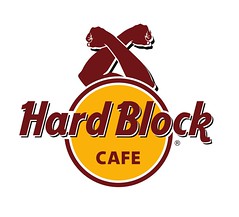 The Occupy Los Angeles General Assembly split into dueling factions Wednesday evening as a large number of occupiers who felt alienated by the highly structured, long and boring, but largely irrelevant GA , came in and took over the mike, overthrew the process, and made it an open mike session. The GA had been led by a facilitation committee that was far more concerned with process than content. This is a facilitation committee lead by a new core group. The original core group of facilitators that used the process to create Occupy Los Angeles have moved on to other areas. This may be "billed" as a leaderless movement but not only is there something to be said for leadership, there are a lot of advantages to consistent leadership, IMHO.
The Occupy Los Angeles General Assembly split into dueling factions Wednesday evening as a large number of occupiers who felt alienated by the highly structured, long and boring, but largely irrelevant GA , came in and took over the mike, overthrew the process, and made it an open mike session. The GA had been led by a facilitation committee that was far more concerned with process than content. This is a facilitation committee lead by a new core group. The original core group of facilitators that used the process to create Occupy Los Angeles have moved on to other areas. This may be "billed" as a leaderless movement but not only is there something to be said for leadership, there are a lot of advantages to consistent leadership, IMHO.
The original Wednesday GA started on the south side of city hall with the solar stage. After it was overthrown, the facilitators, for a while, reconvened their GA on north stairs before returning to the open mike crowd on the south stairs in the spirit of unity.
That there was a split at all is a sign of the deep divisions and serious problems that have cropped up at Occupy Los Angeles. About the same time this was going on, diagonally across First & Main from city hall in the LA Times building, they were posting this to their website:
Even in Los Angeles, where city leaders have greeted the demonstrators warmly, there are signs of protest fatigue and increasing anxiety about what happens next.
Los Angeles Mayor Antonio Villaraigosa, who earlier this month had ponchos distributed to rain-soaked Occupy L.A. protesters, said Wednesday that the encampment next to City Hall "cannot continue indefinitely."
Villaraigosa has instructed city officials to draft a plan for another location for the demonstration. He decided the camp could not stay after Los Angeles County health inspectors expressed worries about the cleanliness of the camp, and because of concerns about the condition of the lawn and trees.

After seeing the occupation grow to fill every green space around city hall as it approaches its one month anniversary, it is not surprising that the city and police are starting to look for reasons to evict the occupiers. That is not a problem. That is expected behavior. The problem is that more recently Occupy Los Angeles has allowed some real substance to creep into those charges and that endangers the public supports that are the barricades of this occupation.
In an occupation, a group holds a space against an opposing force. Militarily speaking, the LAPD is a thousand times stronger than the protesters but this is not a military occupation. This is a non-violence occupation and it draws its strength from its moral authority and its public support. If it allows those pillars to be undermined, the occupation may be fatally weakened.
Since it was established almost a month ago, the peace and publicity that have been created around Occupy Los Angeles has allowed it to attract a much wider audience than the activists that originally started it. Many are becoming politically active for the first time and most have contributed positively to the movement. But not all. Some have been attracted by the music, free food and festival atmosphere that has accompanied an encampment that hasn't felt the need to gird itself for a police attack.
The problems that have developed in the past week include intimidation of women and others, drug and alcohol use, stealing, defecating in inappropriate places and making noise late at night. These rogue elements have been allowed a free reign because many of the occupiers don't believe in any rules or form of government and they don't believe in excluding anybody that is part of the 99%. Added to that is the consensus model decision making process where a single "hard block" can veto a decision.
Occupy LA has also become the home of a strong party element that likes to play music and drums at all hours. Many of these occupiers aren't involved with the committees or other work of the occupation and less than half of the occupiers have been attending the general assembles. Part of the reason for that is the GA has failed to address the main problems facing the community.
For example, the major discussion of the GA on Tuesday evening was an individual's proposal that Occupy LA reject work with the major political parties, a proposal that had already been discussed at three previous GA's. It is still not clear whether the point of that resolution is to make PDA or Ron Paul supporters feel unwelcome or to stake out a position in preparation for the next election, but that discussion went on for more than an hour, and the very serious problems Occupy LA now faces, and threaten it's very existence, were hardly mentioned. Neither were the events in Oakland that should serve as a reality check for those on the LA facilitation committee that have spent hours debating whether to allow three days to resolve a hard block, or four.
The police took down Occupy Oakland Tuesday morning in a very brutal fashion. Hundreds of cops came in riot gear gear at 5am using tear gas and stun grenades, torn down the tents and arrested 85 occupiers. Wednesday, while the Los Angeles general assembly was dividing in two, Oakland occupiers were again being arrested. In Oakland, they are also using "safety and sanitation" as an excuse to end the occupation. Three hours after they raided the encampment, Oakland Mayor Jean Quan issued this statement:
Many Oaklanders support the goals of the national Occupy Wall Street movement. We maintained daily communication with the protesters in Oakland.
However, over the last week it was apparent that neither the demonstrators nor the City could maintain safe or sanitary conditions, or control the ongoing vandalism. Frank Ogawa Plaza will continue to be open as a free speech area from 6 am to 10 pm.
I don't know if there is any substance to the complaint that "neither the demonstrators nor the City could maintain safe or sanitary conditions." I am not in Oakland nor have I been paying attention. If there was some substance to them, then the demonstrators themselves have given the city the opportunity, no more, the obligation, to take back control of the space.
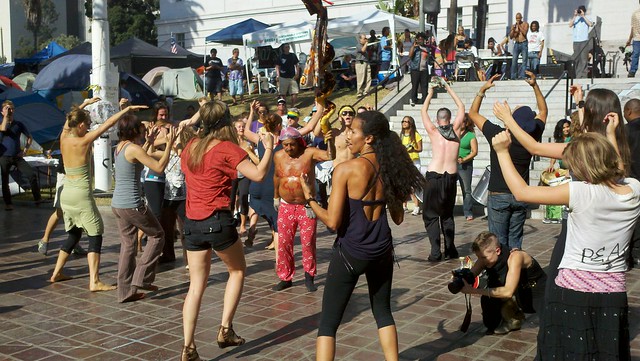
I am in Los Angeles and I do know that the problem of "maintaining safe and sanitary conditions", along with problems associated with drug and alcohol use and excessive noise are gnawing problems for Occupy Los Angeles. If they are not controlled by the occupiers, the city council will come to regret their resolution of support, the LAPD will revert back to normal form as they gear up to clear the grounds around city hall, and the Committee to End Police Brutality at Occupy LA will get what they have longed for from the very beginning but so far have lacked, a real justification for their name.
Some activist from Occupy LA don't believe in any rules at all. They respect neither city laws nor the consensus of Occupy Los Angeles as expressed by the general assembly. They are completely opposed to getting permits and even talking to the police. Some of their views are expressed on the website Unpermitted LA. There they complain about "the leadership of Occupy LA, especially concerning their collaboration with police" and similar concerns.
They also call for the "Immediate dissolution of the Security Committee and recall of the current Police Liaisons." They see the Security Committee as acting as the police for Occupy LA and extensions of the LAPD, saying "The police liaisons currently are acting in the interests of the police rather than the movement and are not acting transparently." They cite an example "in one instance [security] went into the tents of comrades who intended to defy police and SC orders to move to the sidewalk, without their consent."
This refers to what happened the very first night of Occupy Los Angeles on October 1st. The deal we had then negotiated with the LAPD and the GSPD, that controls the ground around city hall, was that we would not be arrested for being on the grass till 10:30pm but between then and 5am or so, we would have to move to the sidewalk or face sprinklers and arrest.
That first night we had a limited number of tents, maybe 60, so a hundred or so campers staying overnight. I argued, as did others, that it was important that we comply with the police order at that time, not as a matter of principle but as a matter of tactics. I said that when we had a thousand occupiers here, we could refuse to move the tents off the grass and make it stick, but if we refused to move them that first night, well, the morning news would have been all about the arrests, and possibly violence, and that would be a big set back.
It's been almost two weeks now that we stopped moving the tents off the grass, just about the time the number of tents pasted two hundred, although the official police stance on this has not changed. During the second week of Occupy Los Angeles, the city council pasted a formal resolution of support, a very rare thing among the occupations. We have gone more than three weeks with no arrests at Occupy LA and no real problems about tents on the grass 24/7 except for the growing mummers above the costs of resowing the lawn.
All of this has allowing for the tremendous growth and growing regional influence of Occupy Los Angeles but I believe all of this would have been jeopardize had protesters stayed on the grass that first night. I argued that we weren't here to protest park hours. We had bigger fish to fry. Fortunately the general assembly supported that view on the first night and the decision was made that we should end the meeting and move to the sidewalk by 10:30pm.
However some individual anarchists disagreed and having failed to win the GA to their position, decided they would go rogue and defy everybody and keep their tents on the grass anyway. They stood on their individual "right" to refuse all governess and do whatever they could get away with. They were itching for confrontation with police and didn't mind destroying Occupy LA to get it.
Whether these anarchist elements admit it or not, their views have come to support these rogue and party people that threat much of what has been accomplished so far. The fatal problem for the occupy movement is the view that no one can be excluded, even people who don't agree to follow the rules.
If the main functional demand of the occupy movement is seen as the "right" to create lawless spaces in our cities, then they will lose most popular support and then they will be rolled up.
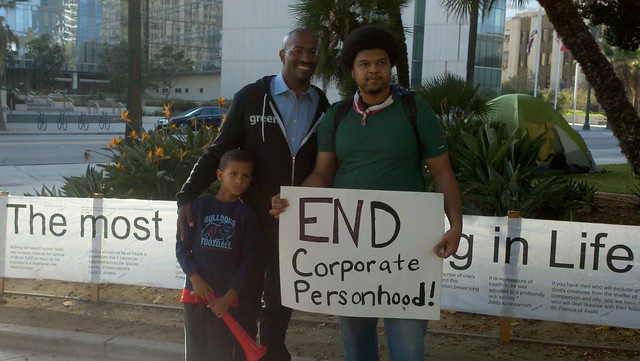
On Sunday this email was forwarded to the Occupy LA facilitation committee together with the note above it by a supportive neighbor:
FYI NEIGHBORS COMPLAINING ABOUT NOISE FROM THE SOUTH LAWN
This email was posted to the Higgins Building (Second & Main) list serve today, and I wanted to make you guys aware of it. We live on the south side of the building, so don't hear the stage from our unit, but others might and might call, as suggested.
Curious as to whether it is true that the amplified stage is "rogue," and whether there is any way to control the level of sound so that it is more resident-friendly.
Thanks for all that you are doing for all of us.
Subject: [higginsbuilding] Noise 411 of Occupy (but not Occupy - more the Solar Stage)
Hey all - I know no one wants to be like "omg Occupy noise indefinitely?"
Welp - I am and have learned a new thing through my research and talking to folks.
There is a solar powered stage, the "noise/trouble makers" of Occupy - who Occupy LA actually do not align themselves with. And there apparently is tension and controversy about this rouge illegal stage.I've asked both Occupy and the Solar Stage to move thier stuff to Temple St.. OLA complied but Solar Stage has met with illogical and militant resistance.
#1 it is illegal for any loud PA much less music and yelling over speakers - or even without a speaker system.
#2 The Solar Stage are doing a disservice to the actual movement.
So let's do this. Call the non-emergency number 877 275-5273 and tell them you are tired of hearing the Solar Panel "Power of Green LA" stage all day and night. Tell them it's a stage that Occupy has - in print - disassociated itself from. Tell them you know full well that their noise is against several city ordinances and that (whether you either support, or don't support the protest) - that Solar Power stage is illegal and a hostile stage and really needs to move to Temple St. or just get shut down.
More power in numbers folks. Whether you support or don't support what's going on across the street. The OLA group wants to be good neighbors and are unable to deal with some pinkertons in their camp who don't want to be good neighbors.
Occupy Los Angeles can't govern itself, through the general assembly or any other process, whether based on consensus or not, as long it accepts people who refuse any government at all, even self-government. And if Occupy Los Angeles can't govern itself, it will be dissolved by the capitalist government just waiting it's chance to end our occupation of this space.
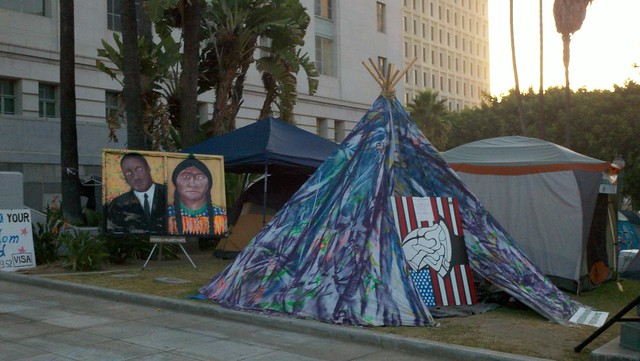
Occupy Wall Street faces a similar dilemma. They also have a problem with drummers. This is how Time described the Occupy Wall St. general assembly process in the critical hours before the police were expected to move on their encampment last week:
Ten hours before uniformed police officers had pledged to clear Zuccotti Park, Occupy Wall Street's home since its founding a few weeks ago, the demonstrators debated, discussed, voted on, blocked, formed consensus, blocked again, and then again formed consensus — about playing drums.
This, the night before what many thought would be a defining moment for Occupy Wall Street and the protesters' attempts at a modern-day revolution, and hours before the 7 a.m. NYPD mandate to wipe Zuccotti Park clean of the movement's tents and signs and its pamphlets and purple-arm-banded protesters. But for 45 minutes, the most important issue was a proposal to limit drum circles.
It seemed trivial. It seemed silly. It seemed like a waste of time, time that could be used to prepare for what seemed inevitable as the sun rose: mass arrests, chaos, possible violence, injuries. While the city eventually called off the “cleaning” early this morning, nobody knew that last night.
...
While discussion of the impending police action on the movement's unofficial home did take place, most of debate revolved around what seemed to be a crucial decision about drum circles, even though it wasn't clear they'd have anywhere to drum the following day. When I left, after the General Assembly was adjourned, it was still unclear when they were going to drum.
A few days ago it looked like this issue was about to put an end to Occupy Wall St. This was being circulated:
October 24, 2011
End of #OccupyWallStreet: conflict over drummers
this just in (from folks working with community relations):OWS is over after Tuesday:
Friends, mediation with the drummers has been called off. It has gone on for more than 2 weeks and it has reached a dead end. The drummers formed a working group called Pulse and agreed to 2 hrs/day at times during the mediation, and more recently that changed to 4 hrs/day. It's my feeling that we may have a fighting chance with the community board if we could indeed limit drumming and loud instrumentation to 12-2pm and 4-6pm, however that isn't what's happening.
Last night the drumming was near continuous until 10:30pm at night. Today it began again at 11am. The drummers are fighting amongst themselves, there is no cohesive group. There is one assemblage called Pulse that organized most of the drummers into a group and went to GA for formal recognition and with a proposal.
Unfortunately there is one individual who is NOT a drummer but who claims to speak for the drummers who has been a deeply disruptive force, attacking the drumming rep during the GA and derailing his proposal, disrupting the community board meeting, as well as the OWS community relations meeting. She has also created strife and divisions within the POC caucus, calling many members who are not 'on her side' "Uncle Tom", "the 1%", "Barbie" "not Palestinian enough" "Wall Street politicians" "not black enough" "sell-outs", etc. People have been documenting her disruptions, and her campaign of misinformation, and instigations. She also has a documented history online of defamatory, divisive and disruptive behavior within the LGBT (esp. transgender) communities. Her disruptions have made it hard to have constructive conversations and productive resolutions to conflicts in a variety of forums in the past several days.
At this point we have lost the support of allies in the Community Board, and the State Senator and city electeds who have been fighting the city to stave off our eviction, get us toilets, etc. On Tuesday is a Community Board vote, which will be packed with media cameras and community members with real grievances. We have sadly demonstrated to them that we are unable to collectively 1) keep our space and surrounding areas clean and sanitary, 2) keep the park safe, 3) deal with internal conflict and enforce the Good Neighbor Policy that was passed by the General Assembly.
Whether or not you personally feel that the support of the community board and local residents and their reps is needed to maintain our occupation, many of us believe that maintaining Liberty Square (aka Zuccotti Park) as a flagship and nerve center for our movement right now is in fact critical to our efforts that are much bigger picture, longer term, more revolutionary than the internal conflicts that are consuming too much energy right now.
We need to take this seriously, and be clear that if we can't deal with conflict and self-organizing then we are facing eviction very soon (this week), and the allies that helped turn out mass numbers at the last one will not be around this time, nor will the press be supportive. Additionally, Bloomberg released a statement a few days ago that said that he / the City plans to crack down on any violations as of this week. Once we lose community and ally support at Tuesday's vote, the door is wide open for an eviction.
What to do? We need an all hands-on-deck clean-up and everyone sharing responsibility for the Good Neighbor Policy, including enforcement of 12-2pm and 4-6pm drumming hours. (While recognizing that the community board has been firm that they can only support 2 hrs/day of drumming). We should also start serious conversations internally about what this movement might I look like without Zuccotti Park / Liberty Square. How can we set ourselves up for continued organizing and momentum without an active occupation? I don't write this to be dramatic, it's a serious question. If so much of our organizing time currently (for many of us, 20 hrs a day) is going to putting out fires and maintaining the space, what does it look like if we lose the space?
That same night the call went out "supporters needed at Zuccotti Park to enforce Good Neighbor Policy" saying they desperately needed people to come and help them stop the drummers. At the Occupy Wall St. general assembly that night, the group of drummer-protesters organized as Pulse agreed to limit their drumming to four hours a day. The community board had been asking for a two hour limit. On Wednesday night, an open conflict with the community board was adverted that might have given the NYPD the excuse they need, when the CB agreed to settle for the four hour limit.
The problem for Occupy Wall St. now is that many of the drummers are not with Pulse, don't come to GA's, and don't recognize any limits. If the occupations can't find better ways to control what is done under its banner, it they will meet with an untimely end.
However, there is reason for optimism. In L.A., a wonderful thing happen with the drummers Saturday night.
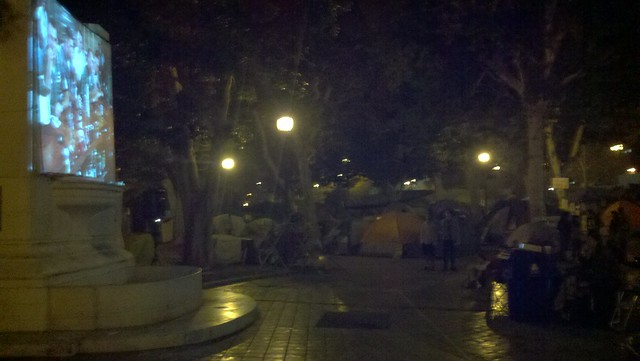
Friday night, when we showed the first film in our Occupy LA film series, the drummers were so loud it was hard to hear the movie. That, plus the fact that the GA ended so late, was the reason we put off showing my film Vietnam: American Holocaust, until Saturday after the GA.
Saturday the GA ended on time, but still there was the problem with the drummers so Tyrone had the movie volume turned up loud so that we could hear. Then the drummers seemed to get louder so Tyrone turned up the volume more. For a while it felt like a struggle between the movie and the drum circle which called into question the ability to even show films or do anything that required relative quiet.
Then about 30 minutes into the movie, the drum circle got quiet. They had moved down to the corner. As far as I know, nobody talked to them (from the movie), they just resolved the conflict by moving the drum circle. Obviously moving the movie would have been extremely difficult once it had already started.
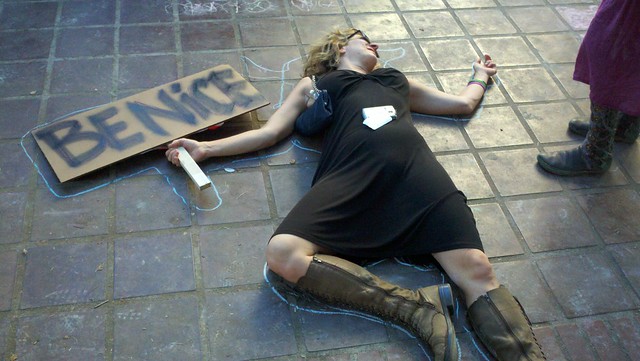
And in spite of these and other "growing pains," the occupation movement in Southern California continues to expand with OccupyUSC, Occupy LAUSD, Occupy Venice, Occupy Longbeach, Occupy Riverside, Occupy San Diego, Occupy Pasadena and Occupy OC all coming to life in the past few weeks.
2011-10-29 The Economics of Occupy Wall Street, Part II: Citizens United v. FEC
"I hope we shall ... crush in its birth the aristocracy of our moneyed corporations which dare already to challenge our government to trial and bid defiance to the laws of our country." -- Thomas Jefferson
Earlier this month, a group within the Occupy Wall Street movement (OWS) published a draft of the 99 Percent Declaration, which proposes solutions to economic inequality in the U.S. and announces a plan to organize a national convention to be held in Philadelphia on July 4, 2012. Still a work-in-progress, the Declaration calls for the election of delegates who would draft and vote on a non-partisan petition of grievances to be presented to the U.S. President, each member of Congress, the Supreme Court, and all federal candidates in the 2012 elections. If, warns the Declaration, the government does not act within one year to remedy its stated grievances, OWS will form a third political party to run in every Congressional seat in 2014 and 2016.
In addition to demands for reinstating the Glass-Steagall Act, freezing home foreclosures, recalling military personnel at all non-essential bases, eliminating corporate tax loopholes, and other provisions, the Declaration calls for an end to corporate personhood, particularly through "The immediate reversal, even if it requires a Constitutional Amendment, of the outrageous and anti-democratic holding in the Citizens United case by the Supreme Court, which equates the payment of money by corporations, wealthy individuals and unions to politicians with free speech."
The theory of corporate personhood stretches back more than 100 years. After the Civil War, the 14th Amendment to the U.S. Constitution and other laws were passed to protect the rights of newly-freed slaves. However, some interests that were heavily invested in the powerful railroad companies successfully used these civil rights measures to gain citizenship rights for corporations. One such alleged corporate activist was Supreme Court Justice Stephen Field. In his decisions, Field repeatedly stated that corporations were persons; he then cited to these earlier statements as precedents when ruling later that a railroad company, "being a corporation, a person within the meaning of the 14th Amendment," was "entitled, with respect to its property, to equal protection of the laws." In his dissenting opinion for the 1873 Slaughter-House Cases, Field characterized corporations as citizens with an inherent right to pursue their business interests. Some also attribute to Field's influence the fact that, in the 1886 case Santa Clara County v. Southern Pacific Railroad Co., a court reporter wrote in his summary of the decision that the railroad companies were persons protected by the 14th Amendment's equal protection provisions -- even though no such statement was actually contained within the case. Field later used this statement to aver, in a 1888 decision, that a "private corporation is included under the designation of 'person' in the Fourteenth Amendment to the Constitution of the United States, Section I."
Even during the early 20th century, however, the theory of corporate personhood was not without detractors. In 1938, for instance, Justice Hugo Black objected that the 14th Amendment was passed "to protect weak and helpless human beings," and that "the language of the amendment itself does not support the theory that it was passed for the benefit of corporations."
In 2008, the conservative nonprofit organization Citizens United wanted to air television commercials promoting its documentary Hillary: The Movie. The film criticized Hillary Clinton, who at that time was seeking the democratic primary nomination for U.S. President. But the Bipartisan Campaign Reform Act (BCRA), passed in 2002, prohibited corporations and unions from spending their general treasury funds on "electioneering communications" -- broadcasts that expressly refer to specific candidates for federal office within 30 days of a primary election. And for generations the Supreme Court had issued rulings, including McConnell v. FEC and Austin v. Michigan Chamber of Commerce, that specifically limited corporate political expenditures. In 2010, however, the Supreme Court, led by Chief Justice John Roberts, decided that these prior laws violated the right to free speech, which is guaranteed to all persons under the First Amendment to the Constitution.
Building on Justice Field's precedents establishing corporate personhood, the 5-4 decision in Citizens United v. Federal Election Commission overruled Austin, part of McConnell, and the BCRA. Though acknowledging that the prior laws were intended to prevent corporations from using their vast resources to obtain unfair political advantage, the majority nevertheless ruled that these laws discriminated against corporations; also pointing out that media companies consistently engage in political speech, the Court concluded that it was unfair to suppress the speech of other types of corporations, and that such restrictions could permit the suppression of political speech in television, books, and blogs.
Citizens United and the American Civil Liberties Union applauded the Supreme Court's decision. The Editorial Board of the San Antonio Express-News agreed with the Court that, "While the influence of money on the political process is troubling and sometimes corrupting, abridging political speech is the wrong way to counterbalance that influence.” But others, including President Barack Obama, reacted virulently to the Court's decision. Obama stated: "The Supreme Court has given a green light to a new stampede of special interest money in our politics ... It is a major victory for big oil, Wall Street banks, health insurance companies and the other powerful interests that marshal their power every day in Washington to drown out the voices of everyday Americans." Adding, "I can't think of anything more devastating to the public interest," the President further commented that "the Supreme Court reversed a century of law that ... will open the floodgates for special interests –- including foreign corporations –- to spend without limit in our elections. I don't think American elections should be bankrolled by America's most powerful interests, or worse, by foreign entities." He vowed to generate a "forceful bipartisan response" to the decision.
Obama was not alone in his denunciation. Senator Russ Feingold described the decision as "a terrible mistake ... the Supreme Court chose to roll back laws that have limited the role of corporate money in federal elections since Teddy Roosevelt was president." Author and Newsweek journalist Jonathan Alter called it the "most serious threat to American democracy in a generation." Both Representative Alan Grayson and former MSNBC commentator Keith Olbermann compared Citizens United to the infamous case Dred Scott v. Sandford, which in 1857 denied citizenship to blacks in the U.S. Constitutional law scholar Laurence H. Tribe opined, "Talking about a business corporation as merely another way that individuals might choose to organize their association with one another to pursue their common expressive aims ... obscures the very real injustice and distortion entailed in the phenomenon of some people using other people's money to support candidates they have made no decision to support, or to oppose candidates they have made no decision to oppose."
In response to the ruling, some proposed altering the laws to require shareholders to vote before a corporation could make a political expenditure. Others focused on passing campaign reform; Senator Dick Durbin, for instance, suggested implementing a public financing program for federal candidates that would provide $900,000 in public funds to any candidate who raised at least $50,000 in donations of $100 or less. Still other members of Congress, including Senator John Kerry and Representatives John Conyers, Donna Edwards, and Leonard Boswell have called for a constitutional amendment to overrule Citizens United. Grassroots U.S. groups such as Occupy Wall Street, Move to Amend, and other coalitions have echoed support for amending the U.S. Constitution to abolish corporate personhood. Such groups point out that their campaign has historical precedent: the 15th and 19th Amendments were enacted to reverse Supreme Court decisions that denied voting rights to blacks and women, respectively.
The U.S. Constitution provides that any amendment must achieve a two-thirds vote by Congress, then ratification by three-fourths of state conventions or legislatures. An Article V convention may, however, offer an alternative to congressional approval.
The OWS movement is requesting ideas from the public for inclusion in the 99 Percent Declaration.
2011-10-30 The value of street protests in the Occupy movement
Speakers in order of appearance:
-
Heather Marsh. As Georgie she has been writing about the revolution since before the beginning, starting with A Stateless War in September 2010. As editor/administrator of WL Central, she has created a community for activists around the world to provide a new hard news organization, covering only the news people require in order to govern themselves and working towards the Wikileaks model of scientific journalism. This is an ongoing project that is about to get a lot bigger, building off of everything learned in the last year.
A Canadian activist, she created Take the Square Canada and works with activists around the world to encourage and facilitate connection and communication for the revolution, both in Canada and around the world. She has been active in human rights and freedom of information for years.
Zak Yahya is a blogger at Lebanon Spring blog, where he writes about current affairs in Lebanon and Middle East. He writes in Wikileaks Central matters related to the Wikileaks cables, democracy and human rights issues. He focuses on the matters originating from the Levant - Lebanon, Syria, Israel, Palestine and Iran. You can contact him on the Lebanon Spring blog or on twitter @TheZako
Naomi Colvin is a UK activist with UK Friends of Bradley Manning and the Occupy London movement. . Her website is here.
Alexa O'Brien. In February of this year she founded usdayofrage.org, where alongside her friends, she pushed the edge of digital social media for scalable organization of civil disobedience and non-violent protest. usdayofrage.org was instrumental in the traditional and digital organization of the original September 17 action in 5 American cities, including Austin, San Francisco, Los Angeles, Seattle, Oregon, and New York, and built trusted networks that spread #occupywallstreet virally across the United States.
Since January 2011, she has covered the WikiLeaks release of US State Department Cables, JTTF memoranda known as the ‘GTMO files’, and revolutions across Egypt, Bahrain, Iran, and Yemen. She has interviewed preeminent US foreign policy expert on the Cambodia cables, and published hours of interview with former GTMO guards, detainees, defense lawyers, and human rights activists, as well as WikiLeaks media partners, including Andy Worthington, GTMO historian and author, and Atanas Tchobanov, Balkanleaks' spokesman and co-editor of Bivol.bg.
Listen to the conversation here.

